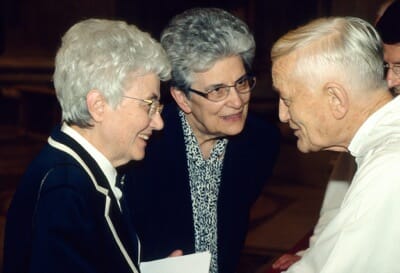
Centennial of Brother Roger Schutz

Chiara Lubich, Gabri Fallacara, Frère Roger Schutz (1978).

Chiara Lubich, Eli Folonari,


Chiara Lubich, Gabri Fallacara, Frère Roger Schutz (1978).

Chiara Lubich, Eli Folonari,
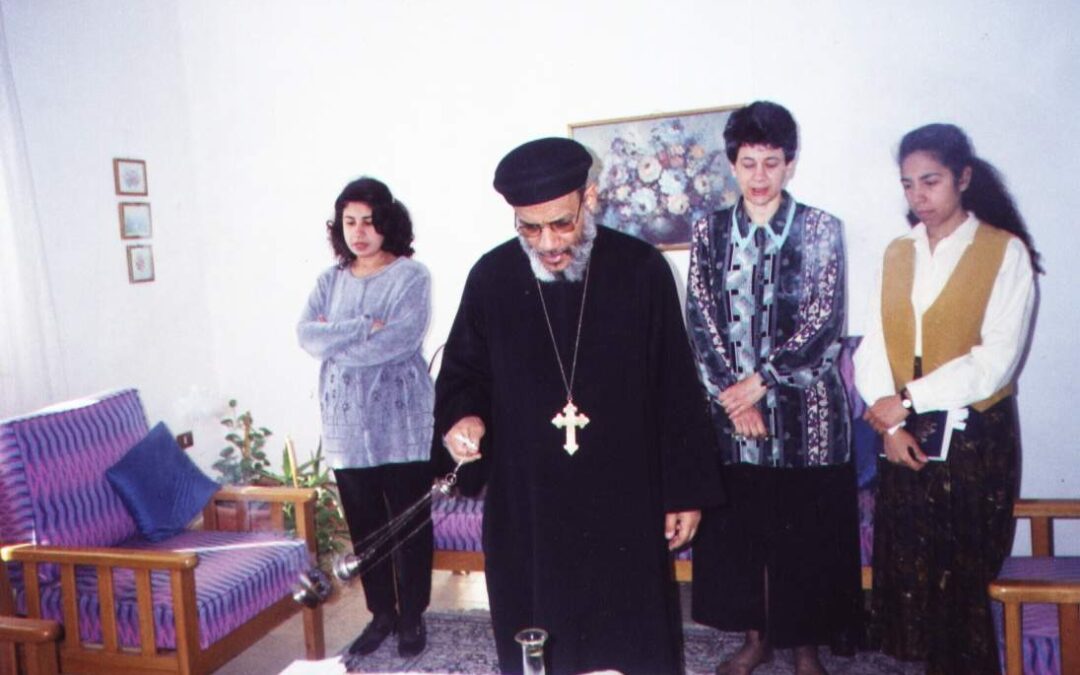
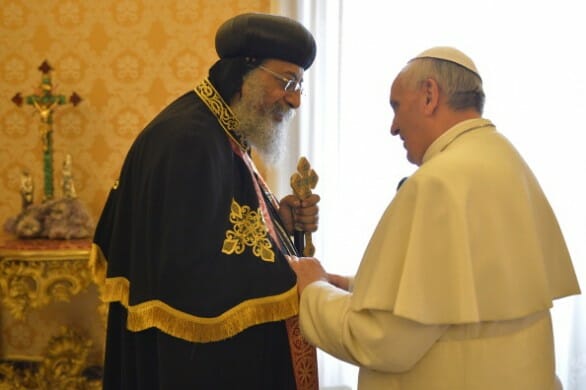 May 10, 2013. Pope Francis and Pope Tawadros II meet at the Vatican to remember the historic appointment that took place 40 years ealier between their predecessors, Pope Paul VI and Pope Shenouda III, and their Common Declaration on the one faith that is professed by churches with different traditions. During his remarks, Pope Francis stated: “I am convinced that – under the guidance of the Holy Spirit – our persevering prayer, our dialogue and the will to build communion day by day in mutual love will allow us to take important further steps towards full unity.” During an interview Pope Tawadros II stated: “I believe in the diversity in unity. Being in a garden where all the flowers are red and of the same hight, is boring. But being in a garden where I see a pink rose, a yellow rose and a white rose; and I see trees of different heights – this diversity expresses beauty and strength. When I am sitting with you I am rich of my brothers and sisters in Christ.” Coptic focolarina, Sherin, offers her thoughts: “These are words spoken by someone who has the courage to love his brothers and sisters, to shorten the distance and time in favour of understanding and renewed sharing after years of distance, enabling the two Churches to take up a path of peace and brotherhood. It will not be possible to erase these words from memory nor from the history of ecumenism until the churches rejoice on the day of the full unity of thier children.” The 2013 visit of Pope Tawadros II had been the first, following his election. Perhaps he wished to pay a visit to the Successor of Peter, Pope Francis. It was the second historic visit of a Coptic Pope to the Pope of Rome, that helped to lessen the distance between the two Churches.
May 10, 2013. Pope Francis and Pope Tawadros II meet at the Vatican to remember the historic appointment that took place 40 years ealier between their predecessors, Pope Paul VI and Pope Shenouda III, and their Common Declaration on the one faith that is professed by churches with different traditions. During his remarks, Pope Francis stated: “I am convinced that – under the guidance of the Holy Spirit – our persevering prayer, our dialogue and the will to build communion day by day in mutual love will allow us to take important further steps towards full unity.” During an interview Pope Tawadros II stated: “I believe in the diversity in unity. Being in a garden where all the flowers are red and of the same hight, is boring. But being in a garden where I see a pink rose, a yellow rose and a white rose; and I see trees of different heights – this diversity expresses beauty and strength. When I am sitting with you I am rich of my brothers and sisters in Christ.” Coptic focolarina, Sherin, offers her thoughts: “These are words spoken by someone who has the courage to love his brothers and sisters, to shorten the distance and time in favour of understanding and renewed sharing after years of distance, enabling the two Churches to take up a path of peace and brotherhood. It will not be possible to erase these words from memory nor from the history of ecumenism until the churches rejoice on the day of the full unity of thier children.” The 2013 visit of Pope Tawadros II had been the first, following his election. Perhaps he wished to pay a visit to the Successor of Peter, Pope Francis. It was the second historic visit of a Coptic Pope to the Pope of Rome, that helped to lessen the distance between the two Churches. 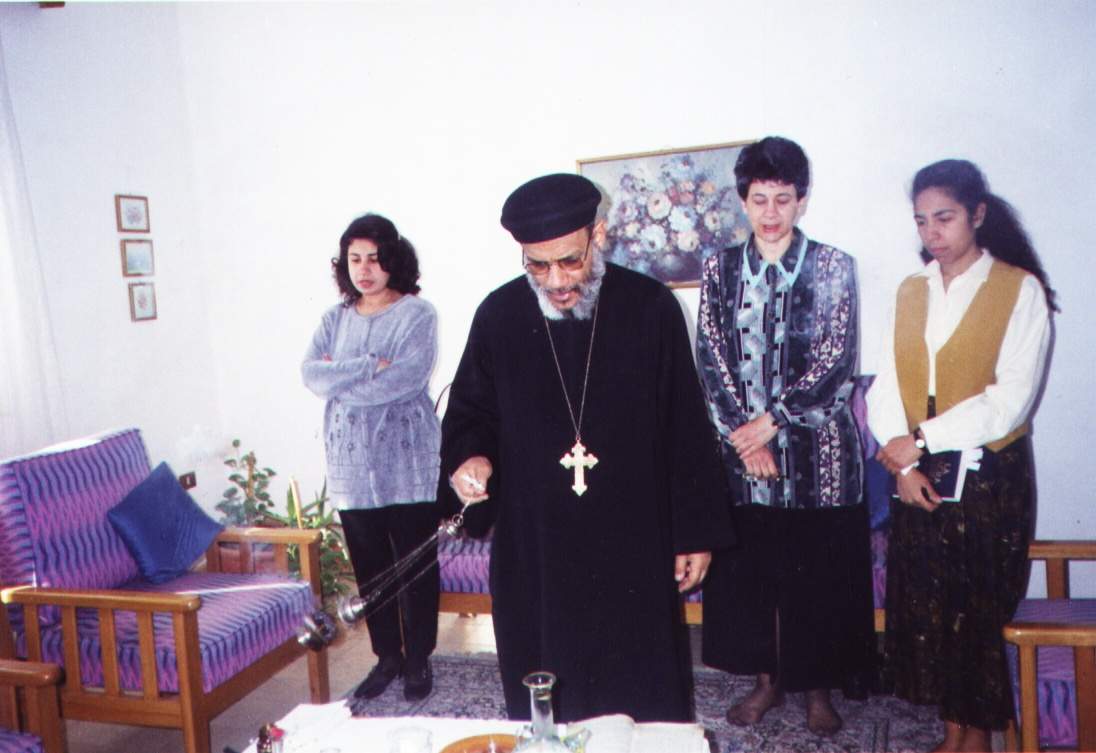 “That encounter between those two great men of God is still alive in my memory as, under the guidance of the Holy Spirit, they continue to conduct their flock towards the one Church that will come in God’s time. The memory of their fraternal embrace and the mutual love that could be visibly seen between them fills me with immense joy. I join my sisters and brothers of both Churches in celebrating this occasion, and with enthusiasm I look towards the near future, confident in the steps that will draw us closer and closer. This is a cause of great rejoicing for the entire Church! It encourages me to live for unity even more, a possibility that had fascinated me years ago when I met the Focolare Movement where I discovered the ‘precious pearl’ of the Gospel, for which you sell everything you have. I share this life in focolare with sisters from various Churches, and this is where I experience the joy of the Risen One, a sign of what the Church will be in its full unity. Each day we pray, work, share moments of suffering as Pope Francis said when he spoke about the ecumenism of suffering, and it makes us grow in love and mutual respect, believing that on the Cross, Jesus has overcome all our divisions and filled every void. I am grateful for the many people across the world with whom I share this experience. We live and pray for this unity, that it might be experienced and lived by everyone.” Sherin, focolare, Sohag, Egypt
“That encounter between those two great men of God is still alive in my memory as, under the guidance of the Holy Spirit, they continue to conduct their flock towards the one Church that will come in God’s time. The memory of their fraternal embrace and the mutual love that could be visibly seen between them fills me with immense joy. I join my sisters and brothers of both Churches in celebrating this occasion, and with enthusiasm I look towards the near future, confident in the steps that will draw us closer and closer. This is a cause of great rejoicing for the entire Church! It encourages me to live for unity even more, a possibility that had fascinated me years ago when I met the Focolare Movement where I discovered the ‘precious pearl’ of the Gospel, for which you sell everything you have. I share this life in focolare with sisters from various Churches, and this is where I experience the joy of the Risen One, a sign of what the Church will be in its full unity. Each day we pray, work, share moments of suffering as Pope Francis said when he spoke about the ecumenism of suffering, and it makes us grow in love and mutual respect, believing that on the Cross, Jesus has overcome all our divisions and filled every void. I am grateful for the many people across the world with whom I share this experience. We live and pray for this unity, that it might be experienced and lived by everyone.” Sherin, focolare, Sohag, Egypt
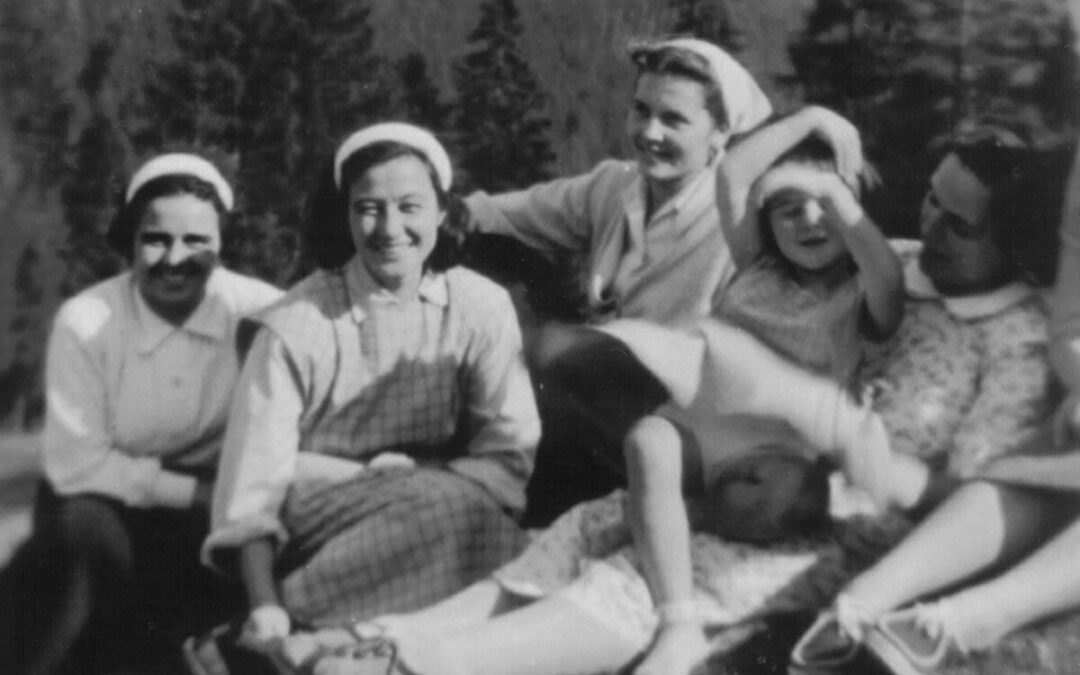
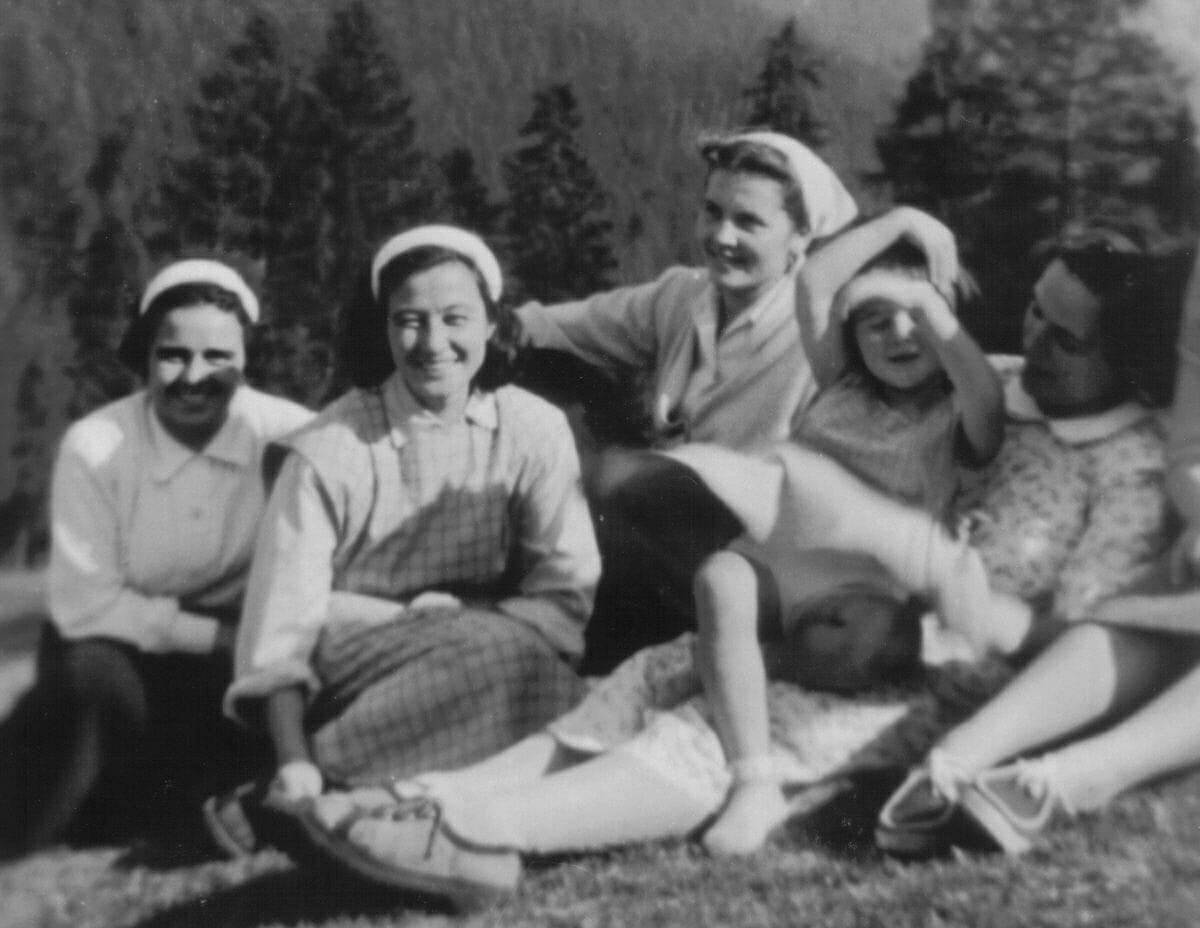 “The adventure of unity:” this is how Chiara Lubich and her first companions were fond of describing their choice of God as the Ideal that led them to live for the unity of the human family. Graziella De Luca was with Chiara right from the start of the Focolare Movement. It would be impossible to describe in few words the very fruitful life she lived in spreading the spirituality of unity in many so many places and hearts. “I have come to set the world on fire, and I wish it were already burning! (Lk 12:49). Chiara had suggested this Gospel sentence to her as a goal, also because of her keen apostolic spirit that led her in great simplicity to share with parliamentarians and simple workers, the great discovery that changed her life, the encounter with God’s love. Born in Trent, Italy, on March 12, 1925, Graziella De Luca died on May 9, 2015 at 15:35, as the focolarine gathered around her were praying the Veni Creator Spiritus, writes Focolare president, Maria Voce informing the global community of Graziella’s death. She continued: “Let us thank God for her abundantly fruitful life. Let us pray for her, in the joy of imagining her already in the Bosom of the Father, with Our Lady and all those who are dear to us. Let us trustfully entrust the Work of Mary to her as it “reaches out,” certain that she will help us to set the world on fire with love”. Live streaming of the funeral: live.focolare.org/graziella
“The adventure of unity:” this is how Chiara Lubich and her first companions were fond of describing their choice of God as the Ideal that led them to live for the unity of the human family. Graziella De Luca was with Chiara right from the start of the Focolare Movement. It would be impossible to describe in few words the very fruitful life she lived in spreading the spirituality of unity in many so many places and hearts. “I have come to set the world on fire, and I wish it were already burning! (Lk 12:49). Chiara had suggested this Gospel sentence to her as a goal, also because of her keen apostolic spirit that led her in great simplicity to share with parliamentarians and simple workers, the great discovery that changed her life, the encounter with God’s love. Born in Trent, Italy, on March 12, 1925, Graziella De Luca died on May 9, 2015 at 15:35, as the focolarine gathered around her were praying the Veni Creator Spiritus, writes Focolare president, Maria Voce informing the global community of Graziella’s death. She continued: “Let us thank God for her abundantly fruitful life. Let us pray for her, in the joy of imagining her already in the Bosom of the Father, with Our Lady and all those who are dear to us. Let us trustfully entrust the Work of Mary to her as it “reaches out,” certain that she will help us to set the world on fire with love”. Live streaming of the funeral: live.focolare.org/graziella
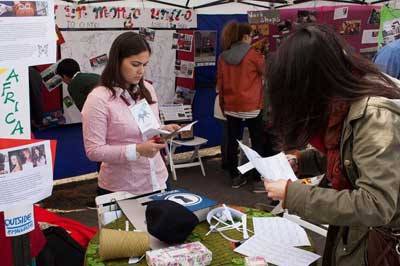
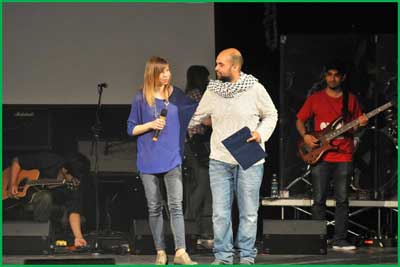 “During these hours in which we are literally bombarded with violence, war, and indifference, we wish to powerfully testify that there is another way, because there is!” This was the introduction that came from the stage of the Auditorium of Loppiano, Italy where Nino, Nahomi, Luigi and Anna had held a two hour long discussion with 1,400 young people. The 42cnd Meeting of young Italians of the Focolare was held on the 1st of May in the permanent Mariapolis of Loppiano, Italy. This year’s title was: OUTSIDE, Look, Choose, Be.” Many proposals were presented by the Young For A United World in support of a culture of fraternity, as a way of emerging from personal and social inertia and bring change to the world. Their “Fragments of Unity” Expo highlighted solidarity and social involvement, through a network of organisations which the young people run. One powerful testimony: “My name is Kareem. I’m Palestinian. I’m 23 years old with a degree in Administration. After the fall of Arafat’s government things began to be difficult for us Christians on the Garza Strip. At that time there were around 2000 of us out of a population of one and a half million. Then our numbers dwindled. Two churches were bombed. The war began in 2008. One day, a bomb exploded near me, and I was thrown to the ground. So much destruction, so many dead! I first tried to go to my father at the United Nations office because it seemed a safe place, but it wasn’t possible. It took me four hours to reach my home, having to walk over many dead bodies. My mother was in tears, because she hadn’t heard from me. We lived through 28 days of that constant tension. Then we managed to leave the Garza Strip and get into Jordan. With the people from the Focolare, experiencing such a life of fraternity, I was little by little able to overcome the powerful trauma and to believe that with love we could build a world of peace. I’ve been in Loppiano for seven months. Living with young people from so many different cultures, religions and experiences is something new for me, because we didn’t have any outside contacts in Gaza. But now, as I try to open myself and be accepting of others, I feel at home; I’ve discovered the treasure I’ve been searching for.”
“During these hours in which we are literally bombarded with violence, war, and indifference, we wish to powerfully testify that there is another way, because there is!” This was the introduction that came from the stage of the Auditorium of Loppiano, Italy where Nino, Nahomi, Luigi and Anna had held a two hour long discussion with 1,400 young people. The 42cnd Meeting of young Italians of the Focolare was held on the 1st of May in the permanent Mariapolis of Loppiano, Italy. This year’s title was: OUTSIDE, Look, Choose, Be.” Many proposals were presented by the Young For A United World in support of a culture of fraternity, as a way of emerging from personal and social inertia and bring change to the world. Their “Fragments of Unity” Expo highlighted solidarity and social involvement, through a network of organisations which the young people run. One powerful testimony: “My name is Kareem. I’m Palestinian. I’m 23 years old with a degree in Administration. After the fall of Arafat’s government things began to be difficult for us Christians on the Garza Strip. At that time there were around 2000 of us out of a population of one and a half million. Then our numbers dwindled. Two churches were bombed. The war began in 2008. One day, a bomb exploded near me, and I was thrown to the ground. So much destruction, so many dead! I first tried to go to my father at the United Nations office because it seemed a safe place, but it wasn’t possible. It took me four hours to reach my home, having to walk over many dead bodies. My mother was in tears, because she hadn’t heard from me. We lived through 28 days of that constant tension. Then we managed to leave the Garza Strip and get into Jordan. With the people from the Focolare, experiencing such a life of fraternity, I was little by little able to overcome the powerful trauma and to believe that with love we could build a world of peace. I’ve been in Loppiano for seven months. Living with young people from so many different cultures, religions and experiences is something new for me, because we didn’t have any outside contacts in Gaza. But now, as I try to open myself and be accepting of others, I feel at home; I’ve discovered the treasure I’ve been searching for.”  “After the 2010 earthquake in Haiti which caused the death of more than 220 thousand people, thousands of Haitians migrated to Brazil,” says Joao from Florianopolis, in south Brazil. “Many of them have university degrees but, since they don’t speak Portuguese, they are only able to find work as bricklayers, and are often paid very little and treated with scorn. We asked ourselves what could be done. We began by gathering clothing and foodstuffs. We felt a bit awkward, because they only spoke French and Creole, and we were unfamiliar with their culture. But our strong desire to practice the Gospel sentence: “I was a stranger and you welcomed me,” overcame all the obstacles. Little by little we got to know them and also their problems. The first was language. We began offering them Portuguese lessons with slides and music. Then we helped them to obtain their documents and enrol in free technical training courses that are offered by the government, so that they could find employment and a better life. We held cultural nights, with food, song and dance from their country. We went to the seashore and played football together. . . We have begun to build an association to take advantage of all the possible opportunities offered by institutions in favour of their full insertion into local society. Not everything has been worked out and we still have a lot of work ahead of us, but it seems that a seed of fraternity has been planted.” This has been a glimpse of the 2015 Meeting, rich with testimonies and many concrete proposals for responding to the urgent needs of many people. Meanwhile, a network of young people, associations, and organisations has already been very active for several years in Italy, operating at many levels of the social fabric, in what Pope Francis has called the existential peripheries: “We want to bring into the light this undergrowth of solidarity that is building a present and future of peace, but is not well enough known,” the young people from the Focolare explain.
“After the 2010 earthquake in Haiti which caused the death of more than 220 thousand people, thousands of Haitians migrated to Brazil,” says Joao from Florianopolis, in south Brazil. “Many of them have university degrees but, since they don’t speak Portuguese, they are only able to find work as bricklayers, and are often paid very little and treated with scorn. We asked ourselves what could be done. We began by gathering clothing and foodstuffs. We felt a bit awkward, because they only spoke French and Creole, and we were unfamiliar with their culture. But our strong desire to practice the Gospel sentence: “I was a stranger and you welcomed me,” overcame all the obstacles. Little by little we got to know them and also their problems. The first was language. We began offering them Portuguese lessons with slides and music. Then we helped them to obtain their documents and enrol in free technical training courses that are offered by the government, so that they could find employment and a better life. We held cultural nights, with food, song and dance from their country. We went to the seashore and played football together. . . We have begun to build an association to take advantage of all the possible opportunities offered by institutions in favour of their full insertion into local society. Not everything has been worked out and we still have a lot of work ahead of us, but it seems that a seed of fraternity has been planted.” This has been a glimpse of the 2015 Meeting, rich with testimonies and many concrete proposals for responding to the urgent needs of many people. Meanwhile, a network of young people, associations, and organisations has already been very active for several years in Italy, operating at many levels of the social fabric, in what Pope Francis has called the existential peripheries: “We want to bring into the light this undergrowth of solidarity that is building a present and future of peace, but is not well enough known,” the young people from the Focolare explain.
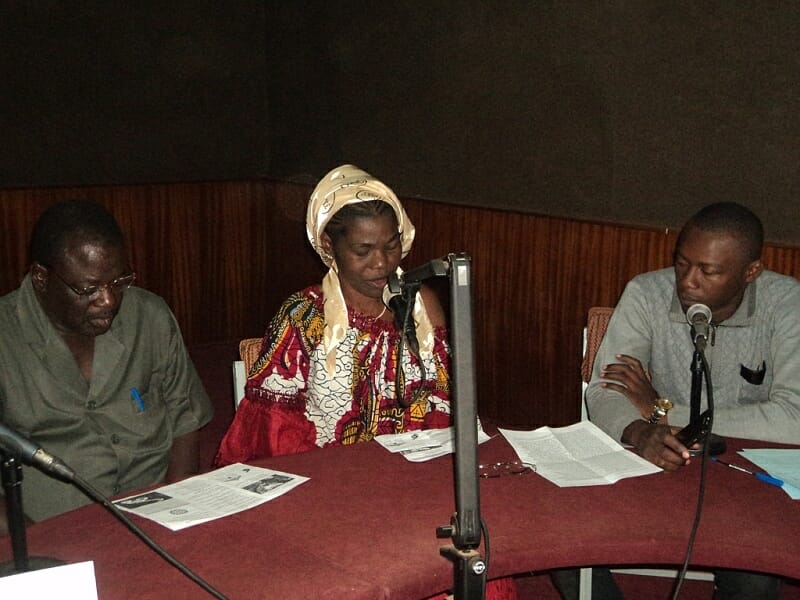
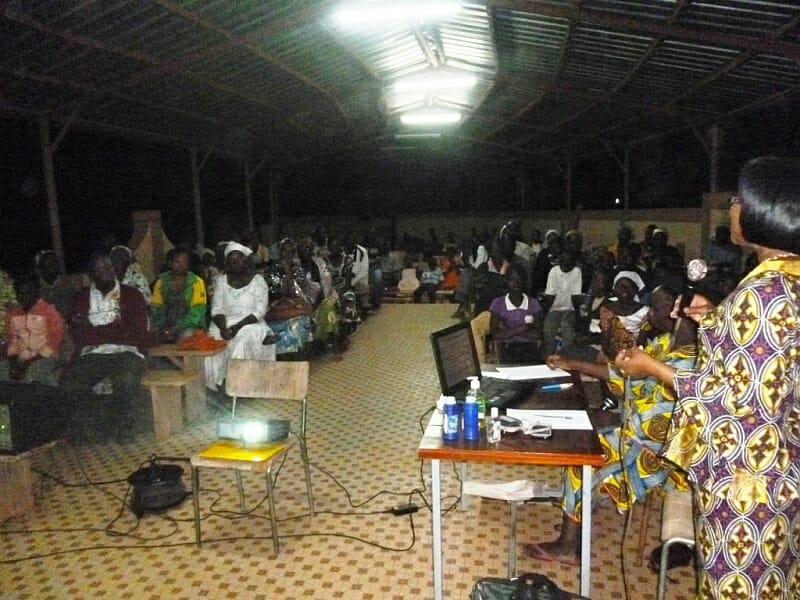 Bobo Dioulasso is the second city of Burkina Faso, the closest to Bamako, capital of Mali, where some cases of Ebola had been detected. There is a dynamic social and economic relationship between the two cities, with a continual movement of people and merchandise. “We need to act urgently to reduce at best the risk of the virus reaching also Burkina – wrote the Ebola awareness team of the Focolare Movement in Bobo Dioulasso. We practically had to inform as many people as possible on the preventive measures, but the political situation in the country is such that government interventions are not always possible.” “So we decided to act on our own. Félicité is a volunteer epidemiological doctor at the Healthcare Organisation for West Africa (OOAS). Her specific role is to train the healthcare practitioners in fighting epidemic outbreaks, since she herself has worked in countries like Guinea Conakry, Liberia, and Sierra Leone. Félicité immediately offered her services.”
Bobo Dioulasso is the second city of Burkina Faso, the closest to Bamako, capital of Mali, where some cases of Ebola had been detected. There is a dynamic social and economic relationship between the two cities, with a continual movement of people and merchandise. “We need to act urgently to reduce at best the risk of the virus reaching also Burkina – wrote the Ebola awareness team of the Focolare Movement in Bobo Dioulasso. We practically had to inform as many people as possible on the preventive measures, but the political situation in the country is such that government interventions are not always possible.” “So we decided to act on our own. Félicité is a volunteer epidemiological doctor at the Healthcare Organisation for West Africa (OOAS). Her specific role is to train the healthcare practitioners in fighting epidemic outbreaks, since she herself has worked in countries like Guinea Conakry, Liberia, and Sierra Leone. Félicité immediately offered her services.” 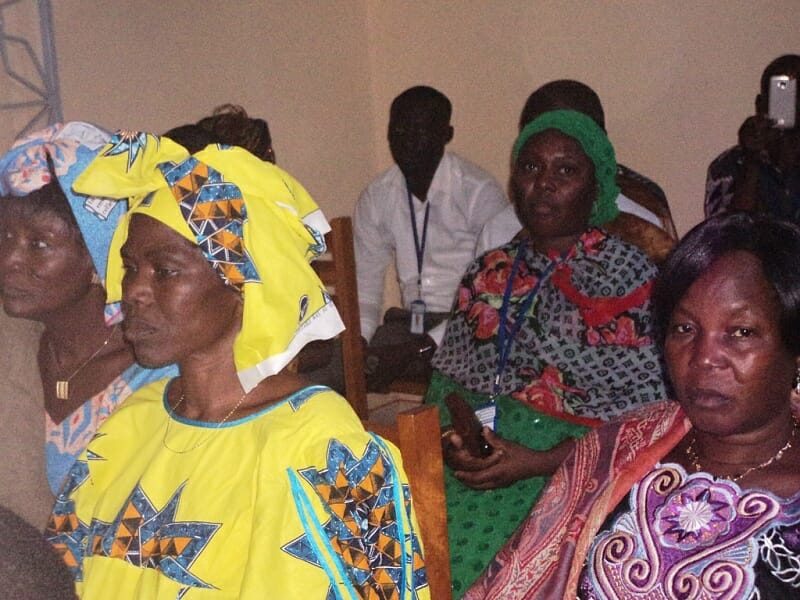 “The first thing we thought of doing was to notify the Bishop who was not in town at that time. We then went to speak to the Vicar Genera”l, Abbé Sylvestre, who assured us of the full support of the diocese, and in exhorting the clergy and faithful about the necessary precautionary measures to take. Carlo, a focolarino doctor of the dispensary of Mariapolis Victoria (Man) of the Ivory Coast, sent us some audiovisuals which we copied for the various youth and adult groups that would work for the awareness campaign. We also sent this material to a priest and a teacher in two other cities (Dedougou and Toussiana), interested in our campaign. Félicité took charge of forming groups, with the help of 15 students of the western countries of Africa sent by the OOAS, some of whom are Muslims.” “The campaign started in November 2014, but before that was already taken up during the meetings of the Focolare Movement. Campaigning was done in parishes in order to expand towards the various districts, and during a big youth meet organised by the diocese of Bobo Dioulasso itself. On Sundays we went to speak also in the churches. We spoke in a private radio broadcast, and in those of the national and also diocesan radios, in the three languages spoken: French, Dioula and Moré.”
“The first thing we thought of doing was to notify the Bishop who was not in town at that time. We then went to speak to the Vicar Genera”l, Abbé Sylvestre, who assured us of the full support of the diocese, and in exhorting the clergy and faithful about the necessary precautionary measures to take. Carlo, a focolarino doctor of the dispensary of Mariapolis Victoria (Man) of the Ivory Coast, sent us some audiovisuals which we copied for the various youth and adult groups that would work for the awareness campaign. We also sent this material to a priest and a teacher in two other cities (Dedougou and Toussiana), interested in our campaign. Félicité took charge of forming groups, with the help of 15 students of the western countries of Africa sent by the OOAS, some of whom are Muslims.” “The campaign started in November 2014, but before that was already taken up during the meetings of the Focolare Movement. Campaigning was done in parishes in order to expand towards the various districts, and during a big youth meet organised by the diocese of Bobo Dioulasso itself. On Sundays we went to speak also in the churches. We spoke in a private radio broadcast, and in those of the national and also diocesan radios, in the three languages spoken: French, Dioula and Moré.”  “This campaign gave us the opportunity to meet many people. When Jean-Bernard explained to his neighbours what he wanted to do in the district, everyone offered help: some attended to the amplifiers, some invited a singer to entertain, another took care of the transport of the material and others brought water to drink. At the presentation there were about 200 people. Word spread also to the neighbouring districts and Jean-Bernard had to repeat the program several times. In one of these occasions, a professional nurse offered to answer the questions of the audience. In another meeting, an expert of local tongues came and was an excellent translator. The officers of the Town Hall, who had given the permit for these meetings, expressed their gratitude for all this.» “In the meantime, we heard from Mali that the disease had been overcome. So the risk had been drastically reduced. The important thing now is to continue to comply with the preventive measures. It was a great opportunity to learn to work together for our people. We must continue.”
“This campaign gave us the opportunity to meet many people. When Jean-Bernard explained to his neighbours what he wanted to do in the district, everyone offered help: some attended to the amplifiers, some invited a singer to entertain, another took care of the transport of the material and others brought water to drink. At the presentation there were about 200 people. Word spread also to the neighbouring districts and Jean-Bernard had to repeat the program several times. In one of these occasions, a professional nurse offered to answer the questions of the audience. In another meeting, an expert of local tongues came and was an excellent translator. The officers of the Town Hall, who had given the permit for these meetings, expressed their gratitude for all this.» “In the meantime, we heard from Mali that the disease had been overcome. So the risk had been drastically reduced. The important thing now is to continue to comply with the preventive measures. It was a great opportunity to learn to work together for our people. We must continue.”
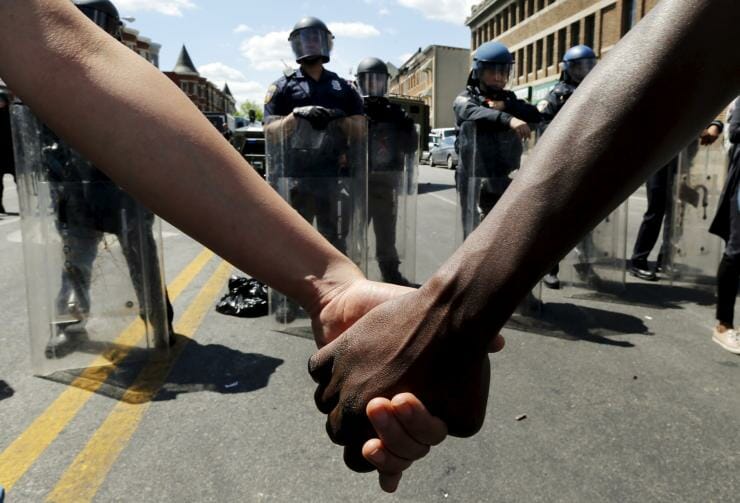
 “The events that came about have stirred up the support of the citizens. Many leaders, religious groups and civil organisations decided to work together to clean the streets and buildings and to help in various ways, revealing the positive side of the city, though deeply offended,» Lucia, Co-Director of the Focolare Movement wrote from Washington. We all know about the people’s protests triggered in Baltimore last month, which are still ongoing, after the death of the 25-year-old Afro-American Freddie Gray while he was under arrest. Baltimore, the biggest city of Maryland with more than 600,000 inhabitants is a melting pot of ethnic groups, especially Afro-Americans. Leonie and Jennifer, two volunteers of the Focolare, live in the city centre. “The situation is still very tense, and yesterday the mayor closed the schools and the governor of the state deployed the armed forces. However, all those we know are fine.” Leonie lives close to the place of the clashes and teaches in a primary school of almost all Afro students and where there is great poverty. “On TV I saw one of my third-year elementary students participate in the sacking of buildings and properties.” “We cannot remain indifferent; we want to do something concrete, though aware that our contribution to establish true relationships between people is urgent, more than ever. Furthermore, every act of love builds new relationships that help foster fraternity between people,” wrote Marilena and Mike. “In the meantime we participate in the various moments of prayer organised by the religious authorities, starting from the Mass that Archbishop Lori will celebrate in our district, to invoke peace.” “I returned to school today,” Leonie recounts, “and tried to see my students (those who participated in the plunders) with ‘new eyes’.I contacted an Afro-American Muslim teacher who knows two black religious representatives in the school to offer our solidarity, and we agreed to work together.” Jennifer works in a company where almost all are whites. «A colleague of mine who lives close to the place where violence broke out, came to visit me today, and told me of her suffering in seeing all these events, but did not have the courage to mention it to anyone for fear of being marginalised by her colleagues. It was the occasion to tell her that we can start from ourselves and build a dialogue with all, one at a time, and in this way spread a new mentality. My colleague is not a practicing believer, but her face lit up and she told me that this is precisely what she also wants to do.” Meanwhile, the leaders of the various religious communities have started to work together for peace. “I was invited by the Imam Talib of the mosque of Washington, to give my testimony on the the 5th of May as a focolarina and the ideal that inspires us,” Lucia continued. “He wanted me to speak in a meeting open to the public, something they had organised with the District Procurator, to integrate the religious perspective as an essential dimension to subdue the violence. The event was entitled: Heal the Hurt, Heal the Heart. It seemed to be a great possibility for dialogue between religions but also an opportunity to show, more than the clashing, the richness of our society’s ethnic diversities.”
“The events that came about have stirred up the support of the citizens. Many leaders, religious groups and civil organisations decided to work together to clean the streets and buildings and to help in various ways, revealing the positive side of the city, though deeply offended,» Lucia, Co-Director of the Focolare Movement wrote from Washington. We all know about the people’s protests triggered in Baltimore last month, which are still ongoing, after the death of the 25-year-old Afro-American Freddie Gray while he was under arrest. Baltimore, the biggest city of Maryland with more than 600,000 inhabitants is a melting pot of ethnic groups, especially Afro-Americans. Leonie and Jennifer, two volunteers of the Focolare, live in the city centre. “The situation is still very tense, and yesterday the mayor closed the schools and the governor of the state deployed the armed forces. However, all those we know are fine.” Leonie lives close to the place of the clashes and teaches in a primary school of almost all Afro students and where there is great poverty. “On TV I saw one of my third-year elementary students participate in the sacking of buildings and properties.” “We cannot remain indifferent; we want to do something concrete, though aware that our contribution to establish true relationships between people is urgent, more than ever. Furthermore, every act of love builds new relationships that help foster fraternity between people,” wrote Marilena and Mike. “In the meantime we participate in the various moments of prayer organised by the religious authorities, starting from the Mass that Archbishop Lori will celebrate in our district, to invoke peace.” “I returned to school today,” Leonie recounts, “and tried to see my students (those who participated in the plunders) with ‘new eyes’.I contacted an Afro-American Muslim teacher who knows two black religious representatives in the school to offer our solidarity, and we agreed to work together.” Jennifer works in a company where almost all are whites. «A colleague of mine who lives close to the place where violence broke out, came to visit me today, and told me of her suffering in seeing all these events, but did not have the courage to mention it to anyone for fear of being marginalised by her colleagues. It was the occasion to tell her that we can start from ourselves and build a dialogue with all, one at a time, and in this way spread a new mentality. My colleague is not a practicing believer, but her face lit up and she told me that this is precisely what she also wants to do.” Meanwhile, the leaders of the various religious communities have started to work together for peace. “I was invited by the Imam Talib of the mosque of Washington, to give my testimony on the the 5th of May as a focolarina and the ideal that inspires us,” Lucia continued. “He wanted me to speak in a meeting open to the public, something they had organised with the District Procurator, to integrate the religious perspective as an essential dimension to subdue the violence. The event was entitled: Heal the Hurt, Heal the Heart. It seemed to be a great possibility for dialogue between religions but also an opportunity to show, more than the clashing, the richness of our society’s ethnic diversities.”
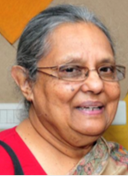
 “Over the last few days in South Africa, there has been a lot of unrest, violence, violation of human rights… there are some South Africans who have refused to accommodate other brothers of other African nations in the country. It is difficult to see why these sparks of violence have emerged so strongly. We really need to promote tolerance towards the differences in the groups and communities everywhere. The migrants live in fear and many have already returned to their countries of origin, wrote Jacira from Johannesburg. This was the atmosphere in which the 7th death anniversary of Chiara Lubich (22/01/1920 – 14/03/2008) was held, and the seminar was entitled “Religion at the Service of Peace.” The speech of Ela Gandhi, niece of Mahatma, was very meaningful. On her many trips to Italy she had been impressed by the figure of Chiara Lubich and the spirituality of unity, as she so extensively stressed in her long speech. Among other things she also affirmed: “Upon acknowledging, like Gandhiji, that no results can be reached when people are jobless, and lack food, homes and clothing, Chiara conceived the idea of the Economy of Communion in liberty. Taking care of one another is her strong exhortation!” And further explained: “It is love for the others, in the form of mercy, love that opens hearts and hands to embrace the derelicts, the poor, those who have been marginalised from life and the repentant sinners.” “If we believe we are practicing our religion faithfully, when then is there so many battles, wars, abuse of power and sufferings perpetrated by man against man and indescribable atrocities committed by man in this world?” she asked, and strongly affirmed: “Every community of faithful must take the responsibility of correcting the erroneous interpretations of their own faith, and must not abandon their faith.” “Here in South Africa, during the apartheid period which was based on an erroneous interpretation of the Bibles,” according to Ms Ela Gandhi, “Our Christian brothers and sisters agreed with one another to produce the Kairos Document. This document affirms that “the problem in South Africa is not just that of a personal fault, it is a problem of structural injustice.” And Ms Ela Gandhi thus concluded: “Today, when the world and also our country is undergoing a high rate of violence and madness, anger and destruction, poverty and misery, we need to turn our gaze once again toward our concept of Ubuntu and see in what way each one of us can start introducing in his life, the agape, bhavana and many other similar concepts that refer to pure love so as to help create a better world.” More than ever today, to give our own contribution, the members of the Focolare in this country of such immense distances, commit themselves to reach the farthest communities to share the message of peace and unity, fruit of the Gospel lived.
“Over the last few days in South Africa, there has been a lot of unrest, violence, violation of human rights… there are some South Africans who have refused to accommodate other brothers of other African nations in the country. It is difficult to see why these sparks of violence have emerged so strongly. We really need to promote tolerance towards the differences in the groups and communities everywhere. The migrants live in fear and many have already returned to their countries of origin, wrote Jacira from Johannesburg. This was the atmosphere in which the 7th death anniversary of Chiara Lubich (22/01/1920 – 14/03/2008) was held, and the seminar was entitled “Religion at the Service of Peace.” The speech of Ela Gandhi, niece of Mahatma, was very meaningful. On her many trips to Italy she had been impressed by the figure of Chiara Lubich and the spirituality of unity, as she so extensively stressed in her long speech. Among other things she also affirmed: “Upon acknowledging, like Gandhiji, that no results can be reached when people are jobless, and lack food, homes and clothing, Chiara conceived the idea of the Economy of Communion in liberty. Taking care of one another is her strong exhortation!” And further explained: “It is love for the others, in the form of mercy, love that opens hearts and hands to embrace the derelicts, the poor, those who have been marginalised from life and the repentant sinners.” “If we believe we are practicing our religion faithfully, when then is there so many battles, wars, abuse of power and sufferings perpetrated by man against man and indescribable atrocities committed by man in this world?” she asked, and strongly affirmed: “Every community of faithful must take the responsibility of correcting the erroneous interpretations of their own faith, and must not abandon their faith.” “Here in South Africa, during the apartheid period which was based on an erroneous interpretation of the Bibles,” according to Ms Ela Gandhi, “Our Christian brothers and sisters agreed with one another to produce the Kairos Document. This document affirms that “the problem in South Africa is not just that of a personal fault, it is a problem of structural injustice.” And Ms Ela Gandhi thus concluded: “Today, when the world and also our country is undergoing a high rate of violence and madness, anger and destruction, poverty and misery, we need to turn our gaze once again toward our concept of Ubuntu and see in what way each one of us can start introducing in his life, the agape, bhavana and many other similar concepts that refer to pure love so as to help create a better world.” More than ever today, to give our own contribution, the members of the Focolare in this country of such immense distances, commit themselves to reach the farthest communities to share the message of peace and unity, fruit of the Gospel lived.
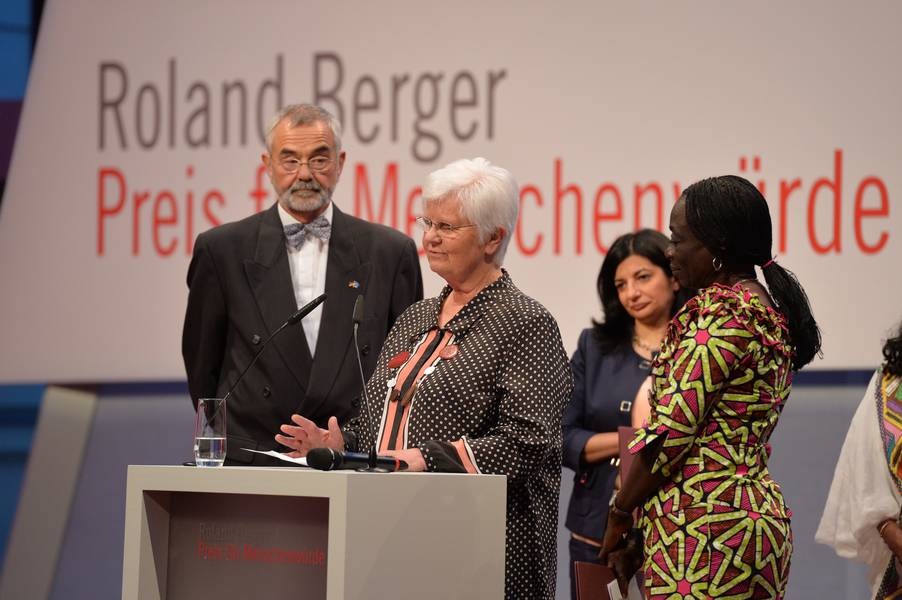
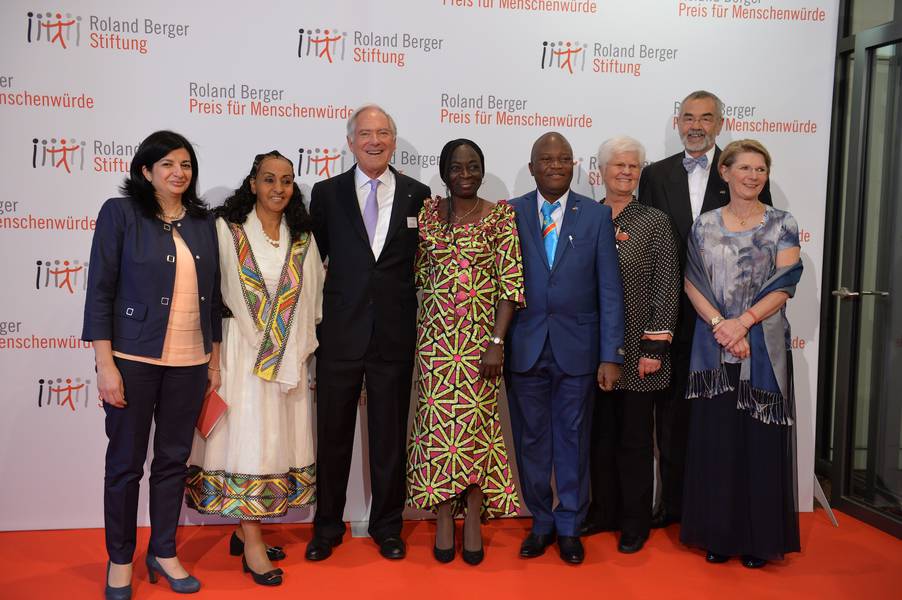 “I was one of the Petite Flamme children, and schooling gave me the chance to do something fulfilling in life,” recounted Trésor, 29, and currently a mathematics student at the National College, in a video projected during the awards ceremony held last 29 April at the Jewish Museum of Berlin. Jean Paul Ngandu Masamuna, 31, Engineer and seventh of nine children, added: “When I was a child, my father had gone to war, and my mother had nothing to bring us up with. We had to fight for survival and Petite Flamme gave me daily sustenance and the possibility to study. My friends went to Europe but every time I speak to them, they tell me that they have nothing, and being unemployed and without documents, they do not have the liberty I have, and that their dreams have not been fulfilled. I love living in Kinshasa with my Congolese people. I want to stay and work in Africa to save the lives of many people who suffer.” Petite Flamme is a scholastic organisation of the Focolare in Congo, that offers many kids the chance to build a future in their country of origin, without needing to migrate.
“I was one of the Petite Flamme children, and schooling gave me the chance to do something fulfilling in life,” recounted Trésor, 29, and currently a mathematics student at the National College, in a video projected during the awards ceremony held last 29 April at the Jewish Museum of Berlin. Jean Paul Ngandu Masamuna, 31, Engineer and seventh of nine children, added: “When I was a child, my father had gone to war, and my mother had nothing to bring us up with. We had to fight for survival and Petite Flamme gave me daily sustenance and the possibility to study. My friends went to Europe but every time I speak to them, they tell me that they have nothing, and being unemployed and without documents, they do not have the liberty I have, and that their dreams have not been fulfilled. I love living in Kinshasa with my Congolese people. I want to stay and work in Africa to save the lives of many people who suffer.” Petite Flamme is a scholastic organisation of the Focolare in Congo, that offers many kids the chance to build a future in their country of origin, without needing to migrate. 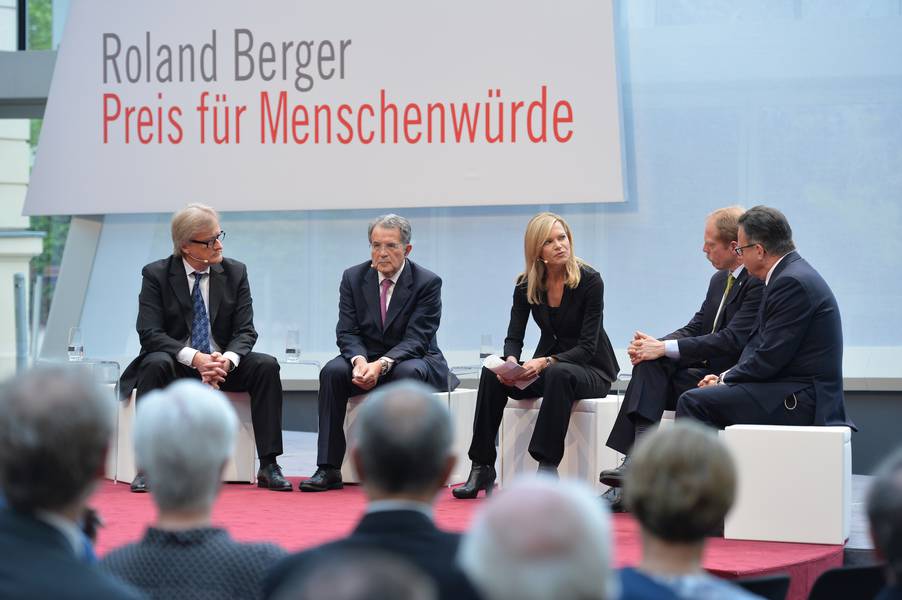 Immigration, the need to stop the carnage at sea, the urgency for political initiatives of the international community in favour of some Sub-Saharian and mid-oriental regions, were the topics discussed during the proceedings of “The Roland Berger Human Dignity Award” in Berlin. The event was attended by: the German Minister of Foreign Affairs, Frank-Walter Steinmeier, Romano Prodi, former President of the European Commission, and other exponents of the economic and political worlds. During the event, the “Roland Berger Foundation” operating in Germany in support of human rights and disadvantaged students awarded the 2015 prize, dedicated to the commitment to defend the life and dignity of refugees and forestall immigration issues. Among the winners, besides Petite Flamme, were two heroic women involved in helping refugees: Dr. Katrine Camilleri from Malta, who has been involved for years in giving refugees legal support, and Dr. Alganesc Fessaha, President of the NGO, “Gandhi,” who offers humanitarian assistance to African refugees.
Immigration, the need to stop the carnage at sea, the urgency for political initiatives of the international community in favour of some Sub-Saharian and mid-oriental regions, were the topics discussed during the proceedings of “The Roland Berger Human Dignity Award” in Berlin. The event was attended by: the German Minister of Foreign Affairs, Frank-Walter Steinmeier, Romano Prodi, former President of the European Commission, and other exponents of the economic and political worlds. During the event, the “Roland Berger Foundation” operating in Germany in support of human rights and disadvantaged students awarded the 2015 prize, dedicated to the commitment to defend the life and dignity of refugees and forestall immigration issues. Among the winners, besides Petite Flamme, were two heroic women involved in helping refugees: Dr. Katrine Camilleri from Malta, who has been involved for years in giving refugees legal support, and Dr. Alganesc Fessaha, President of the NGO, “Gandhi,” who offers humanitarian assistance to African refugees.  “It all sprang from an idea of Chiara Lubich – recounts Dada Diambu who, together with Odon Makela, coordinates the local project – when she launched the New Families’ “support from afar” project in order to cope with the difficult situation many children worldwide undergo. Petite Flamme was created in 1996 to offer education to the children of Ndolo, an extremely poor district of Kinshasa. The children are undernourished, and because of this the priority was to offer meals and necessary medical care. In the following years new centres were opened, and the scholastic cycle expanded the offer to adolescents and families, with classes for blind and deaf kids. Then the experience went to include “after-school under the tree” activities: 14 classes held under 14 trees due to the lack of other structures. Under constant development, the project centres located in the poor outskirts of Kinshasa then spread to Idiofa in Bandundu at 750 km from the capital, and to Kisandu in Bas-Kongo and Kikwit. The project is financed by various associations and NGOs, and by the Association for New Families onlus, that ensures education, medical care, and nutrition for 2,400 boys and girls, helping them to become free persons, since they have the possibility to be free from poverty and have the capacity to build a dignified life for themselves and the community. «During the European Union’s “Eufor” military mission tasked with safeguarding the elections in Congo in 2006 – explained Monika-Maria Wolff for years a resident in Congo – the rear admiral Henning Bess, head of the German soldiers and Vice-Captain of the mission got to know about “Petite Flamme.” Since then he has been involved, with his troops, in many huge aid campaigns. After the end of the mission the rear admiral continued with his wife, Julie Müller, to support Petite Flamme – along with the “support from afar” project of the New Families that has a network of over 350 German supporters.» The ceremony featured a round table on the outcomes of the recent special EU Summit on immigration, attended by Romano Prodi, Foreign Affairs Minister, Steinmeier, a representative of the UN’s High Commissioner for refugees, journalists and members of the various humanitarian organizations. The summit highlighted two solutions as the only ones possible for a sustainable support: that the International communities cooperate in a more compact and decisive way for peace, and support the initiatives aimed at resolving – following the example of Petite Flamme –the problem at its roots, and give the youth a chance to conduct a dignified life in their own countries without having to turn to escaping towards the north and wellbeing. Photo gallery
“It all sprang from an idea of Chiara Lubich – recounts Dada Diambu who, together with Odon Makela, coordinates the local project – when she launched the New Families’ “support from afar” project in order to cope with the difficult situation many children worldwide undergo. Petite Flamme was created in 1996 to offer education to the children of Ndolo, an extremely poor district of Kinshasa. The children are undernourished, and because of this the priority was to offer meals and necessary medical care. In the following years new centres were opened, and the scholastic cycle expanded the offer to adolescents and families, with classes for blind and deaf kids. Then the experience went to include “after-school under the tree” activities: 14 classes held under 14 trees due to the lack of other structures. Under constant development, the project centres located in the poor outskirts of Kinshasa then spread to Idiofa in Bandundu at 750 km from the capital, and to Kisandu in Bas-Kongo and Kikwit. The project is financed by various associations and NGOs, and by the Association for New Families onlus, that ensures education, medical care, and nutrition for 2,400 boys and girls, helping them to become free persons, since they have the possibility to be free from poverty and have the capacity to build a dignified life for themselves and the community. «During the European Union’s “Eufor” military mission tasked with safeguarding the elections in Congo in 2006 – explained Monika-Maria Wolff for years a resident in Congo – the rear admiral Henning Bess, head of the German soldiers and Vice-Captain of the mission got to know about “Petite Flamme.” Since then he has been involved, with his troops, in many huge aid campaigns. After the end of the mission the rear admiral continued with his wife, Julie Müller, to support Petite Flamme – along with the “support from afar” project of the New Families that has a network of over 350 German supporters.» The ceremony featured a round table on the outcomes of the recent special EU Summit on immigration, attended by Romano Prodi, Foreign Affairs Minister, Steinmeier, a representative of the UN’s High Commissioner for refugees, journalists and members of the various humanitarian organizations. The summit highlighted two solutions as the only ones possible for a sustainable support: that the International communities cooperate in a more compact and decisive way for peace, and support the initiatives aimed at resolving – following the example of Petite Flamme –the problem at its roots, and give the youth a chance to conduct a dignified life in their own countries without having to turn to escaping towards the north and wellbeing. Photo gallery
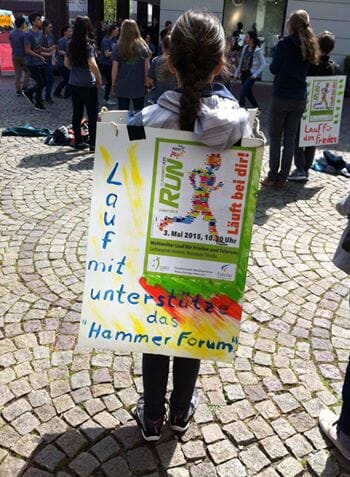
https://www.youtube.com/watch?v=SNo_9JOXWzo One video from the Teens for Unity in Syria shows how they are keeping hope alive in their battered country. It will be viewed by their peers in other countries, who are equally committed to bearing witness with gestures of fraternity, towards the building of a peaceful present. Teenagers from Slovakia will head to Ukraine, just outside Mucachevo: “Even though the war is underway in another part of the country,” they write, “here you feel the great economic crisis and atmosphere of hopelessness.” A small group will go to Kiev in support of their Ukrainian friends. In Bethlehem, a city of peace, Christian and Muslim teenagers from Bethlehem, Nazareth and Haifa will run together. They will take off from Nativity Square: “We’ll announce to Mayor Vera Baboun and the people we find there, our commitment to living out the Golden Rule in order to build fraternity.” In Arequipa, Peru, 2,300 metres above sea level, a chain of solidarity will be unleashed. Each teenager will take foodstuffs and school materials to two centres – one for abandoned children and the other for children with disabilities.  The group from Wellington, New Zealand, will be the first to run; and Los Angeles, USA will close the event. In Malta, the race will be opened by the President of the Republic, M. Luise Coleiro Preca. Some symbolic sites along the race course include the Statue of Liberty on St Gellert Hill, in Budapest, Hungary. In Cochabamba, Bolivia, the teenagers will climb to the feet of the statue of Cristo de la Concordia where it is written: “That all may be one.” In Trelew, Argentina, a peace mural in the centre of town; and in Houston, Texas, a food collection for refugees. All the activities in the Southern Cone and Brazil promise to be colourful and have a strong social imprint. In Kaunas, Lithuania, and in Hamm, Germany, there will be interreligious events. Sponsored by Mayor Thomas Hunsteger-Petermann, the Run4Unity in Hamm will include a “Reli Rally” that will link several places of worship around the city, including a mosque and a Hindu temple. The Bahai teenagers will grab crowd’s attention with a flash mob. Together, they intend to raise contributions for a local social project that helps children from war-torn countries (www.hammer-forum.de). In Goma, Congo, Christians from different Churches and Muslim teenagers from around the city will take part. All the events will be linked by a moment of prayer for peace, the “Time-Out,” offered every day at the noon hour of the different time zones. The teenagers will join together in prayer for all teenagers who live in situations of suffering, the victims of the recent earthquake in Nepal, the teens living in war zones, and those who have had to flee their homelands. Run4Unity will also be racing through the social media. With the hashtag #run4unity, all the links of peace and unity that are being built or rebuilt, can be shared with photos and videos that will be placed on the event’s website: http://www.run4unity.net/2015/. Run4Unity will take place during United World Week 2015. This year’s title is: “Discovering fraternity” as a way to promote peace at all levels of society. This year’s main event will be held in India.
The group from Wellington, New Zealand, will be the first to run; and Los Angeles, USA will close the event. In Malta, the race will be opened by the President of the Republic, M. Luise Coleiro Preca. Some symbolic sites along the race course include the Statue of Liberty on St Gellert Hill, in Budapest, Hungary. In Cochabamba, Bolivia, the teenagers will climb to the feet of the statue of Cristo de la Concordia where it is written: “That all may be one.” In Trelew, Argentina, a peace mural in the centre of town; and in Houston, Texas, a food collection for refugees. All the activities in the Southern Cone and Brazil promise to be colourful and have a strong social imprint. In Kaunas, Lithuania, and in Hamm, Germany, there will be interreligious events. Sponsored by Mayor Thomas Hunsteger-Petermann, the Run4Unity in Hamm will include a “Reli Rally” that will link several places of worship around the city, including a mosque and a Hindu temple. The Bahai teenagers will grab crowd’s attention with a flash mob. Together, they intend to raise contributions for a local social project that helps children from war-torn countries (www.hammer-forum.de). In Goma, Congo, Christians from different Churches and Muslim teenagers from around the city will take part. All the events will be linked by a moment of prayer for peace, the “Time-Out,” offered every day at the noon hour of the different time zones. The teenagers will join together in prayer for all teenagers who live in situations of suffering, the victims of the recent earthquake in Nepal, the teens living in war zones, and those who have had to flee their homelands. Run4Unity will also be racing through the social media. With the hashtag #run4unity, all the links of peace and unity that are being built or rebuilt, can be shared with photos and videos that will be placed on the event’s website: http://www.run4unity.net/2015/. Run4Unity will take place during United World Week 2015. This year’s title is: “Discovering fraternity” as a way to promote peace at all levels of society. This year’s main event will be held in India.
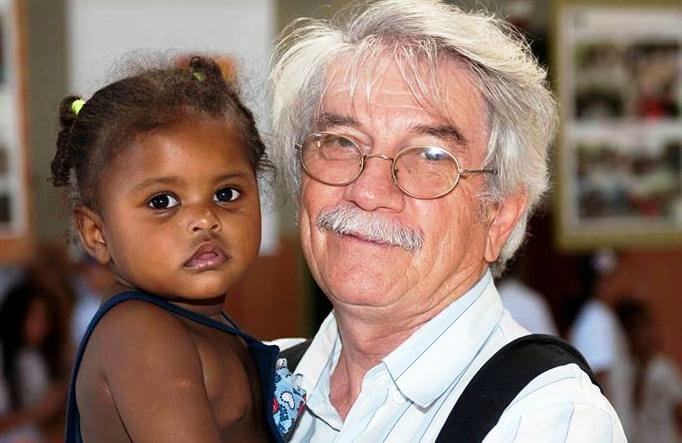
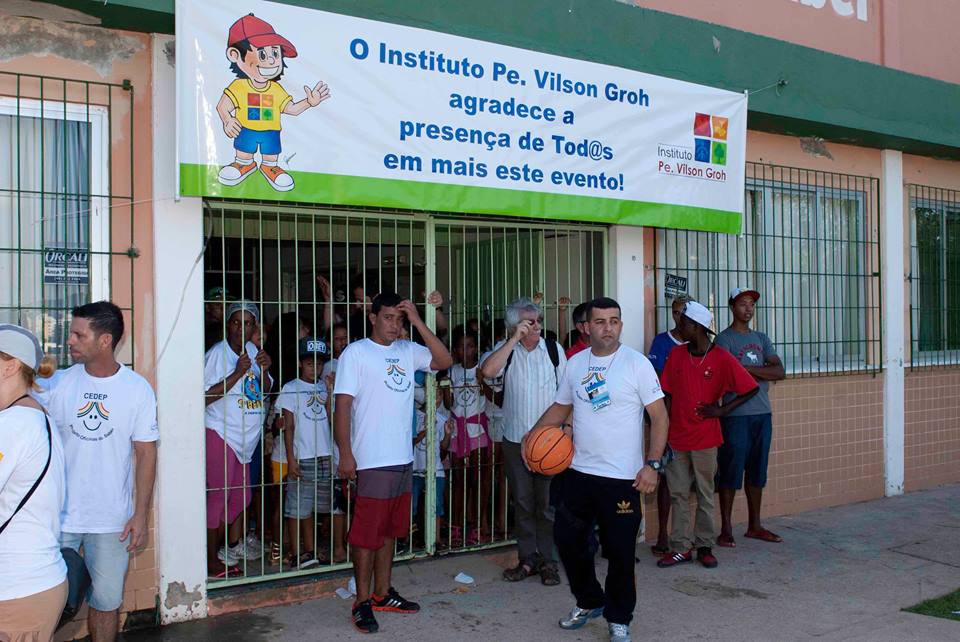 With a network of organisations and a generous and concrete presence, “Fr Vilson” promotes the life and dignity of the most excluded. We asked him the significance of the Eucharist, as the source of unity, for his work in the peripheries. We offer a few excerpts of what he said. “The other day I was with a person who was living on the street, a journalist and a poet. During the course of our conversation he asked me: “What are you doing here on the streets with us?” I answered him that it had seemed a great contradiction to me that I celebrated the Mass in the cathedral every Sunday, and when I stepped out of the church building I would meet seventy to eighty people who didn’t have a roof over their heads, and they hadn’t eaten. How could I go home?
With a network of organisations and a generous and concrete presence, “Fr Vilson” promotes the life and dignity of the most excluded. We asked him the significance of the Eucharist, as the source of unity, for his work in the peripheries. We offer a few excerpts of what he said. “The other day I was with a person who was living on the street, a journalist and a poet. During the course of our conversation he asked me: “What are you doing here on the streets with us?” I answered him that it had seemed a great contradiction to me that I celebrated the Mass in the cathedral every Sunday, and when I stepped out of the church building I would meet seventy to eighty people who didn’t have a roof over their heads, and they hadn’t eaten. How could I go home? 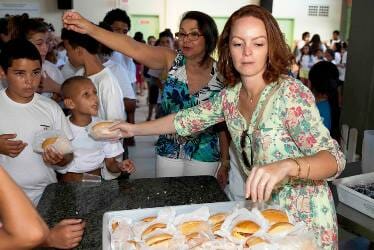 My house stands on the hills of Florianópolis where the number of very poor houses is growing. My house is simple and doesn’t have a key. People come throughout the day to have a cup of coffee or eat something. We’re always adding another plate at table. That door that is always opened means to say that I am open to the neighbourhood community. There is always a place for anyone who knocks at the door. And this is a way to remember that the Eucharist “never closes,” never. He is “at our disposal” twenty four hours a day. In practical terms it means that our refrigerator has to be the refrigerator of the people; our bread, their bread; our clothes, the clothing of the poor. I have been blessed to have the tabernacle in a small chapel in my house. Going home at the end of each day means going to rest where Jesus is waiting for me in the Eucharist, and to rest my head on Him, rather than running to the t.v. or internet that can lead us to many other places.
My house stands on the hills of Florianópolis where the number of very poor houses is growing. My house is simple and doesn’t have a key. People come throughout the day to have a cup of coffee or eat something. We’re always adding another plate at table. That door that is always opened means to say that I am open to the neighbourhood community. There is always a place for anyone who knocks at the door. And this is a way to remember that the Eucharist “never closes,” never. He is “at our disposal” twenty four hours a day. In practical terms it means that our refrigerator has to be the refrigerator of the people; our bread, their bread; our clothes, the clothing of the poor. I have been blessed to have the tabernacle in a small chapel in my house. Going home at the end of each day means going to rest where Jesus is waiting for me in the Eucharist, and to rest my head on Him, rather than running to the t.v. or internet that can lead us to many other places.  There is a sentence engraved on the paten I use for Mass. It’s the Gospel sentence from my Ordination: “I was hungry and you fed me, thirsty and you gave me to drink,” all the way to the end of the text: “Whatever you did to the least of my brothers, you did it to me.” So, every time I place the Eucharistic Bread on the paten, I see those words and they help me not to waste the day. One day a lady from the neighbourhood asked me: “Father Vilson, do you know why Jesus wanted to remain in the Eucharist? So the people wouldn’t feel the solitude and be orphans.” The Eucharist is the great human cry. “There cannot be any gap between the Table of the Eucharist on one side and the table of social justice on the other. It is with our gestures, our arms, our ways of organising that we extend the reality of Jesus in the Eucharist, and we give the world a signal of sharing and support. Guided by this conviction, with the passing of years and along with many other people, we set up a network of 340 people who receive a monthly salary; 7 organisations and one institute. 5000 boys and girls, teenagers and young people gravitate to our network of relationships each day. In order to help build bridges we decided to open an unused church right in the heart of the city, and this gave rise to a large local community with intellectuals, middle class people and business owners who are involved in our activities in a variety of ways. We celebrate Mass there every Saturday and Sunday, and, in this way we believe we create a point of encounter between periphery and center.
There is a sentence engraved on the paten I use for Mass. It’s the Gospel sentence from my Ordination: “I was hungry and you fed me, thirsty and you gave me to drink,” all the way to the end of the text: “Whatever you did to the least of my brothers, you did it to me.” So, every time I place the Eucharistic Bread on the paten, I see those words and they help me not to waste the day. One day a lady from the neighbourhood asked me: “Father Vilson, do you know why Jesus wanted to remain in the Eucharist? So the people wouldn’t feel the solitude and be orphans.” The Eucharist is the great human cry. “There cannot be any gap between the Table of the Eucharist on one side and the table of social justice on the other. It is with our gestures, our arms, our ways of organising that we extend the reality of Jesus in the Eucharist, and we give the world a signal of sharing and support. Guided by this conviction, with the passing of years and along with many other people, we set up a network of 340 people who receive a monthly salary; 7 organisations and one institute. 5000 boys and girls, teenagers and young people gravitate to our network of relationships each day. In order to help build bridges we decided to open an unused church right in the heart of the city, and this gave rise to a large local community with intellectuals, middle class people and business owners who are involved in our activities in a variety of ways. We celebrate Mass there every Saturday and Sunday, and, in this way we believe we create a point of encounter between periphery and center.

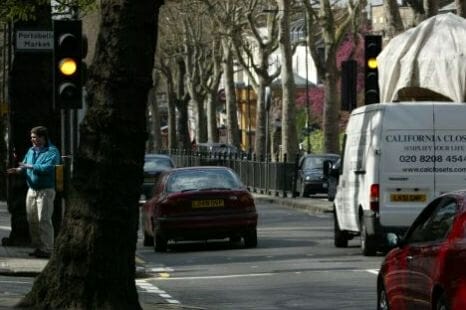 Along the way “Taking the same route every day, I usually come across a multitude of people. There are those who cross the street when they shouldn’t, those who honk at me for a jumpstart at the traffic light, those who try to cut in front of me… Luckily, at times I manage to remember that each one of them is a brother and so… even the most chaotic traffic becomes less complicated. It was particularly hot one day, and I noticed that a vagabond, whom I had seen many times, had fainted on the sidewalk. That was his street corner, and that piece of carton was his house. “He generally did not appear to be sick, and I had never stopped for him before, but seeing that something was wrong, even if I was late in my deliveries, I couldn’t act as if nothing had happened. My van, however, stuck in a zone of intense traffic, immediately called the attention of the local police, who from afar made signs to make a move. I mimed that I wanted to take a look at that person in trouble. They continued to urge me to go away, pointing to the booklet of fines. I thought that they themselves should have taken care of the man, but seeing their indifference, I ran into a bar to get a fresh drink for that poor man. When I returned, I caressed his cheek gently so as not to waken him suddenly. Thank God he regained consciousness but was tired and scared. I put the glass to his lips and he answered with a smile, thanking me continually. In the end, also the policemen arrived and seeing that scene, put the fines booklet back into their pockets and greeted me with a smile.” Alexander – Greece
Along the way “Taking the same route every day, I usually come across a multitude of people. There are those who cross the street when they shouldn’t, those who honk at me for a jumpstart at the traffic light, those who try to cut in front of me… Luckily, at times I manage to remember that each one of them is a brother and so… even the most chaotic traffic becomes less complicated. It was particularly hot one day, and I noticed that a vagabond, whom I had seen many times, had fainted on the sidewalk. That was his street corner, and that piece of carton was his house. “He generally did not appear to be sick, and I had never stopped for him before, but seeing that something was wrong, even if I was late in my deliveries, I couldn’t act as if nothing had happened. My van, however, stuck in a zone of intense traffic, immediately called the attention of the local police, who from afar made signs to make a move. I mimed that I wanted to take a look at that person in trouble. They continued to urge me to go away, pointing to the booklet of fines. I thought that they themselves should have taken care of the man, but seeing their indifference, I ran into a bar to get a fresh drink for that poor man. When I returned, I caressed his cheek gently so as not to waken him suddenly. Thank God he regained consciousness but was tired and scared. I put the glass to his lips and he answered with a smile, thanking me continually. In the end, also the policemen arrived and seeing that scene, put the fines booklet back into their pockets and greeted me with a smile.” Alexander – Greece  Bouncers “I alternate my studies with work as a ‘bouncer’ in a pub: not a fulfilling job at all and at times, even risky, especially when you have to deal with drunks. One month, the Word of Life invited us to be the first to love. How could I live that at my work? As a start I tried to be the first to smile and greet the clients, even if I got no response. After a week, to my great joy, I saw that people started to answer my greetings. So, it worked! And to add, if before with the more ‘difficult’ guys I would adopt harsh methods, now seeing Jesus in every person, I try to be polite, and take interest in him. In this way, in critical moments I manage to avoid brawls and calm people down. And it is in a sense, a preventive measure which furthermore earns the esteem of my clients and my boss. And if anyone asks me why I act this way, it is the occasion to speak about God who is Love. The atmosphere in the club now has changed, and resulted in attracting new clients.” M. – Polynesia
Bouncers “I alternate my studies with work as a ‘bouncer’ in a pub: not a fulfilling job at all and at times, even risky, especially when you have to deal with drunks. One month, the Word of Life invited us to be the first to love. How could I live that at my work? As a start I tried to be the first to smile and greet the clients, even if I got no response. After a week, to my great joy, I saw that people started to answer my greetings. So, it worked! And to add, if before with the more ‘difficult’ guys I would adopt harsh methods, now seeing Jesus in every person, I try to be polite, and take interest in him. In this way, in critical moments I manage to avoid brawls and calm people down. And it is in a sense, a preventive measure which furthermore earns the esteem of my clients and my boss. And if anyone asks me why I act this way, it is the occasion to speak about God who is Love. The atmosphere in the club now has changed, and resulted in attracting new clients.” M. – Polynesia
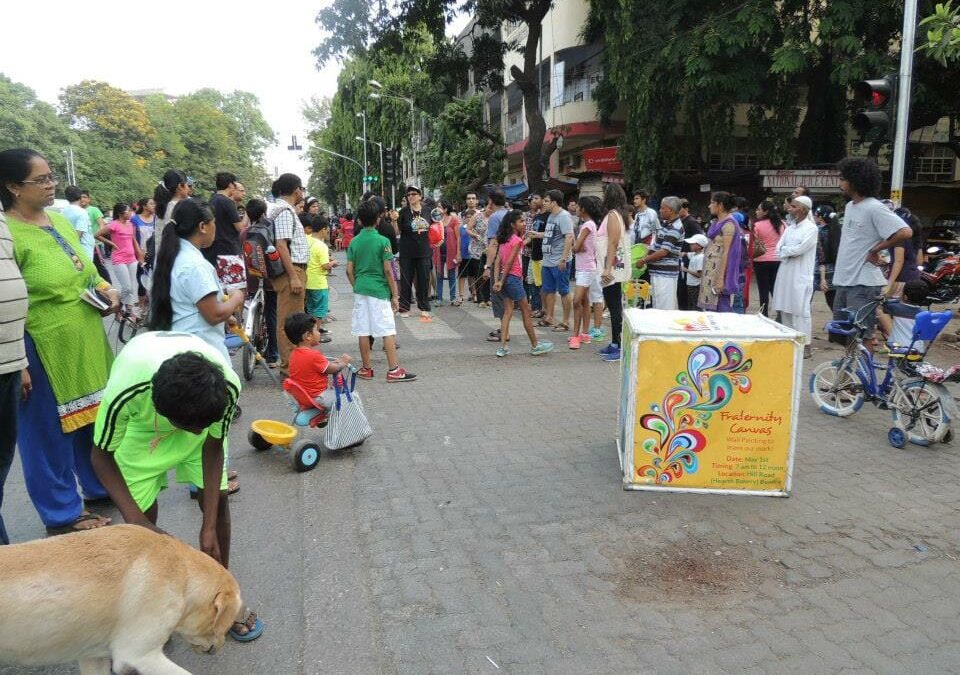
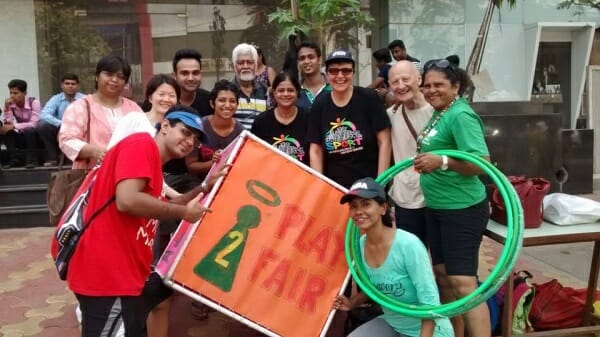 More than 120 young representatives from 25 countries: from Japan to Italy, from Korea to Colombia, from Nepal to Romania, take part in an annual event that takes place within the framework of United World Week which is celebrated around the world and gives a witness that cultural and religious differences are not an obstacle between peoples but a springboard for a more united and fraternal world. This year’s title: “Fabric, Flavour, Festival – discovering fraternity,” focuses on 360° dialogue. Fabric. Face the challenges of dialogue in order to build a more United World: discovering one’s own identity; accepting and respecting others; and having the courage to take the first step. Festival: discovering one another as brothers and sisters. Flavour. Dialogue in action: living the Goldenn Rule, “Do to others what you would have them do to you;” opening the way to reciprocity and sharing. Multiculturalism was the leitmotif of the days in Mumbai. Representatives from the Shanti Ashram (Hindu Movement) and the Rissho Kosei-Kai (Buddhist Movement) joined with young Christians to share moments of brotherhood and service towards Indian young people and civil community.
More than 120 young representatives from 25 countries: from Japan to Italy, from Korea to Colombia, from Nepal to Romania, take part in an annual event that takes place within the framework of United World Week which is celebrated around the world and gives a witness that cultural and religious differences are not an obstacle between peoples but a springboard for a more united and fraternal world. This year’s title: “Fabric, Flavour, Festival – discovering fraternity,” focuses on 360° dialogue. Fabric. Face the challenges of dialogue in order to build a more United World: discovering one’s own identity; accepting and respecting others; and having the courage to take the first step. Festival: discovering one another as brothers and sisters. Flavour. Dialogue in action: living the Goldenn Rule, “Do to others what you would have them do to you;” opening the way to reciprocity and sharing. Multiculturalism was the leitmotif of the days in Mumbai. Representatives from the Shanti Ashram (Hindu Movement) and the Rissho Kosei-Kai (Buddhist Movement) joined with young Christians to share moments of brotherhood and service towards Indian young people and civil community. 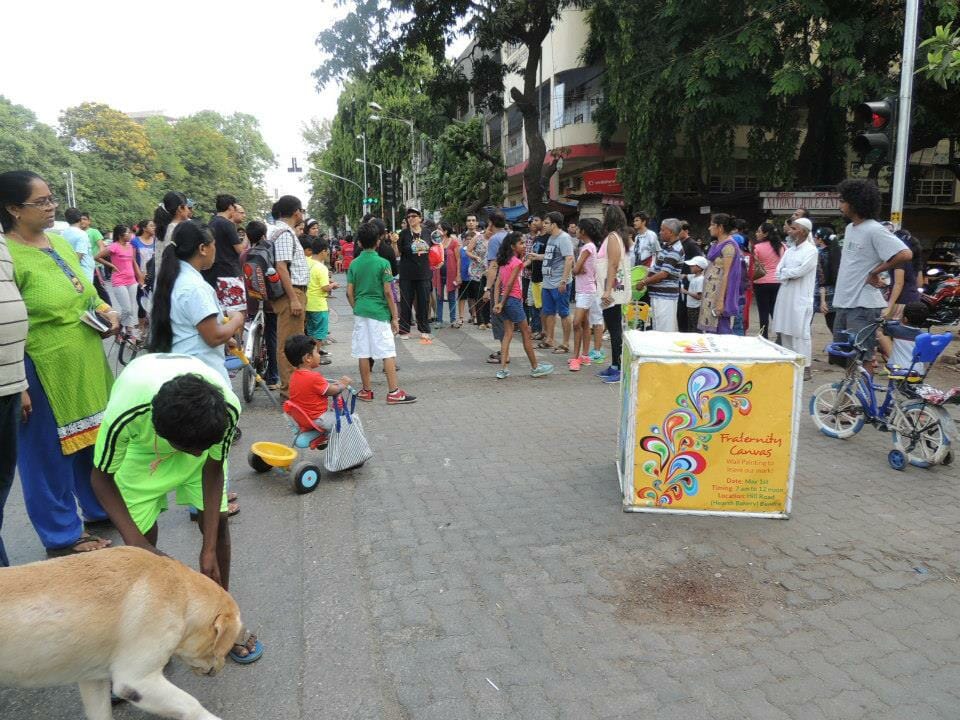 Lawrence from Religions for Peace says that he is here because “we need to show positive things to the world. We need to show the world that fraternity can change history.” Crisfan, a young Hindu, says that he met the Young People for a United World a few years ago: “ever since then, I have wanted to build bridges of fraternity. Religion is never an obstacle in India. Each person follows a path, but we’re all brothers and sisters.” He married a few months ago and also involved his wife in the adventure. The days were busy and intense, sharing in tragic events like that of Nepal where the earthquake produced thousands of victims. Sana and Roshan are also here in Mubmai; they have not been able to contact their families, but seem serene: “we’re sure that God is taking care of them.” Meanwhile, everybody prays. At day’s end we receive some nice news: their family are fine. They fled, but God’s love didn’t force them to wait. Maria Chiara, an Italian, tells us how she had long been hoping for such an experience. “When Christian invited me, I felt like I couldn’t let this opportunity slip by. I’m here to know other young people and to learn to live the other person’s culture as my own.” Christian is Romanian and studies at Sophia University Institute in Italy. After visiting the Holy Land (2013) and Kenya (2014), this year I decided to close my books “and find out how fraternity is lived in a different culture than my own.” Concrete brotherhood is already a living experience at this international site in India, as all sorts of activities in favour of peace are being held in many other parts of the world.
Lawrence from Religions for Peace says that he is here because “we need to show positive things to the world. We need to show the world that fraternity can change history.” Crisfan, a young Hindu, says that he met the Young People for a United World a few years ago: “ever since then, I have wanted to build bridges of fraternity. Religion is never an obstacle in India. Each person follows a path, but we’re all brothers and sisters.” He married a few months ago and also involved his wife in the adventure. The days were busy and intense, sharing in tragic events like that of Nepal where the earthquake produced thousands of victims. Sana and Roshan are also here in Mubmai; they have not been able to contact their families, but seem serene: “we’re sure that God is taking care of them.” Meanwhile, everybody prays. At day’s end we receive some nice news: their family are fine. They fled, but God’s love didn’t force them to wait. Maria Chiara, an Italian, tells us how she had long been hoping for such an experience. “When Christian invited me, I felt like I couldn’t let this opportunity slip by. I’m here to know other young people and to learn to live the other person’s culture as my own.” Christian is Romanian and studies at Sophia University Institute in Italy. After visiting the Holy Land (2013) and Kenya (2014), this year I decided to close my books “and find out how fraternity is lived in a different culture than my own.” Concrete brotherhood is already a living experience at this international site in India, as all sorts of activities in favour of peace are being held in many other parts of the world.
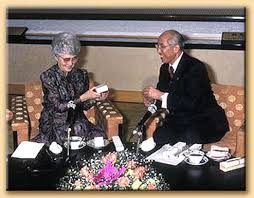
 «There is much talk here about the building of a common European home. We are convinced, however, that although this endeavour is very necessary, it will not be complete unless we think of it as a part of that “global village” that is now the Earth on which we live. This idea came to me also from the concern expressed in your letter about the precarious condition of our natural environment. (…) In fact, there are increasingly alarming analyses from scientists, politicians and international commissions about our ecosystem. People everywhere are launching proposals in an effort to heal our ailing world. (…) In the final analysis, ecology represents a challenge which can be met only by changing mentalities and forming consciences. It has already been demonstrated by very competent scientific studies that neither technical nor economic resources are lacking for the improvement of our environment. Instead, what is lacking is that spiritual supplement, that new love for the human person, which makes all of us feel responsible towards all the others in a common effort to manage the resources of the earth in an intelligent, just and balanced manner.(…) This question of a just distribution of goods in the world, of helping the poorer populations, of the solidarity of the north towards the south, of the rich towards the poor, is the other side of the ecological crisis. If the immense economic resources destined to boost the war industry and a super-production that requires more and more super-consumption, not to mention the waste of goods in the wealthy countries, if these enormous resources would serve, at least in part, to help the developing countries find their dignified way towards development, how much more breathable the atmosphere would be, how many forests would be spared, how many zones would not become desert wastelands, and how many human lives would be saved! (…) And yet, without a new awareness of universal solidarity, we will never take a step forward. (…) If human beings are not at peace with God, the earth itself is not at peace. Religious people are aware of the earth’s “suffering” when human beings do not use it according to the plan of God, but only for selfishness, for an insatiable desire to possess. This selfishness and desire contaminate the environment more and before any other kind of pollution, which is nothing other than its consequence. (…) Now the disastrous consequences force us to look at reality all together, in the perspective of a united world. If we don’t face this problem all together it will not be resolved. (…) If one discovers that all creation is a gift of a Father who loves us, it will be much easier to find a harmonious relationship with nature. And if one discovers also that this gift is for all members of the human family and not only for a few, more attention and respect will be given for something that belongs to the whole of humanity, present and future». Continue Reading
«There is much talk here about the building of a common European home. We are convinced, however, that although this endeavour is very necessary, it will not be complete unless we think of it as a part of that “global village” that is now the Earth on which we live. This idea came to me also from the concern expressed in your letter about the precarious condition of our natural environment. (…) In fact, there are increasingly alarming analyses from scientists, politicians and international commissions about our ecosystem. People everywhere are launching proposals in an effort to heal our ailing world. (…) In the final analysis, ecology represents a challenge which can be met only by changing mentalities and forming consciences. It has already been demonstrated by very competent scientific studies that neither technical nor economic resources are lacking for the improvement of our environment. Instead, what is lacking is that spiritual supplement, that new love for the human person, which makes all of us feel responsible towards all the others in a common effort to manage the resources of the earth in an intelligent, just and balanced manner.(…) This question of a just distribution of goods in the world, of helping the poorer populations, of the solidarity of the north towards the south, of the rich towards the poor, is the other side of the ecological crisis. If the immense economic resources destined to boost the war industry and a super-production that requires more and more super-consumption, not to mention the waste of goods in the wealthy countries, if these enormous resources would serve, at least in part, to help the developing countries find their dignified way towards development, how much more breathable the atmosphere would be, how many forests would be spared, how many zones would not become desert wastelands, and how many human lives would be saved! (…) And yet, without a new awareness of universal solidarity, we will never take a step forward. (…) If human beings are not at peace with God, the earth itself is not at peace. Religious people are aware of the earth’s “suffering” when human beings do not use it according to the plan of God, but only for selfishness, for an insatiable desire to possess. This selfishness and desire contaminate the environment more and before any other kind of pollution, which is nothing other than its consequence. (…) Now the disastrous consequences force us to look at reality all together, in the perspective of a united world. If we don’t face this problem all together it will not be resolved. (…) If one discovers that all creation is a gift of a Father who loves us, it will be much easier to find a harmonious relationship with nature. And if one discovers also that this gift is for all members of the human family and not only for a few, more attention and respect will be given for something that belongs to the whole of humanity, present and future». Continue Reading
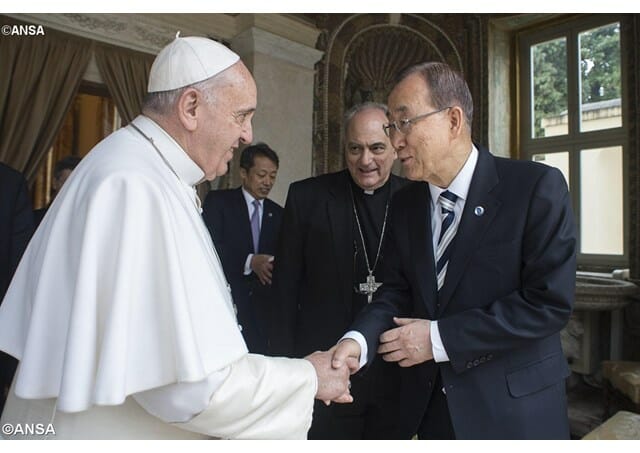

No anticipating the encyclical of Pope Francis on the Creation, but great expectation for the document that will be published at the beginning of June. “The world waits to hear his teaching and what he will say in the encyclical and in his speech before the United Nations Assembly on September 25, 2015,” said Jeffrey Sachs, director of the UN agency for sustainable development (UN Sustainable Development Solutions Networks). He is also one of the promoters of the summit, along with the Pontifical Academy of the Sciences and the Religions for Peace, which has Maria Voce as one of its co-presidents. Also in attendance: were General Secretary of the United Nations Ban Ki-Moon, president of the Italian Republic Sergio Mattarella, and president of the Republic of Equador Rafael Vicente Correa.

The conference brings together scientists, environmentalists, Nobel laureates, political and religious leaders to further the discussion on climate change and sustainable development in view of the encyclical on Creation. The day focused on the moral dimensions of the commitment to sustainable development. This is why the involvement of a wide diversity of religious communities seemed quite an encouraging novelty. For Maria Voce, what emerges from this summit is a “new awareness that, in order to obtain something positive, we must come together, because no one, by himself, has the recipe for getting out of these quite dramatic situations.
It reveals that the human race has within itself the ability to get out of the crisis, but it can be done if there is a synergy of all the components. What is emerging is the need for listening to each other, and acting together.”

Cardinal Turkson, president of the Pontifical Council for Justice and Peace proposed that the answers should not be merely technical, but should be based on the moral dimension and oriented towards the well-being of humankind. Technological, scientific and economic progress has introduced lifestyles that were unimaginable to our predecessors, but it also has “some dark sides and unacceptable costs.” “While global society is defined on the values of consumption and economic factors, the rich of today have grown numb in front of the cry of the poor.” “Out of the 7 billion people living the world, 3 billion are living in conditions of poverty, as an elite consumes the greatest portion of the resources.” The discussion ended on the topic of food, which will be at the centre of the Universal Expo 2015 in Milan, Italy. Turkson strongly denounced the exploitation of workers, the trafficking of human beings and the modern forms of slavery. Pope Francis deplores this “throw-away culture,” the Cardinal recalled, in the “globalisation of indifference.” “The Church is not an expert in science, technology or economy, but it is an expert in humanity. To win the challenge of sustainable development “the same conversion, personal transformation and renewal are needed that were invoked fifty years ago by Paul VI and encouraged by Pope Francis today.
“One concrete possibility is offered by a project inspired by the Eco One Project,” Maria Voce remarked during an interview. “It’s the Earth Cube. Its six sides have catchy phrases that can get us involved in supporting a healthy and sustainable planet: ‘Smile on the world!’ ‘Discover the beauty!’ It also teaches sobriety, taking only what you need as the trees do. It suggest daily actions, concrete gestures: ‘Don’t waste water.’ ‘Recycle!’ The last side says: “Now is the time!” Don’t wait until tommorrow. Simple projects such as these can help us to do what the Pope is inviting us to do.”
With the tenderness of mercy our love can give witness to the reality of God’s love. We experience what we share with others. When the Lord God appeared to Moses on Mount Sinai he declared his identity as: ‘The Lord, a God merciful and gracious, slow to anger, and abounding in steadfast love and faithfulness’ (Ex 34:6). To indicate the nature of this merciful love, the Hebrew Bible uses a word (raḥămîm) that recalls a mother’s womb, the place where life begins. By making himself known as ‘merciful’, God shows that for each thing he has made he is concerned as a mother is for her child. He cares, is near, protects, looks after his creature. The Bible uses a further term (ḥesed) to express other aspects of this love which is mercy: faithfulness, benevolence, goodness, solidarity. Mary in her Magnificat too sings of the Almighty’s mercy that is from generation to generation (see Lk 1:50). Jesus himself spoke to us of God’s love, revealing him as a ‘Father’ close and attentive to our every necessity, keen to pardon, to give all we need: ‘he makes his sun rise on the evil and on the good, and sends rain on the righteous and on the unrighteous’ (Mt 5:45). His love is truly ‘rich’ and ‘great’, as is said in the letter to the Ephesians that give us our Word of Life: ‘But God, who is rich in mercy, out of the great love with which he loved us even when we were dead through our trespasses, made us alive together with Christ.’ What Paul says here is almost a cry of joy born of the contemplation of the extraordinary thing God has done for us. We were dead and he revived us, giving us a new life. The words begin with ‘but’, indicating a contrast with what Paul pointed out earlier. This was the tragic condition of humanity crushed beneath its wrongdoing and sins, prisoner of selfish and wicked desires, under the influence of the powers of evil, in open rebellion against God. In this situation it would have deserved God’s wrath (see Eph 2:1-3). In contrast God, instead of punishing – hence Paul’s utter amazement – gives humanity life again. God does not let himself be governed by wrath, but by mercy and by love. Jesus had already suggested that God acts like this when he told the parable of the Prodigal Son, the younger brother who was welcomed back by his father with open arms after he had sunk into an inhuman life. It was the same with the parable of the Good Shepherd who goes in search for the lost sheep and puts it on his shoulders to bring it back home. And the same can be seen in the Good Samaritan who cares for the wounds of the man who had fallen into the hands of robbers (see Lk 15:11-32; 3-7; 10:30-37). God, a merciful father, symbolized in the parables, has not only forgiven us, but he has given us life itself in his son Jesus, that is, given us the fullness of divine life. And this leads to a hymn of gratitude: ‘But God, who is rich in mercy, out of the great love with which he loved us even when we were dead through our trespasses, made us alive together with Christ.’ This Word of Life ought to make us feel the same joy and gratitude as Paul and the first Christian community. To each one of us, too, God shows himself ‘rich in mercy’ and of ‘great love’, ready to forgive and grant trust again. There is no situation of sin, of suffering, of solitude, where he does not make himself present, does not come alongside us to go with us on our way, does not grant us trust, the possibility of rising up and the strength to start again. At his first ‘Angelus’, on 17 March two years ago, Pope Francis started speaking about the mercy of God, a theme that has become characteristic for him. At that time he said, ‘God’s face is the face of a merciful father who is always patient… he understands us, he waits for us, he does not tire of forgiving us.’ He ended that first brief greeting with the words, ‘He is the loving Father who always pardons, who has that heart of mercy for us all. And let us too learn to be merciful to everyone.’ This points to a practical way to live the Word of Life. If God for us is rich in mercy and of great love, we too are called to be merciful towards others. If he loves those who are bad, who are his enemies, we too ought to learn how to love those who are not ‘lovable’, even our enemies. Did not Jesus tell us, ‘Blessed are the merciful, for they will receive mercy’ (Mt 5:7)? Did he not ask us to be ‘merciful, just as your Father is merciful’ (Lk 6:36)? Paul too invites his communities, chosen and loved by God, to clothe themselves ‘with compassion, kindness, humility, meekness, and patience’ (Col 3:12). If we have believed in God’s love, we too can love in our turn with that love which makes us draw close to every situation of pain and need, that forgives all things, that protects, that knows how to look after the other person. Living in this way we will be able to give witness to God’s love and help those we meet discover that also for them God is rich in mercy and of great love. Fabio Ciardi
 Forty-two professionals of eight different countries in Europe and Latin America accepted the invitation. The event which was held in the Focolare’s Lia town at the outskirts of Buenos Aires, not only hosted the seminar (9-21 March) financed by the European Union, but was also subjected to the study for the creation of a sustainable management and development model of a sustainable place to live in. To coincide with these times when we feel the urgency of questioning ourselves on the environment and promoting the quest for new technologies – with the planet’s survival at stake – the initiative was joined by the group, “Dialogue in Architecture,” a network of scholars and experts of the sector, inspired by the spirituality of the Focolare, given the actuality of the theme.
Forty-two professionals of eight different countries in Europe and Latin America accepted the invitation. The event which was held in the Focolare’s Lia town at the outskirts of Buenos Aires, not only hosted the seminar (9-21 March) financed by the European Union, but was also subjected to the study for the creation of a sustainable management and development model of a sustainable place to live in. To coincide with these times when we feel the urgency of questioning ourselves on the environment and promoting the quest for new technologies – with the planet’s survival at stake – the initiative was joined by the group, “Dialogue in Architecture,” a network of scholars and experts of the sector, inspired by the spirituality of the Focolare, given the actuality of the theme.
By immersing themselves in the discovery of the territory and its structures, the youth started by studying the PRESET (“Participation, Resilience and Employability through Sustainability, Entrepreneurship and Training”), a study project promoted by the association Starkmacher – on the sustainability of the towns of the Focolare – and other partners such as the Fazenda da Esperança (Brazil), Fundación Unisol (Bolivia), New Humanity ((an NGO with Special Consultative Status within the Economic & Social Council of the United Nations) and Economy for tomorrow (Slovenia), and to work specifically on an integral eco-sustainable proposal for the town of Lia.
The youth participated in five thematic workshops guided by the value of fraternity as a lifestyle, and reached an integral eco-sustainable proposal (Ecocity Mariapolis) in which they involved all the inhabitants of the town, and also the youth of the district who attended for an afternoon to recount and speak of the environment.
 The EcoCity Mariapolis that will implement the proposal while respecting the history of the town and carrying out concrete dialogues with its inhabitants, created during the seminar, a biogas system for one of the houses of the town, and explained the procedure to make compost, a study for the installation of a photovoltaic system, for the insulation of the constructions in order to save energy and for the replacement of bulbs with Led lights and many more. This seemed to be a step by step growth in the education on the environment. A set of didactic handouts will be prepared for the inhabitants and the visitors of the Mariapolis, to be diffused also in schools through the Web.
The EcoCity Mariapolis that will implement the proposal while respecting the history of the town and carrying out concrete dialogues with its inhabitants, created during the seminar, a biogas system for one of the houses of the town, and explained the procedure to make compost, a study for the installation of a photovoltaic system, for the insulation of the constructions in order to save energy and for the replacement of bulbs with Led lights and many more. This seemed to be a step by step growth in the education on the environment. A set of didactic handouts will be prepared for the inhabitants and the visitors of the Mariapolis, to be diffused also in schools through the Web.
Also art was utilised for the efficacy of the proposal through the creation of a line of products (hair, hats, etc.) decorated with ethnic motifs and produced with ecologic material, and with a theatre performance connected to the theme.
A pleasant coincidence in those days was that the Dean of Sophia University Institute of Loppiano, Prof. Piero Coda, happened to be visiting the town and said: «I think this is not just a coincidence. Perhaps it is God’s design that is leading to something new, and creating a network of communion, work for solidarity and justice.»
Francesco from Udine gave a significant testimonial: «I work as an architect and am doing a Master’s in almost zero energy buildings. What I found most interesting in this workshop is the fact that people with diverse potentials and specializations are working together, and not only architects like us. I think this is the most enriching part for everyone: starting off with different potentials to reach a common objective which is that of sustainability, not only from the environmental but also from the economic and social points of view.»
Likewise Riccardo, an Italian architect, is convinced of the importance of working together: «I firmly believe that what I can do is but a small part, while together we could reach the objectives that will allow the entire society to exploit the resources well, and create satisfactory wellbeing for everyone including professionals. »
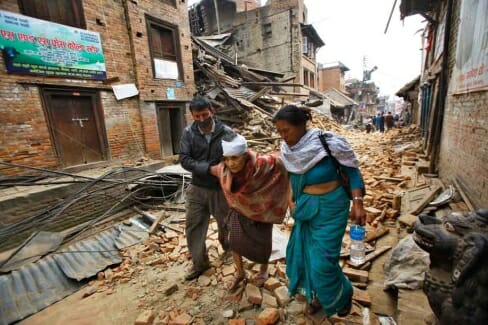
 Some of our Nepalese friends wrote:«The situation is really bad. I myself am alive, but we have lived without a roof above our heads for days and nights. Many have died and others are dying, and many are wounded. Besides the rising number of victims according to the UNICEF estimates, 940 thousand children are at risk, and urgently need healthcare. The Focolare Movement joins the prayers for the people struck, their families, in their requests for consolation in this immense tragedy, and is making the move to gather funds. From Mumbai, where the youth of the Focolare have gathered to prepare for the United World Week – and among which there are three from Nepal – the group has launched an appeal to the Youth for a United World worldwide, to start up a support action for all the people struck by the calamity: «The United World Week – they wrote – may be an immediate occasion to concretely express our support.» Pope Francis, after praying during the Angelus for the victims of the earthquake, urging all to “give their fraternal support,” expressed in a message sent to the Apostolic Nunzio in Nepal, his own personal prayer and support for the Nepalese population. Caritas Nepal, in the meantime, has started up an action plan to face the emergency, but it needs a lot of backup. Tents and food are being distributed: the main problem at the moment is to offer a refuge, to protect the people from the cold and the rain.
Some of our Nepalese friends wrote:«The situation is really bad. I myself am alive, but we have lived without a roof above our heads for days and nights. Many have died and others are dying, and many are wounded. Besides the rising number of victims according to the UNICEF estimates, 940 thousand children are at risk, and urgently need healthcare. The Focolare Movement joins the prayers for the people struck, their families, in their requests for consolation in this immense tragedy, and is making the move to gather funds. From Mumbai, where the youth of the Focolare have gathered to prepare for the United World Week – and among which there are three from Nepal – the group has launched an appeal to the Youth for a United World worldwide, to start up a support action for all the people struck by the calamity: «The United World Week – they wrote – may be an immediate occasion to concretely express our support.» Pope Francis, after praying during the Angelus for the victims of the earthquake, urging all to “give their fraternal support,” expressed in a message sent to the Apostolic Nunzio in Nepal, his own personal prayer and support for the Nepalese population. Caritas Nepal, in the meantime, has started up an action plan to face the emergency, but it needs a lot of backup. Tents and food are being distributed: the main problem at the moment is to offer a refuge, to protect the people from the cold and the rain.
Funds can be deposited directly in the Youth for a United World special bank account: SAVINGS ACCOUNT OF THE CENTRAL SECRETARIAT OF THE YOUTH FOR A UNITED WORLD (GMU) Description: EMERGENCY NEPAL ACCOUNT NAME: PIA ASSOCIAZIONE MASCHILE OPERA DI MARIA Via Frascati 306, Rocca di Papa, 00040 Rome, Italy BANK NAME: BANCA PROSSIMA Piazza Paolo Ferrari 10 20121 Milan Italy IBAN CODE FOR NATIONAL AND INTERNATIONAL TRANSFERS: IBAN IT62 W033 5901 6001 0000 0113 348 BIC BCITITMX
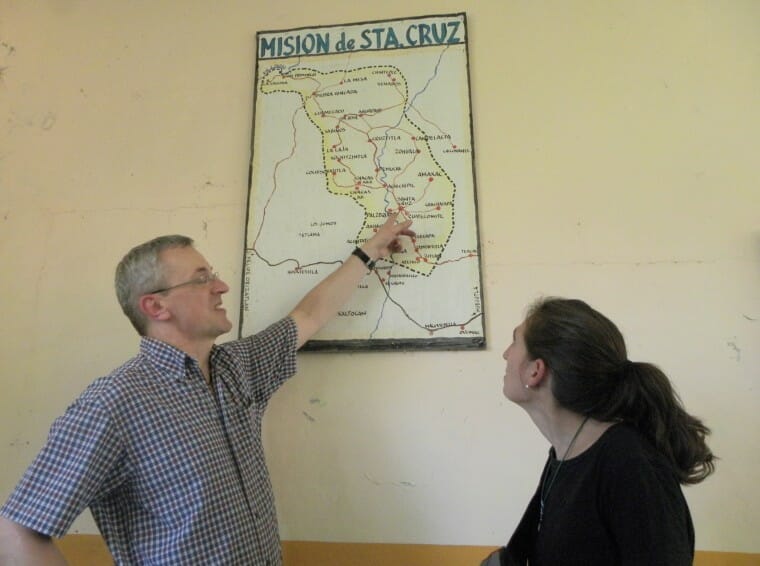
 First time visitors to Santa Cruz de la Sierra are met by an unexpected scene: the exuberant and inviting natural environment, an unfamiliar language, the quite diverse local culture, the poverty, simplicity and endless generosity of the people.
First time visitors to Santa Cruz de la Sierra are met by an unexpected scene: the exuberant and inviting natural environment, an unfamiliar language, the quite diverse local culture, the poverty, simplicity and endless generosity of the people.
One group of young people and families from the Focolare decided to spend Holy Week in Santa Cruz with their friends from the Nahua. Due to the great pastoral need, the local Church gave permission to certain prepared laypeople to act as extraordinary ministers at the discretion of the pastors. They share what happened:
“The sun has just appeared over the horizon and the bus clambers along the mountain roads of east Sierra Madre, carrying 43 young people and families from the Focolare. The journey promises to be long and exciting; the tiredness goes unnoticed because of the great joy. At the road’s end there are brothers and sisters from 33 families of the Nahuas community ready to celebrate Holy Week with us.
Eight hours away from the City of Mexico we are welcomed into Santa Cruz by a generous and humble folk living in the heart of the huasteca hidalgeuense (unfading flower): a humid region with high temperatures, covered with cedar, ebony and mahogany wood trees.
At one of the mission parishes we split up into seven groups and go out to be with the people, to help with the liturgical services in seven communities where the seed of the spirituality of the Focolare has been growing for several years.
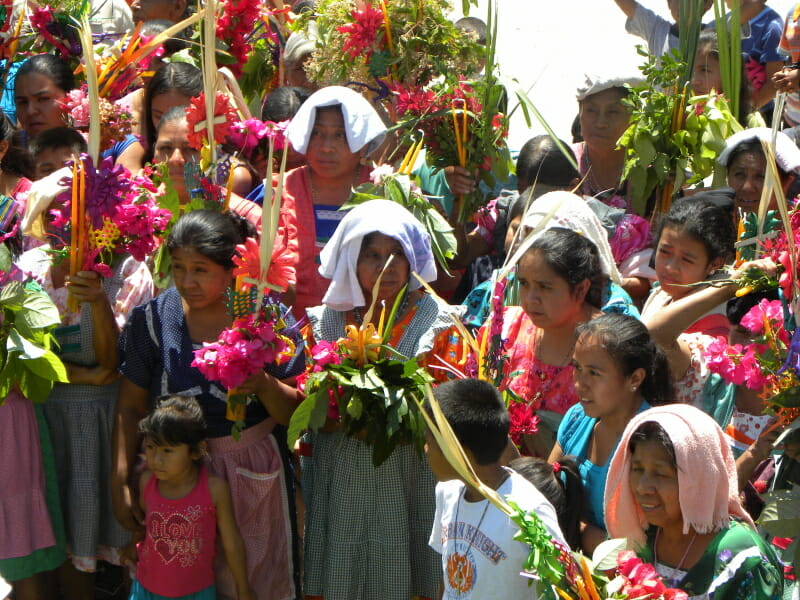 The encounter is overwhelming as the life, faith and bread begin to be shared. Several testimonies of Gospel life are shared, as well as small gift items. After the celebration of the washing of the feet, one of the young people exclaims: “It’s so fantastic to feel like a Christian!” One teenager said she had attended many missions, but “with Jesus among us it’s different; indeed, He’s the one who draws people and that’s why we wanted to attend the meetings and the liturgical celebrations.”
The encounter is overwhelming as the life, faith and bread begin to be shared. Several testimonies of Gospel life are shared, as well as small gift items. After the celebration of the washing of the feet, one of the young people exclaims: “It’s so fantastic to feel like a Christian!” One teenager said she had attended many missions, but “with Jesus among us it’s different; indeed, He’s the one who draws people and that’s why we wanted to attend the meetings and the liturgical celebrations.”
Amongst the many personal encounters, one particularly touched us: We visit an alone and elderly man, who has been immobile for a long time. The state of his hygiene is extremely poor. We bathe him and clean his tiny room; help him to prepare for receiving Jesus in the Eucharist, and give him Holy Communion. The next day, he dies.
Following a Holy Week of intense living and after having experienced mutual giving and receiving in simplicity and generosity, the moment arrives when we must return to Mexico City. During the return trip, many of us remember the words spoken by Chiara Lubich in the Basilica of Guadalupe in 1997: “Inculturation requires an exchange of gifts.”
Seeing the enthusiasm of the young misioneros and the members of the communities we visited, there is new hope that the Misión in Santa Cruz will not remain an isolated event, but the sign of a new beginning of a process of increased giving by the Focolare in Mexico.”
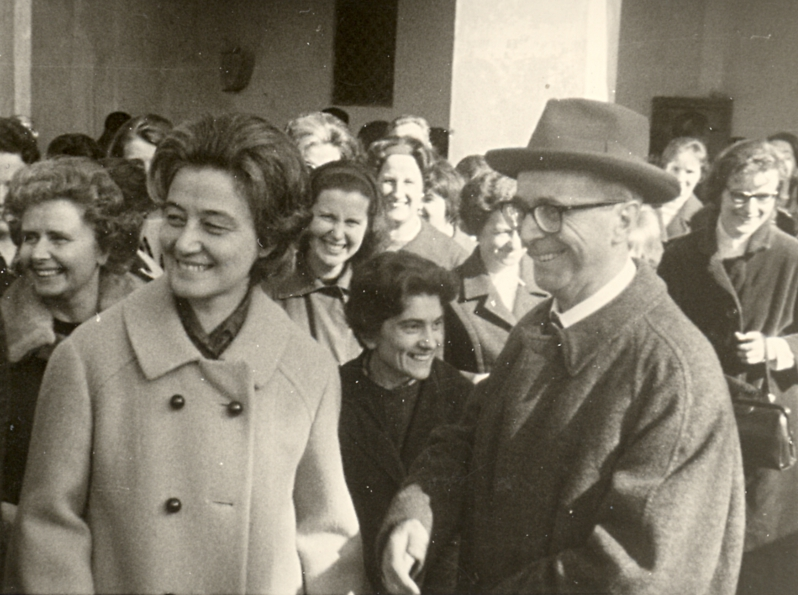
 “This event, like all things of God, began from a humble seed. Silvia Lubich was the daughter of a wine merchant who the economic crisis of the Second World War had reduced to being a modest city worker. He was the husband of a housewife from Trent who, as a young woman, had worked in the print shop of Cesare Battisti. They were a Catholic couple like many others from Trent: simple and direct, without a lot of pretensions. They brought four children into the world, a boy, the firstborn, and three girls. The eldest daughter, Silvia, was born on January 22, 1920. They raised them all in the Catholic faith which since her infancy had shaped Silvia in a straightforward piety. It was straightforward in the sense that it did not allow any compromises: it didn’t allow her to divide her desire between God and the world; to think about good and evil; to show one thing while hiding another. There was God, and God was everything: so one had to belong totally to Him; to do His will like a ray of sun that leaped down from heaven to rest upon earth.” So begins the Story of Light, the story of Chiara Lubich written by one of the main protagonists of the events it describes: Igino Giordani, an eminent figure in Italian politics and culture, and also co-founder of the Focolare Movement. “It is never easy for a work to become a masterpiece,” Director of the Igino Giordani Centre, Alberto Lo Presti writes in the introduction to the first installment. “What then of a book that would contend for this position with a hundred other books written by Giordani? But Story of Light never saw the light. Not only that: it remained unknown even to those who have preserved it over the years. Giordani himself had asked them to wait – whereas most authors would have preferred the opposite; that is, to be recognized especially for their best works.” “Story of Light is not based on historiographic research. It could be described as a recounting of the miraculous intervention brought about by the Holy Spirit – visible in the person and actions of Chiara Lubich – in twentieth century history. In other words, it is comprised of a series of narrative portraits in which Chiara’s biographical sketch is intertwined with God’s plan for humankind, whose ideals had been afflicted and social systems divided and devastated by world wars. This is why, in the subtle interweaving of events in Story of Light, we recognize some of the basic elements in Giordani’s own complex personality. He experienced first-hand all the main dramatic events of the twentieth century, having been wounded in the war, having undergone exclusion because of his ideas, and having had to accept exclusion from civil society. He was a man of faith who worked both in Church and culture, aware that the radical evil would be defeated by a new Christian spirit that he set out to discover. He met Chiara Lubich in September 1948 and found in her the light he had been looking for. He followed her, placing at the disposal of the Focolare founder all of his intelligence and will. He never had doubts about the strength and pre-eminence of the figure of Chiara for the Church, society, current history, and the future. Therefore, even had he have wanted to, Giordani could never have written a complete, objective, methodologically flawless story of Chiara Lubich. His human and spiritual involvement could not allow him that.” “The author had written many volumes on great spiritual figures: Catherine of Siena, Ignatius of Loyola, Magdalene of Canossa, Contardo Ferrini, Francis of Paola, Vincent de Paul, Francis de Sales, Francis of Assisi, to mention a few of his works. They formed a gallery of extraordinary people from diverse times and backgrounds. The place of honor in this rich array was assigned to Chiara Lubich, whose story Giordani called his “masterpiece.” At the age of fifty four when history called him to meet Chiara, he did not enter into the relationship without a spiritual preparation. He knew how to measure the religious greatness of an ideal, just as he had the tools for testing the spiritual size and strength of a mystical intuition. For this reason . . .it is likely that Giordani felt a paramount duty of attesting to who Chiara really was. Moreover, he took on this particular role from the first moments of his visits with Chiara and the first small group of focolarine. With his learning, he was well able to reveal the importance and newness of the figure of Chiara to the young men and women who were her followers.” “Giordani lived through difficult moments during which Chiara Lubich and the Focolare were under the magnifying glass of the Congregation of the Holy Office. From that period – the 1950s – and for many years to come, a widespread attitude of prudent discretion was maintained around the figure of Chiara. It may have been necessary to hold back any sentiments of esteem and affection for Chiara, but for Giordani there was never any doubt that the truth about her had to be put in writing and handed on. Hence, Story of Light, his masterpiece.” Introduction to Story of Light (complete text) – Published by Nuova Umanità, gennaio-marzo 2015
“This event, like all things of God, began from a humble seed. Silvia Lubich was the daughter of a wine merchant who the economic crisis of the Second World War had reduced to being a modest city worker. He was the husband of a housewife from Trent who, as a young woman, had worked in the print shop of Cesare Battisti. They were a Catholic couple like many others from Trent: simple and direct, without a lot of pretensions. They brought four children into the world, a boy, the firstborn, and three girls. The eldest daughter, Silvia, was born on January 22, 1920. They raised them all in the Catholic faith which since her infancy had shaped Silvia in a straightforward piety. It was straightforward in the sense that it did not allow any compromises: it didn’t allow her to divide her desire between God and the world; to think about good and evil; to show one thing while hiding another. There was God, and God was everything: so one had to belong totally to Him; to do His will like a ray of sun that leaped down from heaven to rest upon earth.” So begins the Story of Light, the story of Chiara Lubich written by one of the main protagonists of the events it describes: Igino Giordani, an eminent figure in Italian politics and culture, and also co-founder of the Focolare Movement. “It is never easy for a work to become a masterpiece,” Director of the Igino Giordani Centre, Alberto Lo Presti writes in the introduction to the first installment. “What then of a book that would contend for this position with a hundred other books written by Giordani? But Story of Light never saw the light. Not only that: it remained unknown even to those who have preserved it over the years. Giordani himself had asked them to wait – whereas most authors would have preferred the opposite; that is, to be recognized especially for their best works.” “Story of Light is not based on historiographic research. It could be described as a recounting of the miraculous intervention brought about by the Holy Spirit – visible in the person and actions of Chiara Lubich – in twentieth century history. In other words, it is comprised of a series of narrative portraits in which Chiara’s biographical sketch is intertwined with God’s plan for humankind, whose ideals had been afflicted and social systems divided and devastated by world wars. This is why, in the subtle interweaving of events in Story of Light, we recognize some of the basic elements in Giordani’s own complex personality. He experienced first-hand all the main dramatic events of the twentieth century, having been wounded in the war, having undergone exclusion because of his ideas, and having had to accept exclusion from civil society. He was a man of faith who worked both in Church and culture, aware that the radical evil would be defeated by a new Christian spirit that he set out to discover. He met Chiara Lubich in September 1948 and found in her the light he had been looking for. He followed her, placing at the disposal of the Focolare founder all of his intelligence and will. He never had doubts about the strength and pre-eminence of the figure of Chiara for the Church, society, current history, and the future. Therefore, even had he have wanted to, Giordani could never have written a complete, objective, methodologically flawless story of Chiara Lubich. His human and spiritual involvement could not allow him that.” “The author had written many volumes on great spiritual figures: Catherine of Siena, Ignatius of Loyola, Magdalene of Canossa, Contardo Ferrini, Francis of Paola, Vincent de Paul, Francis de Sales, Francis of Assisi, to mention a few of his works. They formed a gallery of extraordinary people from diverse times and backgrounds. The place of honor in this rich array was assigned to Chiara Lubich, whose story Giordani called his “masterpiece.” At the age of fifty four when history called him to meet Chiara, he did not enter into the relationship without a spiritual preparation. He knew how to measure the religious greatness of an ideal, just as he had the tools for testing the spiritual size and strength of a mystical intuition. For this reason . . .it is likely that Giordani felt a paramount duty of attesting to who Chiara really was. Moreover, he took on this particular role from the first moments of his visits with Chiara and the first small group of focolarine. With his learning, he was well able to reveal the importance and newness of the figure of Chiara to the young men and women who were her followers.” “Giordani lived through difficult moments during which Chiara Lubich and the Focolare were under the magnifying glass of the Congregation of the Holy Office. From that period – the 1950s – and for many years to come, a widespread attitude of prudent discretion was maintained around the figure of Chiara. It may have been necessary to hold back any sentiments of esteem and affection for Chiara, but for Giordani there was never any doubt that the truth about her had to be put in writing and handed on. Hence, Story of Light, his masterpiece.” Introduction to Story of Light (complete text) – Published by Nuova Umanità, gennaio-marzo 2015
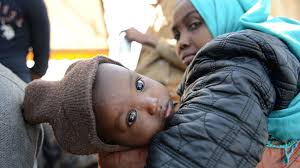

Photo credit: WFP/Abeer Etefa
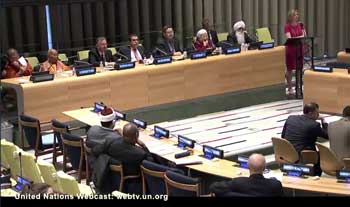
Video of High-Level Thematic Debate
What are the religions in today’s world? Many see them as obstacles to peace, the residue of ages past that today are the cause of violent extremism. What would the world really be more peaceful without the religions? The High-Level Thematic Debate on Promoting Tolerance and Reconciliation suddenly became animated. The second day of the UN meeting offered some directives. During the opening address, Secretary General Ban Ki-moon proposed an advisory committee formed by the leaders of the world’s religions, to help the United Nations find solutions to the current conflicts, often between the followers of different religions. The plenary session that followed included testimonies from 15 religious leaders. All present agreed that religions should help to build peace, moving beyond mere tolerance to mutual acceptance, with the awareness that there are already people around the world who are already living like this in their daily lives. In her talk, Maria Voce recalled the long experience lived by the Focolare Movement: “The encounter between religions and cultures is an ongoing and fruitful experience that is not limited to tolerance, mere recognition of differences, and it goes beyond reconciliation, although that is fundamental, and it creates what could be called a new broader and shared common identity.” And this takes place in contexts that have been struck by serious crises, such as in Algeria, Syria, Iraq, Lebanon, the Democratic Republic of the Congo, Nigeria and the Philippines. 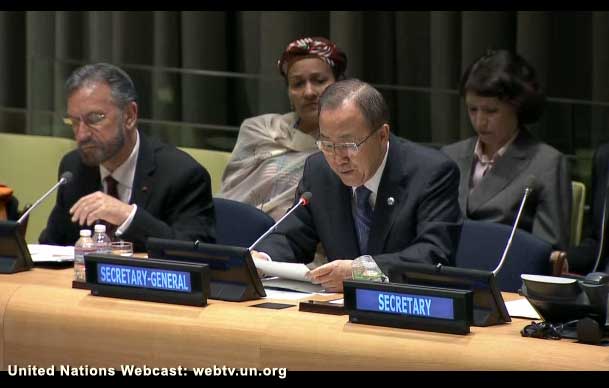 In response to the challenges and to the violence, she proposed an “extremism in dialogue,” that is, a dialogue requiring maximum engagement “that is risky, demanding, challenging, that aims at severing the roots of misunderstanding, fear and resentment.” Then she invited all to aim for a “a universal civilization that leads all peoples to consider themselves part of “civilization of alliance; a universal civilization which enables peoples to see themselves as part of a great happening, which is both varied and fascinating, that is humankind’s journey towards unity. She invited the UN to rethink its own calling, to reformulate its mission in order to be “an institution which truly works towards unity among nations, while respecting their strong identities.” According to Maria Voce, to say that religions are the cause of the tensions is to have a too restricted vision of the situation. What we are witnessing in many areas of the world, from the Middle East to Africa, has very little to do with religion, but has much to do with the structures marked by the culture war. From any point of view, in these cases we should not speak so much about wars of religion but more concretely, realistically and prosaically, about the religion of war. Everyone was in agreement: religions lead to peace, if not, they are instrumentalised for other ends. And so the vocation of religions is clearly stated: The Golden Rule, the foundational inspiration of all religions, which unites them, the idea of one universal human family.
In response to the challenges and to the violence, she proposed an “extremism in dialogue,” that is, a dialogue requiring maximum engagement “that is risky, demanding, challenging, that aims at severing the roots of misunderstanding, fear and resentment.” Then she invited all to aim for a “a universal civilization that leads all peoples to consider themselves part of “civilization of alliance; a universal civilization which enables peoples to see themselves as part of a great happening, which is both varied and fascinating, that is humankind’s journey towards unity. She invited the UN to rethink its own calling, to reformulate its mission in order to be “an institution which truly works towards unity among nations, while respecting their strong identities.” According to Maria Voce, to say that religions are the cause of the tensions is to have a too restricted vision of the situation. What we are witnessing in many areas of the world, from the Middle East to Africa, has very little to do with religion, but has much to do with the structures marked by the culture war. From any point of view, in these cases we should not speak so much about wars of religion but more concretely, realistically and prosaically, about the religion of war. Everyone was in agreement: religions lead to peace, if not, they are instrumentalised for other ends. And so the vocation of religions is clearly stated: The Golden Rule, the foundational inspiration of all religions, which unites them, the idea of one universal human family.  In the roundtable at the afternoon plenary, which was moderated by BBC’s, Laura Trevelyan, Rabbi David Rosen asked why so many young people feel drawn to extremism: “Perhaps because they are searching for their own identity, or for some meaning in life.” “You normally do not mention God at the United Nations,” Rabbi Arthur Schneier dared to remark: “How are we to deal with this problem – that the UN has to be neutral – when 5 of the 7 billion people on this earth belong to a religion?” For Bhai Sahib Mohinder Singh, Sikh from Birmingham: “God is omnipresent, in each one of us, therefore you cannot say that God is not here.” Maria Voce: “You speak of God when you speak of justice, sharing all the goods of the earth, sustainable development; you speak of God when you think of what we are preparing for the future generations. This is speaking of God. It is not necessary to speak of him in the abstract.” How can we preserve the integrity of interreligious dialogue? Are the religious leaders here renouncing something by coming here to the UN to talk about resolving conflicts? “I’m not renouncing anything,” affirmed Maria Voce. “I’ve come out of love, thinking about bringing my contribution of love to humanity. I’ve felt enriched by this possibility.” She concluded with a glance towards the new generations: “Returning home, what I will do will be to support the activities of the young and the very young, because I believe in their prophetic power.” Then she gave the floor to Ermanno Perotti, a young Italian had accompanied her on her visit to the United States. The twenty five year-old, with a Master’s Degree in Development Economics, used the occasion to present the l’Atlas of Universal Fraternity, a dossier of projects that promote universal fraternity in all corners of the world. Maria Voce added: “With the hope that one day even these ‘fragments of fraternity’ can be presented to the United Nations,” and that the United Nations will gather them. With this vision it becomes clear that religions have a great opportunity, but also a great task: to build peace and respond to the challenges with “extreme dialogue” rather than closing in on their own group. Susanne Janssen, New York
In the roundtable at the afternoon plenary, which was moderated by BBC’s, Laura Trevelyan, Rabbi David Rosen asked why so many young people feel drawn to extremism: “Perhaps because they are searching for their own identity, or for some meaning in life.” “You normally do not mention God at the United Nations,” Rabbi Arthur Schneier dared to remark: “How are we to deal with this problem – that the UN has to be neutral – when 5 of the 7 billion people on this earth belong to a religion?” For Bhai Sahib Mohinder Singh, Sikh from Birmingham: “God is omnipresent, in each one of us, therefore you cannot say that God is not here.” Maria Voce: “You speak of God when you speak of justice, sharing all the goods of the earth, sustainable development; you speak of God when you think of what we are preparing for the future generations. This is speaking of God. It is not necessary to speak of him in the abstract.” How can we preserve the integrity of interreligious dialogue? Are the religious leaders here renouncing something by coming here to the UN to talk about resolving conflicts? “I’m not renouncing anything,” affirmed Maria Voce. “I’ve come out of love, thinking about bringing my contribution of love to humanity. I’ve felt enriched by this possibility.” She concluded with a glance towards the new generations: “Returning home, what I will do will be to support the activities of the young and the very young, because I believe in their prophetic power.” Then she gave the floor to Ermanno Perotti, a young Italian had accompanied her on her visit to the United States. The twenty five year-old, with a Master’s Degree in Development Economics, used the occasion to present the l’Atlas of Universal Fraternity, a dossier of projects that promote universal fraternity in all corners of the world. Maria Voce added: “With the hope that one day even these ‘fragments of fraternity’ can be presented to the United Nations,” and that the United Nations will gather them. With this vision it becomes clear that religions have a great opportunity, but also a great task: to build peace and respond to the challenges with “extreme dialogue” rather than closing in on their own group. Susanne Janssen, New York
Video of Round Table Debate: http://webtv.un.org/high-level-thematic-debate Press Release Press Area
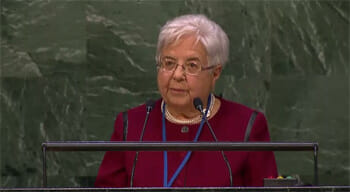

To risk your own life so as to relieve the suffering of the poor. This was Maria Voce’s invitation as she spoke of the last terrible phase of the Second World War, when in 1943 “a group of young women got together in the small city of Trent in northern Italy. While their city was being bombed, those young people, who were guided by a young teacher named Chiara Lubich, and urged on by a new understanding of the radical nature of Gospel love, decided to risk their lives to relieve the suffering of the poor.”
A choice many people make today too, helping to regenerate the fabric of society: Maria Voce referred to the refugee camps in Lebanon, Syria, Jordan and Iraq; the slums surrounding some huge cities and the united strength of those who “introduce into the destructive cycle of conflict a commitment to regenerate the fabric of society, by doing – according to the vocabulary of this organization would say – peace-building action”. She affirmed: “Those young women decided to break the vicious circle of violence by responding with attitudes and actions which in the atmosphere of conflict might have seemed unrealistic or even irrelevant. However, they were not and they are not!”
“Today too we are experiencing very serious political, institutional, economic and social breakdown, which requires equally deep-seated responses, able to change the prevailing paradigm. It seems that conflict and violence prevail in many parts of the world, affecting innocent people, guilty only of being in disputed territory, or belonging to a particular ethnicity or adhering to a specific religion.”
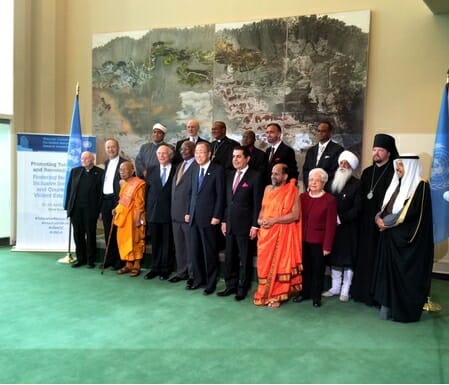 The encounter between cultures forms a new identity: “In the Focolare Movement, which I have the honour to represent – Maria Voce said – the encounter between cultures and religions (Christianity, Islam, Judaism, Buddhism, Hinduism and Traditional Religions) is an ongoing and fruitful experience not confined to tolerance or the mere recognition of diversity. It goes beyond reconciliation, essential as that is, to create, so to speak, a new identity, one that is broader, more general and shared. It is an effective dialogue which brings together people of very different beliefs, including non-religious beliefs. It spurs us to see what the real needs are and to respond together to the most difficult challenges in society, culture, economics and politics, as our commitment to a more united and socially inclusive world. This is happening in places which have been or are at present characterized by very serious crises, such as Algeria, Syria, Iraq, Lebanon, the Democratic Republic of Congo, Nigeria and the Philippines.”
The encounter between cultures forms a new identity: “In the Focolare Movement, which I have the honour to represent – Maria Voce said – the encounter between cultures and religions (Christianity, Islam, Judaism, Buddhism, Hinduism and Traditional Religions) is an ongoing and fruitful experience not confined to tolerance or the mere recognition of diversity. It goes beyond reconciliation, essential as that is, to create, so to speak, a new identity, one that is broader, more general and shared. It is an effective dialogue which brings together people of very different beliefs, including non-religious beliefs. It spurs us to see what the real needs are and to respond together to the most difficult challenges in society, culture, economics and politics, as our commitment to a more united and socially inclusive world. This is happening in places which have been or are at present characterized by very serious crises, such as Algeria, Syria, Iraq, Lebanon, the Democratic Republic of Congo, Nigeria and the Philippines.”
The Focolare President dispensed with half measures. “If violent extremism exists – she stated – (…) our response must be similarly radical, but one that is structurally different, by which I mean “extremism in dialogue”! A dialogue which requires the highest level of engagement, which is risky, demanding, challenging and which aims to sever the roots of incomprehension, fear and bitterness.”
The civilisation of alliance: referring to the United Nations “Alliance of Civilizations”, one of the promotors of this event, Maria Voce asked “whether, nowadays, we could get closer to the roots of this new outlook and focus not only on an alliance of civilizations but on what might be called the “civilization of alliance”; a universal civilization which enables peoples to see themselves as part of a great happening, which is both varied and fascinating, that is humankind’s journey towards unity. A civilization which makes dialogue the pathway to recognizing each other as brothers and sisters, as free and equal.”
Among the many organisations represented at the debate, she mentioned New Humanity, the NGO which represents the Focolare Movement at the UN; and regarding the United Nations Organization itself she posed the question:
“Shouldn’t the United Nations Organization perhaps reconsider its own vocation, and reformulate its own fundamental mission? What does being a “United Nations” organization mean today, if not an institution which truly works towards unity among nations, while respecting their strong identities? It is certainly essential to actively maintain international security but, although security is vital, it is not necessarily the same thing as peace.
Conflicts within nations and international conflicts; the deep divisions we are aware of at world level, together with the great local and global injustices, in fact require a true conversion in the actions and choices made in the field of global governance, to put into practice the motto formulated by Chiara Lubich, and launched in this very place in 1997, “love your neighbor’s country as your own” so as to build up universal fraternity.
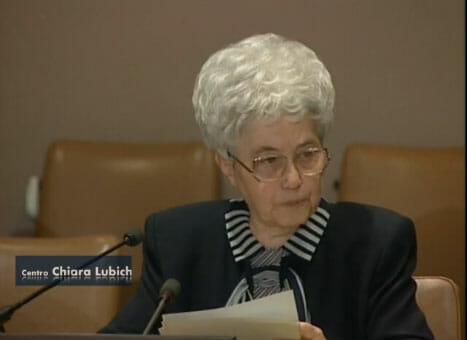
Chiara Lubich: “Toward a Unity of Nations and a Unity of Peoples” – United Nations Headquarters (New York), 28 May 1997
War is irreligion: “Lastly, we cannot give ground to those who attempt to describe current conflicts as “wars of religion” – Maria Voce went on. “War is by definition irreligion. Militarism, economic dominance and intolerance at all levels are causes of conflict, together with many other social and cultural factors among which religion is often only an unfortunate pretext. What we are witnessing in many areas of the world, from the Middle East to Africa, including the tragic deaths of hundreds of people fleeing wars who are shipwrecked in the Mediterranean, has very little to do with religion. From any point of view, in these cases we should not speak so much about wars of religion but more concretely, realistically and prosaically, about the religion of war.
What can be done? Quoting Chiara Lubich, Maria Voce invited the audience to have the courage to “invent peace”. “There are many signs that a new awareness may finally emerge, out of this serious international situation, of the need to work together for the common good, (…) and with the courage to ‘invent peace’. The time for ‘holy wars’ is over. War is never holy, it never has been. God does not want it. Only peace is truly holy because God himself is peace.”
She ended with reference to the Golden Rule which reflects the foundational inspiration of religions and unites them, so that they should “not [be] a tool used by other powers, even for the noblest aims; or precepts studied so as to resolve conflicts or crises, but rather a spiritual process which can be lived and becomes a community able to share and give meaning to the joys and sufferings of people today, channelling everything towards the realization of one universal human family.”
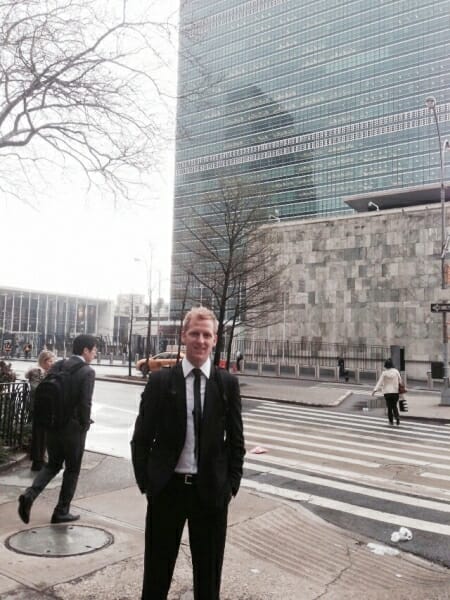
 The UN headquarters with the thousands of people who work there, heads of state and other VIPs, going there would be a dream for many people. Ermanno Perotti, a 25-year-old student of economics and development is there now, but not as one of the many visitors who wander along the endless corridors with their guide. He was asked to accompany Maria Voce, President of the Focolare Movement who had been invited, as one of the religious leaders to speak during the High Level Debate on “Promoting Tolerance and Reconciliation: Fostering peaceful, Inclusive Societies and Countering Violent Extremism.”
The UN headquarters with the thousands of people who work there, heads of state and other VIPs, going there would be a dream for many people. Ermanno Perotti, a 25-year-old student of economics and development is there now, but not as one of the many visitors who wander along the endless corridors with their guide. He was asked to accompany Maria Voce, President of the Focolare Movement who had been invited, as one of the religious leaders to speak during the High Level Debate on “Promoting Tolerance and Reconciliation: Fostering peaceful, Inclusive Societies and Countering Violent Extremism.”
The impression of Perotti is shared by many: the representative of each nation gives his or her contribution, many beautiful words and positive initiatives – but they seem almost isolated and each one appears to see this meeting as a platform to promote their own ideas. But what I find a bit hard to digest is that they don’t really listen to one another. But what does attract me is to see their efforts to fill this emptiness with true listening and dialogue. With this vision that he learnt from the life of the young people of the Focolare, he understood the attraction of taking on a commitment in politics so as to bring about truer relationships.
However, on the subject of how to prevent violence and fanaticism, almost all the speakers were in agreement, that there is no other way but dialogue among cultures. “I would love to run a school on dialogue right here at the UN” says Perotti. In fact 90% of the speakers emphasised the need for education and many spoke of the need to give women a voice and to fight against poverty.
Many spoke of the hope they have in young people and we have to start there. Perotti wasn’t completely happy: “It’s always adults who speak about young people, where are the young people who speak about the young people?” He thinks his generation is already prepared for a multicultural future: “I grew up with this idea. In my class there are people of 10 different nationalities and 4 religions. We can show the world how we live in a spontaneous way in our daily lives.”
Today is the high point for him, to be part of a panel at the UN. Ermanno Perotti is not worried at all: “Speaking with Maria Voce we were saying that we wanted to live these days first of all as an experience of God. Today too at the UN will be an experience of God. As some of the speakers said today. In the end everything is summed up in the Golden Rule which means love of neighbor. So going there with the President, it’s simple because you go to love, to be one body with all the young people in the world”.
Susanne Janssen, New York
Live streaming at http://webtv.un.org/live/

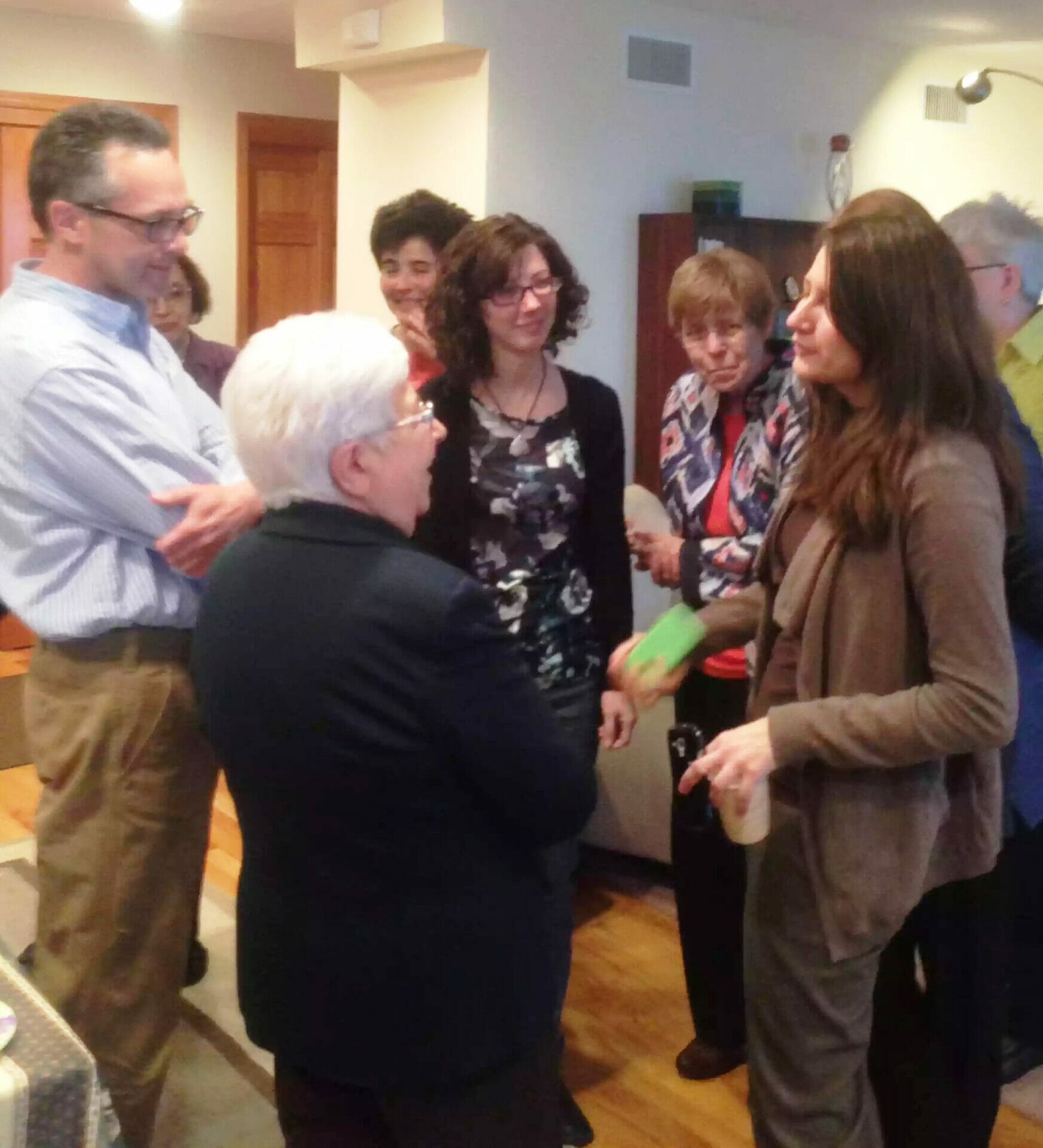 Today marks the beginning of the debate of the United Nations: “Promoting Tolerance and Reconciliation: Fostering peaceful, Inclusive Societies and Countering Violent Extremism”. Among the religious leaders invited to give their contribution is Maria Voce, President of the Focolare Movement. We asked her three questions before she entered the headquarters of the UN.
Today marks the beginning of the debate of the United Nations: “Promoting Tolerance and Reconciliation: Fostering peaceful, Inclusive Societies and Countering Violent Extremism”. Among the religious leaders invited to give their contribution is Maria Voce, President of the Focolare Movement. We asked her three questions before she entered the headquarters of the UN.
How do you feel before participating in this high level debate with representatives of 193 nations?
«I am quite at peace. What is often missing in these organizations is precisely the witness of what is already happening to bring about peace. My impression is that people often feel isolated and they need to be aware that someone else is out there with them, working for the same aims as they are. With such a great ideal as the one Chiara Lubich has given us, we do not work only for reconciliation or only for social justice but these are steps on the way towards unity».
If we look at the world today some might think that religions are the bearers more of division than of peace…
«Certainly religions are not supporters of war, none of them. The word religion means bond, it’s a bond between people, how can a religion make war? War is born in the hearts of people and people, whatever religion they belong to can be good or wicked. Instead religion is often exploited under the pretext of justifying a motivation that is anything but religious and is in fact inhuman, the desire for power, overthrowing the weak, selling one’s own merchandise including arms. The root of war certainly doesn’t lie in religion but in other motivations which are basically always egoistic».
When we look at today’s conflicts, for example in the Middle East or in Nigeria, are you still optimistic that peace is possible?
«I cannot help being an optimist because Jesus is peace. And since we follow Jesus we have to believe that peace is possible. It is true that Jesus said ‘I have come to bring the sword’ which means we have to take a stand too. I think that religions can help to reawaken the conscience of humanity: peace isn’t just one good among many but without peace all the other goods are useless. We can work for peace if we do it all together, both the rich and the poor, those who have power and those who do not, people who are religious as well as those who do not identify themselves with any religion. We have to commit ourselves to building these relationships of peace in the whole human family where we are all equal and therefore we should all witness to this equality».
The initiative for this high level debate at the United Nations in New York came from the President of the General Assembly, Sam Kutesa, the Secretary General Ban Ki Moon and the High Representative of the Alliance of Civilizations Nassir Abdulaziz Al-Nasser. Today’s topic is Strategies for fostering inclusive societies. Tomorrow, leaders representing various religions will be invited to give their witness to the role played by religions in building bridges of tolerance and reconciliation.
Susanne Janssen, New York
You can follow parts of the program on live streaming of the United Nations’s TV at http://webtv.un.org/live/
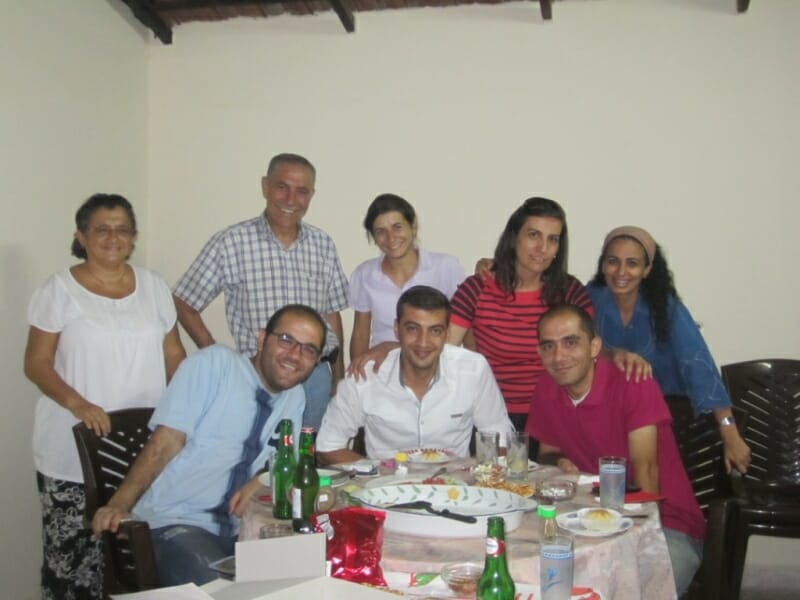
 With a lively gaze and gentle smile that veils some sadness, Ghada describes the tragic events taking place in the country she has chosen as her home. Ghada, what made you return to Syria?
With a lively gaze and gentle smile that veils some sadness, Ghada describes the tragic events taking place in the country she has chosen as her home. Ghada, what made you return to Syria?
At the age of tewenty I left my family and country to follow God. In September 2013 when I requested to return to Syria, I felt the same impetus as before. I was frightened by the thought that I might die, but what I felt more strongly was the attraction to go back and live alongside the people whom I had met years earlier, to help them feel that they were not abandoned. I was urged by a desire to share their life, their fears, their unstable daily lives, because the bombs rain down when you least expect it.
But isn’t there any warning before bombardments, so that you can take cover somewhere?
There are no sirens announcing the strikes, nor is there any strategy in place that would allow you to know when the rockets will hit. On the other hand, this is now the fifth year of war and one cannot stay barricaded forever. You can stop for a day, a month, but then even through the mortars thunder, life must go on: the children go to school and parents work to support their families. Everything goes on under absolute risk and uncertainty. I lived the same drama when I was in the focolare house in Lebanon, but here it is far worse, much more difficult. Here you breathe terror and violence on all sides.
You had already been to Syria in the past. Can you tell us about the changes you’ve seen?
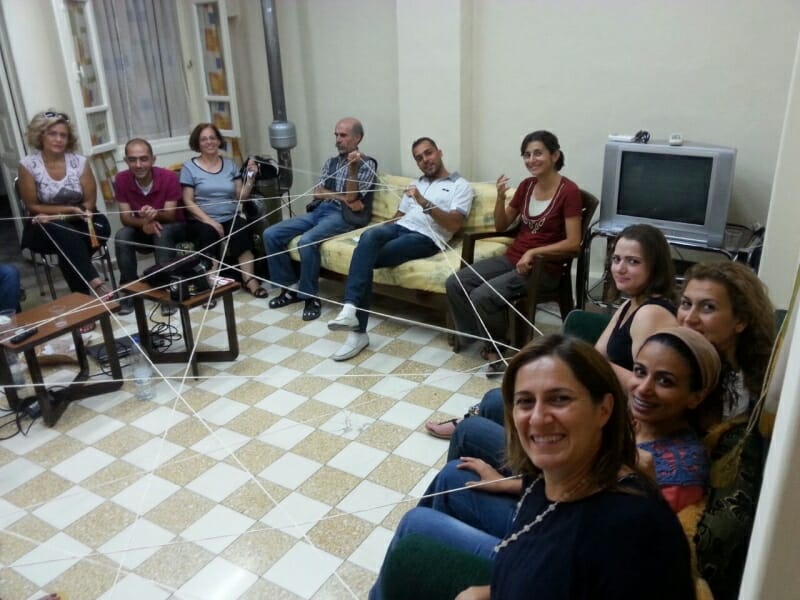 When I was in the focolar in Lebanon, I visited Aleppo, Homs and Damascus because there were still many people who wished to stay in contact with the Focolare. Because of the inner depth and sensitivity of the Syrian people, many meaningful relationships were created. We shared our Christian values that are so strongly felt in this place. Despite the plurality of Churches and rites, which is so typical of this land, there was still harmony amongst all. In 1994 when it was decided to open a focolare in Aleppo, two other focolarine and I were sent to open it. I was there for 9 years. Those were years of prosperity for Syria. The country didn’t have a public debt and the PIL was constantly rising. In the evenings we young women could go out and walk around freely.
When I was in the focolar in Lebanon, I visited Aleppo, Homs and Damascus because there were still many people who wished to stay in contact with the Focolare. Because of the inner depth and sensitivity of the Syrian people, many meaningful relationships were created. We shared our Christian values that are so strongly felt in this place. Despite the plurality of Churches and rites, which is so typical of this land, there was still harmony amongst all. In 1994 when it was decided to open a focolare in Aleppo, two other focolarine and I were sent to open it. I was there for 9 years. Those were years of prosperity for Syria. The country didn’t have a public debt and the PIL was constantly rising. In the evenings we young women could go out and walk around freely.
Now the storm has arrived. But the worst of it is the loss of any hope that this war can end. I return with the other focolarine, to say that we haven’t forgotten them, that Jesus has made us a family and this is why we want to take the same risks. Like everyone else, we go to work, to church, to market – without knowing whether or not we’ll return home again. We’re there because of the love that binds the community in Syria, and the community there knows that we’re ready to give our lives for them, just as they are ready to do for us. This reciprocity is truly exceptional. They compete in making sure we are well, sharing whatever they have.
You focolarine are in Damascus, such a fascinating place, with so much art and history. What is life like there today?
In the city, but also in the villages, every day is a deadly challenge. Transportation is always a mess, because of the lack of petro and constant road blocks. You know what time you leave, but you never know what time you’ll arrive. Homes are without electricity for hours, the same with water. You reach the point of exasperation. The exodus – for the people who are able to leave the country – is continually increasing. It is estimated that over six million people have migrated, in spite of the serious dangers. But religosity remains quite strong. On Good Friday all the Christians attended the Way of the Cross even though they were well aware that bombs could have exploded at any moment, and they also had their children with them. Recently, one of our youth groups spoke had a Skype call with some of their peers in Portugal. The Portuguese wanted to send things to them and were asking our young people what they needed. Even though they are in need of so many material things, they only repeated: “Pray for us, pray for peace, pray that this tailspin of hatred stops.”
Your choice to remain in Syria is a powerful and courageous one. . .
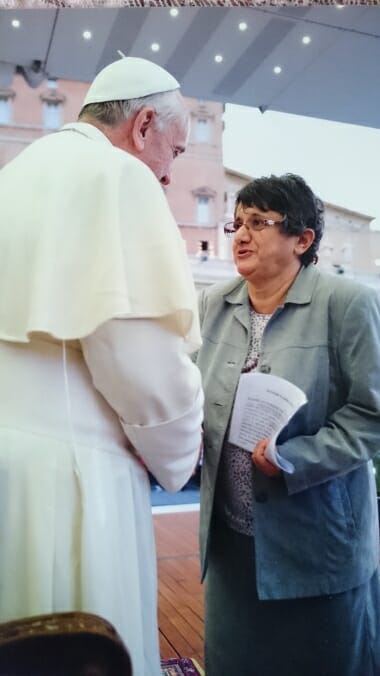 We don’t feel at all like heroes, because we are not here for personal motives. Before leaving I was able to meet Pope Francis: his encouraging words made me feel the love of the Church that draws near to this people that is undergoing such a hard trial. We also feel supported by the love of the Focolare Movement throughout the world. We need that support in order to not lose hope, powerless as we are in front of the supremecy of economic interests, and the international proliferation of weapons on the global market. We celebrate anniversaries; we create recreational moments for children and adults, in order to relieve the stress. We organise moments of spirituality; we pray together for peace. At Christmas our young people organised a concert. Three hundred people attended, including Muslims. Recently we celebrated a wedding. Two children were killed in that family and, because of mourning customs, that young woman couldn’t leave the house dressed as a bride. Therefore, she left from the focolare house, accompanied by all of us. We try to be involved in local Church projects and those of other ecclesial groups, so that we can help to wipe away a bit of suffering and deprivation amongst the people. We continue together to hope and believe, as we support every effort for the coming of peace.
We don’t feel at all like heroes, because we are not here for personal motives. Before leaving I was able to meet Pope Francis: his encouraging words made me feel the love of the Church that draws near to this people that is undergoing such a hard trial. We also feel supported by the love of the Focolare Movement throughout the world. We need that support in order to not lose hope, powerless as we are in front of the supremecy of economic interests, and the international proliferation of weapons on the global market. We celebrate anniversaries; we create recreational moments for children and adults, in order to relieve the stress. We organise moments of spirituality; we pray together for peace. At Christmas our young people organised a concert. Three hundred people attended, including Muslims. Recently we celebrated a wedding. Two children were killed in that family and, because of mourning customs, that young woman couldn’t leave the house dressed as a bride. Therefore, she left from the focolare house, accompanied by all of us. We try to be involved in local Church projects and those of other ecclesial groups, so that we can help to wipe away a bit of suffering and deprivation amongst the people. We continue together to hope and believe, as we support every effort for the coming of peace.
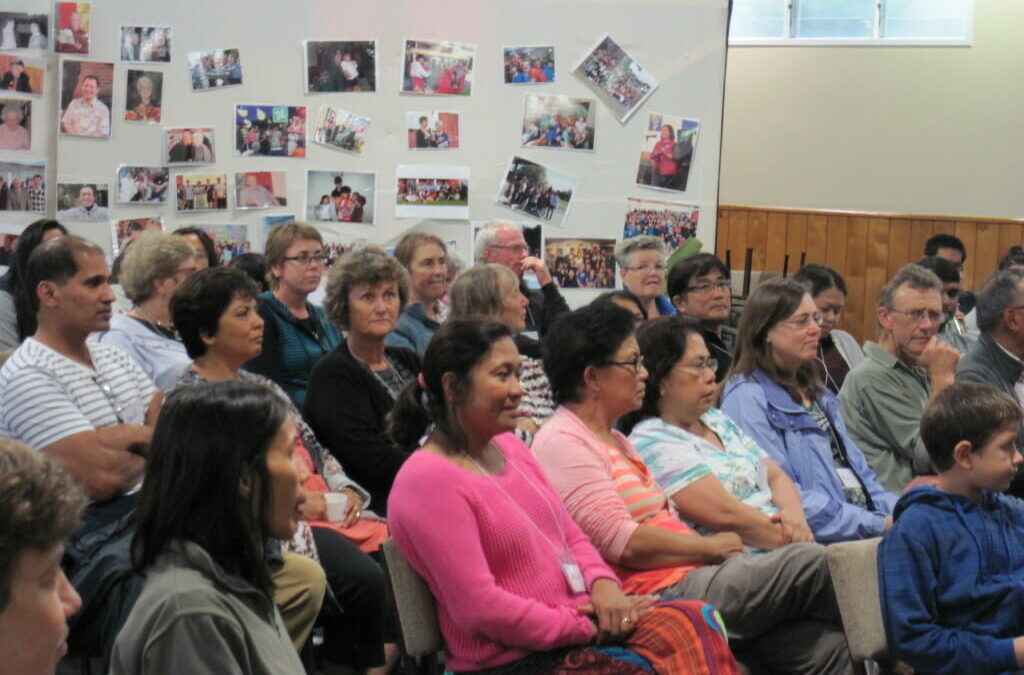
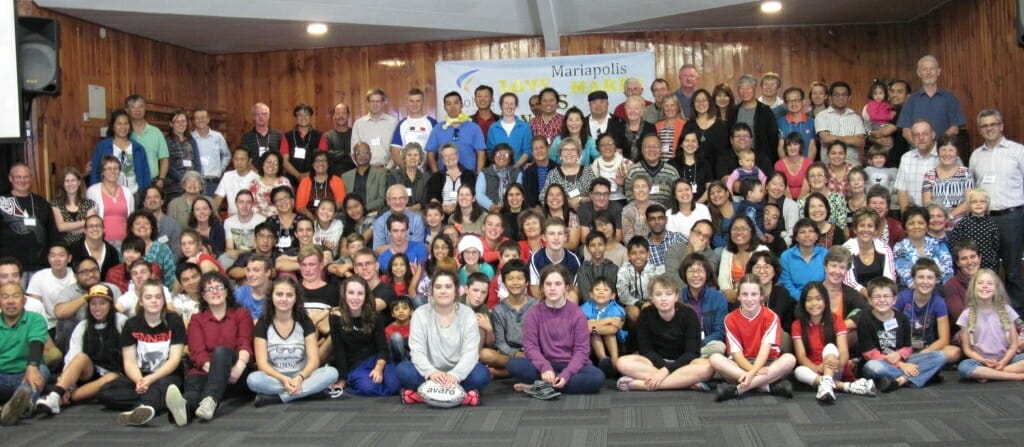 In the district of Rotorua (New Zealand) the earth’s crust is only 4 km thick. Here, one can admire the magnificent spouts of geysers right in the heart of the city, steamy puddles with bubbles gushing out of the surface. The ground emits a heat that even reaches 120°C. This is where the English colonisers had tried to install Roman baths. Still today thermal activity is at the centre of the touristic prospects of Rotorua, a city immersed in the greens and surrounded by hills. On the banks of the lake with the same name, rises the Keswick Christian Camp, a summer facility. This is the where, the Focolare scheduled to meet, about 156 people from the various cities of New Zealand’s two main islands. The objective was to spend three days together, away from the daily routing, to go deeper into the spirituality of unity.
In the district of Rotorua (New Zealand) the earth’s crust is only 4 km thick. Here, one can admire the magnificent spouts of geysers right in the heart of the city, steamy puddles with bubbles gushing out of the surface. The ground emits a heat that even reaches 120°C. This is where the English colonisers had tried to install Roman baths. Still today thermal activity is at the centre of the touristic prospects of Rotorua, a city immersed in the greens and surrounded by hills. On the banks of the lake with the same name, rises the Keswick Christian Camp, a summer facility. This is the where, the Focolare scheduled to meet, about 156 people from the various cities of New Zealand’s two main islands. The objective was to spend three days together, away from the daily routing, to go deeper into the spirituality of unity. 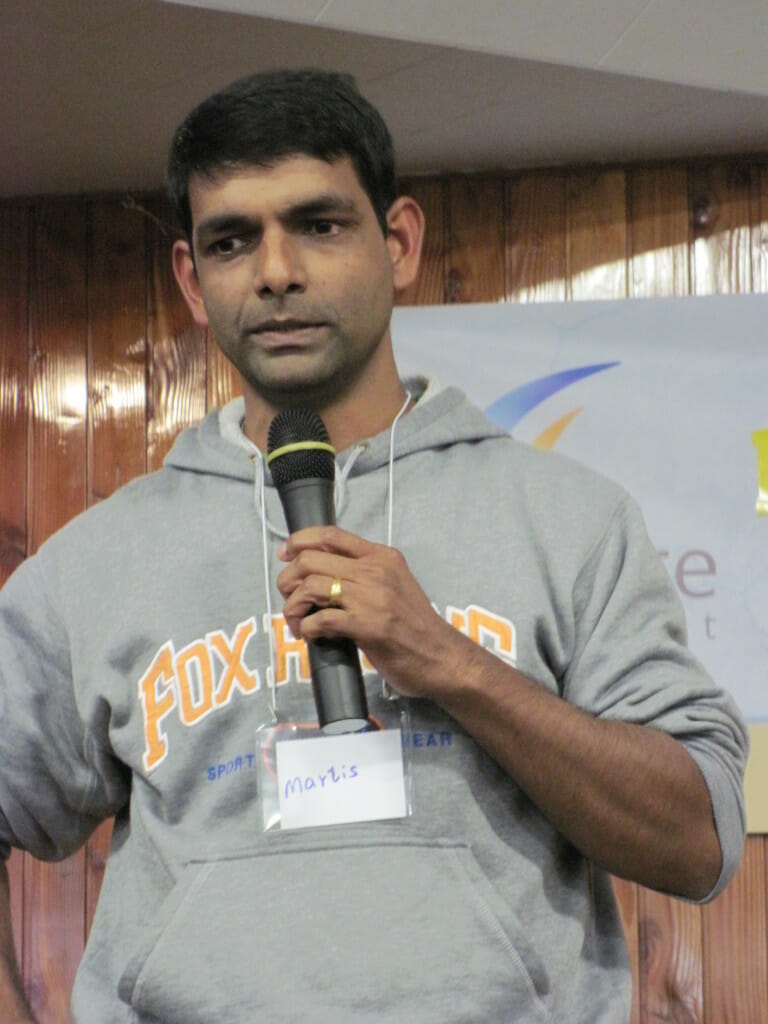 Maori, Filipinos, Chinese, Koreans, Dutch, Anglo-Saxons, Italians, Maltese, Singaporeans, Taiwanese, French, Tokelauans, Indians, Pakistanis…: an overwhelming variety of ethnic groups in a unique model of humanity. Despite such diversity, there was a family atmosphere from the start. Besides moments of spirituality and recreational activities, the programme dedicated a lot of time to getting to know one another and exchanging of experiences. The Pitcaithly family from Chistchurch, the country’s second city recounted a very moving experience of when the city was devastated by two big earthquakes. A tragedy that united the population in a sole slogan of solidarity “Kia kaha, stay strong Christchurch!” that also stood for the Focolare’s effort to gather funds offered by people from various parts of the world. The group from Gisborne, the city that has the privilege of being the first on this earth to see the sun rise, presented the “Fish & Chips Club” project. One its aims was to gather funds for the educational activities of young people, which has been fostered for many years now by people from the various Christian Church, together with others of non-religious beliefs. Together they were able to do something useful for others. Despite the multi-features of the youth and adults, they meet once a month to reflect on the Gospel and share experiences on how they try to put it into practice. A really significant way of growing as a persons and draw strength to bring ahead the various handicraft and sports activities of a club where everyone can be oneself and where people try not to stress the differences but the values all can share
Maori, Filipinos, Chinese, Koreans, Dutch, Anglo-Saxons, Italians, Maltese, Singaporeans, Taiwanese, French, Tokelauans, Indians, Pakistanis…: an overwhelming variety of ethnic groups in a unique model of humanity. Despite such diversity, there was a family atmosphere from the start. Besides moments of spirituality and recreational activities, the programme dedicated a lot of time to getting to know one another and exchanging of experiences. The Pitcaithly family from Chistchurch, the country’s second city recounted a very moving experience of when the city was devastated by two big earthquakes. A tragedy that united the population in a sole slogan of solidarity “Kia kaha, stay strong Christchurch!” that also stood for the Focolare’s effort to gather funds offered by people from various parts of the world. The group from Gisborne, the city that has the privilege of being the first on this earth to see the sun rise, presented the “Fish & Chips Club” project. One its aims was to gather funds for the educational activities of young people, which has been fostered for many years now by people from the various Christian Church, together with others of non-religious beliefs. Together they were able to do something useful for others. Despite the multi-features of the youth and adults, they meet once a month to reflect on the Gospel and share experiences on how they try to put it into practice. A really significant way of growing as a persons and draw strength to bring ahead the various handicraft and sports activities of a club where everyone can be oneself and where people try not to stress the differences but the values all can share 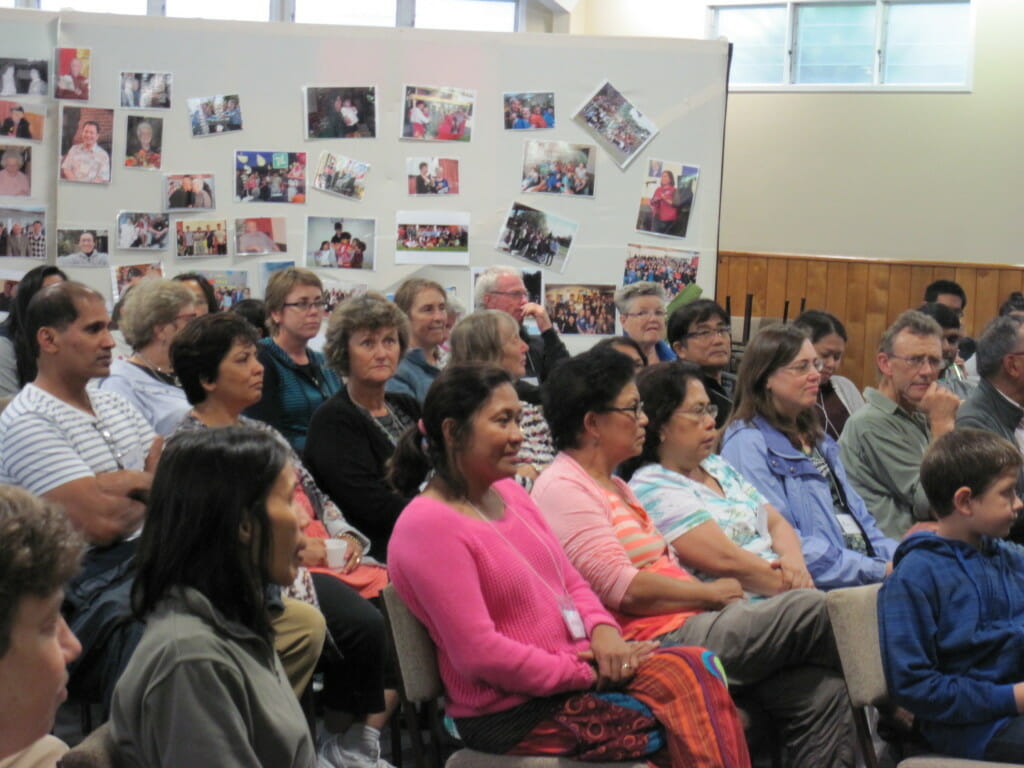 . Even if New Zealand seems to be a wealth land, an Indian-Pakistani family recounted their difficulties in integrating with society. Martis, father of two kids, was working in a home for the aged and his wife Antoneta in a small butchering company. All of a sudden they both lost their jobs. The quest for a new one went on without any results, so much so that they had decided to return to their homeland. Just ten days before the expiry of their visa, from a nearby town someone managed to arrange for a job interview for Martins who thus could renew his stay permit. It was an immense joy for this family that had given a strong testimonial of God’s love which manifests itself also through the community. Theresa, on summarising the wish of the youth present said: «What we experienced these days has given us a big boost to return to our respective cities and start all over again.» Anne, an elderly Maori lady, held in high esteem by her tribe, concluded: «Aroha te mea nui o te ao Katoa»; which in her language means: «Love is the biggest gift in the world.»
. Even if New Zealand seems to be a wealth land, an Indian-Pakistani family recounted their difficulties in integrating with society. Martis, father of two kids, was working in a home for the aged and his wife Antoneta in a small butchering company. All of a sudden they both lost their jobs. The quest for a new one went on without any results, so much so that they had decided to return to their homeland. Just ten days before the expiry of their visa, from a nearby town someone managed to arrange for a job interview for Martins who thus could renew his stay permit. It was an immense joy for this family that had given a strong testimonial of God’s love which manifests itself also through the community. Theresa, on summarising the wish of the youth present said: «What we experienced these days has given us a big boost to return to our respective cities and start all over again.» Anne, an elderly Maori lady, held in high esteem by her tribe, concluded: «Aroha te mea nui o te ao Katoa»; which in her language means: «Love is the biggest gift in the world.»
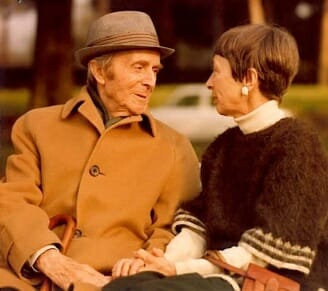
 “It is nearly impossible to put into words what Igino Giordani was for the Focolare Movement. He was a co-founder of the Movement. Being co-founder of a Work that the Church recognises as its own involves a multiple and complex activity of grace, true and varied impulses from the Holy Spirit, as well as actions on the part of the individual that are determining for the Work. These graces often come in the form of penetrating and prolonged suffering, often as light, graces and love that are not ordinary. It is better left to the history of the Church and the spiritual movements that embellish it through the centuries, to speak about such people.
“It is nearly impossible to put into words what Igino Giordani was for the Focolare Movement. He was a co-founder of the Movement. Being co-founder of a Work that the Church recognises as its own involves a multiple and complex activity of grace, true and varied impulses from the Holy Spirit, as well as actions on the part of the individual that are determining for the Work. These graces often come in the form of penetrating and prolonged suffering, often as light, graces and love that are not ordinary. It is better left to the history of the Church and the spiritual movements that embellish it through the centuries, to speak about such people.
A focolarino prays, works, and suffers in order to reach a goal: the perfection of love. Therefore, we feel it is our duty to confirm that Giordani reached this goal. In our judgement he reached the perfection of love.
He personified the name by which he was known in the Movement: “Fire” (Foco), that is, love towards God and towards neighbour, the supernatural and natural love which lies at the roots and is the summit of Christian life. He contributed in a unique way to keeping alive in our midst the reality of the Word of Life given to him when he entered the Movement: “Love one another as I have loved you.”
Those who knew Igino Giordani well are all in agreement that he had lived the Beatitudes. Exceptionally ‘pure of heart,’ he offered married people from around the world the possibility of a unique consecration to God while remaining in the matrimonial state, through spiritual virginity, the effect of burning charity. This purity refined and heightened his holiest sentiments.
He was ‘poor in spirit’ with complete detachment from his possessions, but above all from himself. He was full of mercy. In his company even the most miserable sinner felt forgiven, and the poorest pauper felt like a king. One of the most remarkable characteristics was that of being a ‘peacemaker,’ especially in his life as a politician.
He came to possess that meekness that leads to possessing the earth. He won over everyone who drew near to him. Everyone felt at ease with him, even the young were able to establish a relationship with him. Especially during his last years he seemed to radiate something supernatural when he spoke.
He “hungered and thirsted for justice” and fought for it all his life. Almost immediately he was persecuted for the sake of God’s name. So many sentences of the Gospel make us think of him.
From Giordani one learns the significance of that conversion which Jesus asks for when he says that we must become like little children. He was a fine Christian apologist and apostle. When it seemed to him that he had found a font of clear water flowing from the Church, he “sold everything’ to follow Jesus and to satisfy his thirst with that water.
He suffered because of the marginalization of the laity, and he aspired with that big heart of his to bring down the dividing walls between the people living in the state of perfection and the others – whom he would jokingly add – were living in the state of imperfection. In other words, he was very sensitive to the signs of the times; indeed, he himself was a sign of the times, of these times in which the Holy Spirit calls the entire People of God to holiness.”
(Taken from: Chiara Lubich, Igino Giordani focolarino, «Città Nuova»n. 9-10 – May 1980)

 “In 2014 the company I was working for – Rosette recounts – assigned me to the region of Iraqi Kurdistan (KRI). To facilitate the job placement of my husband, Eric, who also had an excellent CV, we decided to settle in Dubai, in the rich United Arab Emirates where life is pleasant and comfortable. Due to all this wealth many foreigners come to Dubai in pursuit of a better life for themselves and their families, even if this entails leaving one’s own loved ones in their homelands. During one of my trips to Kurdistan, though I was two hours early for my flight, my name was removed from the list of passengers. I was nervous because this meant that I had to take a smaller plane which was scheduled to leave only at one o’clock at night. There was still a lot of time before boarding, but I went to the terminal just the same since we never can tell. Strangely however, there were a lot of people, and many were sleeping on the floor. I asked them how long we had to wait. A woman said: “It depends: we could leave immediately but also within a few days.” In fact, she had been there for two days due to a spelling mistake on her visa. And they would not allow her to leave. Just to start a conversation I asked her if she had something to eat: “Yes, I still have some crackers and a bit of water.” I invited her to have a meal with me and after a lot of insistence, she finally accepted. While we were chatting, her boss called her to check on her and to know if she had enough money to stay there. She had no money. She had sent her entire salary to her son so he could pay his university fees. After the phone call she told me her story: she was separated from her husband, and her two sons lived with their grandparents in her homeland. She had come to Dubai because her daughter was finishing high school and needed money for university. After a while I heard the announcement of my flight. I wondered how long more she would have to wait. I encouraged her take the money I was offering. And I promised I would pray for her family. Her story was just one of the many of how the immigrants live. Some families are in Dubai because of the wars in their countries (Palestinians, Syrians, Iraqis): Dubai is like a safe haven where people can live a normal life. For them, work is everything, the start and the end, since without work they would not have a visa and would not be able to stay in Dubai. Especially for those who are here alone, with the passing of time the physical distance and solitude in a foreign country often obscure their good intentions. We know of people who have extra-marital affairs, destroying in this manner the very family for which they had come here, limiting themselves to just furnishing money to their loved ones. Unfortunately most of these people accept these solutions as unavoidable facts, even if the price to pay is immense. And in the end, also we were asked to pay this same ‘price’. My frequent trips to Dubai led me to spend less and less time with Eric. So we decided to move to Kurdistan, even if this meant renouncing the good job Eric had in Dubai. Initially my company had accepted but during my talks and some violent events in Kurdistan, we were told that the company could not guarantee Eric’s safety and that he, therefore, could not move there. One of my bosses had said: ‘…with time you will get used to being separated …’. In the face of this perspective we immediately decided to resign. We were not going to be separated in any way, even if this meant giving up a well paid job and a career we had studied so much for. I must confess that it was not an easy choice at all. But in our hearts we both knew we were making the right choice. My last working day was 31 December 2014. Last January the Pope came to the Philippines, and in the meeting with families he strongly affirmed the value of the family: “We must be strong in saying “no” to any intent for ideological colonization that can destroy the family.” It seemed as if he was precisely speaking to us, and confirmed the counter current decision we had made.”
“In 2014 the company I was working for – Rosette recounts – assigned me to the region of Iraqi Kurdistan (KRI). To facilitate the job placement of my husband, Eric, who also had an excellent CV, we decided to settle in Dubai, in the rich United Arab Emirates where life is pleasant and comfortable. Due to all this wealth many foreigners come to Dubai in pursuit of a better life for themselves and their families, even if this entails leaving one’s own loved ones in their homelands. During one of my trips to Kurdistan, though I was two hours early for my flight, my name was removed from the list of passengers. I was nervous because this meant that I had to take a smaller plane which was scheduled to leave only at one o’clock at night. There was still a lot of time before boarding, but I went to the terminal just the same since we never can tell. Strangely however, there were a lot of people, and many were sleeping on the floor. I asked them how long we had to wait. A woman said: “It depends: we could leave immediately but also within a few days.” In fact, she had been there for two days due to a spelling mistake on her visa. And they would not allow her to leave. Just to start a conversation I asked her if she had something to eat: “Yes, I still have some crackers and a bit of water.” I invited her to have a meal with me and after a lot of insistence, she finally accepted. While we were chatting, her boss called her to check on her and to know if she had enough money to stay there. She had no money. She had sent her entire salary to her son so he could pay his university fees. After the phone call she told me her story: she was separated from her husband, and her two sons lived with their grandparents in her homeland. She had come to Dubai because her daughter was finishing high school and needed money for university. After a while I heard the announcement of my flight. I wondered how long more she would have to wait. I encouraged her take the money I was offering. And I promised I would pray for her family. Her story was just one of the many of how the immigrants live. Some families are in Dubai because of the wars in their countries (Palestinians, Syrians, Iraqis): Dubai is like a safe haven where people can live a normal life. For them, work is everything, the start and the end, since without work they would not have a visa and would not be able to stay in Dubai. Especially for those who are here alone, with the passing of time the physical distance and solitude in a foreign country often obscure their good intentions. We know of people who have extra-marital affairs, destroying in this manner the very family for which they had come here, limiting themselves to just furnishing money to their loved ones. Unfortunately most of these people accept these solutions as unavoidable facts, even if the price to pay is immense. And in the end, also we were asked to pay this same ‘price’. My frequent trips to Dubai led me to spend less and less time with Eric. So we decided to move to Kurdistan, even if this meant renouncing the good job Eric had in Dubai. Initially my company had accepted but during my talks and some violent events in Kurdistan, we were told that the company could not guarantee Eric’s safety and that he, therefore, could not move there. One of my bosses had said: ‘…with time you will get used to being separated …’. In the face of this perspective we immediately decided to resign. We were not going to be separated in any way, even if this meant giving up a well paid job and a career we had studied so much for. I must confess that it was not an easy choice at all. But in our hearts we both knew we were making the right choice. My last working day was 31 December 2014. Last January the Pope came to the Philippines, and in the meeting with families he strongly affirmed the value of the family: “We must be strong in saying “no” to any intent for ideological colonization that can destroy the family.” It seemed as if he was precisely speaking to us, and confirmed the counter current decision we had made.”
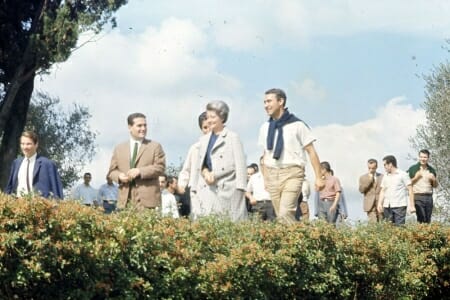

In carrying out his extraordinary mission, the Apostle Paul conducted his life in a particular way: he strove to become all things to all people. In fact, he tried to understand everyone, enter into the mentality of each person: to be a Jew with the Jews, and with the non-Jews – those without a law revealed by God – to be as one without the law.
Paul followed the Jewish customs whenever this served to remove barriers or to reconcile souls; but when he worked in the Gre¬ek-Roman world, he adopted the culture and way of life of that world. He wrote:
“To the weak I became weak. I have become all things to all people, that I might by all means save some”
He saw before him the unlimited horizon of freedom from sin, from death, from the law, from the reign of Satan, from the barriers imposed by nationality, class and sex, from every form of domination by others, from the taboos of food and customs, and so on.
Paul himself lived this freedom, and with the Gospel he offered it to the communities he founded.
And yet in the liberating reality of Christianity that he announced, Paul recognized the need – or rather, the imperative – to become the slave of someone: of his brothers and sisters, of each neighbor.
He understood this essential duty from the example of Christ, who let himself be crucified in order to reach every person whatever his or her situation, in order to become the servant of everyone.
By becoming man, God drew close to every human being, but on the cross, he proved his solidarity with each of us sinners, with our weaknesses, our sufferings, our anguish, our ignorance, our questions, our burdens, our moments of feeling abandoned.
Paul, too, wanted to live this way, and he declared:
“To the weak I became weak. I have become all things to all people, that I might by all means save some”
The purpose of your life and of each new day is to reach God – and not alone, but with your brothers and sisters. In fact, you also, as a Christian, have received a call from God similar to the one received by Paul. Like the Apostle, you too must “save” someone, must “save some at any cost.”
There are those who are next to you all day long, and those you meet on the street; those with whom you speak on the phone, and those for whom you work. They may be rich or poor, men or women, fellow citizens or foreigners.
Love them all.
But this time, prefer the weakest. Make yourself weak with those who are weak in order to save them. Reach out to those who are weak in faith, indifferent or far from God, to those who profess to be atheists or who belittle religion.
If you make yourself one with them, even in their “weaknesses,” you will find that Paul’s apostolic method always works: you will conquer them!
Do you have a spouse who does not like the Church at all, and who enjoys spending hours watch¬ing TV? Keep him or her company whenever you can, as much as you can, taking a lively interest in what he or she likes to watch most.
Do you have a son who has made sports the center of his life, so much so that he is not interested in anything else, and has even forgotten how to pray? Be¬come a more avid sports fan than he is himself.
Do you have friends who love to travel, to read, to study and who have thrown to the wind all religious principles? Try to understand them by understanding their preferences and their needs and if you can, help them to find what they are seeking.
Make yourself one – with everyone, in everything, as much as you can, except in sin. In the case of anything sinful, dissociate yourself.
You will see that making yourself one with your neighbors is not time lost; it is all time gained.
One day, in the not-too-distant future, they will want to know what interests you.
And then, gratefully, they will discover, adore and love that God who has been the impetus for your Chris¬tian behavior.
Chiara Lubich
Audio in italian
Source: www.centrochiaralubich.org
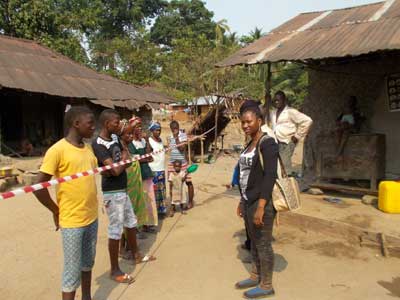

Antonette, a young woman who volunteers for an NGO, in a village named Rosanda
More days of quarantine in Sierra Leone. From March 27-29 several regions of the capital Freetown and other points in the north of the country were once again isolated, following more registered cases of Ebola in previous days. Trained groups went house to house in the most at risk areas, educating and identifying the infected and possibly infected people.
“There was hope of arriving at zero cases by the end of February,” writes Father Carlo from Sierra Leone, “The schools were ready to open, but that was then postponed to the middle of April. So there is uncertainty, the people want to begin normal life, but the virus is still lurking.”
“At the beginning of the epidemic I was in Makeni for my studies,” says Antonette, a young woman who volunteers for an NGO. “The crisis appeared serious from the start, and that’s how I thought of returning to my home town where I would be safe from the virus. But then I decided to stay on as a volunteer helping the people who were infected. I was assigned to a village named Rosanda,” where there are 54 registered cases and 42 deceased. “It was sad during that first period. Around 15 people died every day. I had to inform the families and, even though I tried to put as much love into it as I could, it wasn’t an easy experience. Two children continued to ask me when their parents would return. I just couldn’t bring myself to tell them the truth. I tried my best to console them with my presence and some small gifts.” “Every day, for one month, I went all the way to that village,” Antonette continues, “learning to expand my heart to those who were in need, even if they were not members of my family or circle of friends. Now Rosanda has finished its 21 days of quarantine. There have been no new cases and I am thankful to God that I was able to be an instrument of His love which I received each day in the Eucharist, for all those people.
Like Antonette others have also given of themselves to fight this great cause of so much suffering and pain. Families have adopted children who were left orphaned, priests and religious held nothing back. Amongst these is Father Peter who worked in several villages. Thanks to his stormy intervention it was possible to block the contagion and reduce the number of victims.
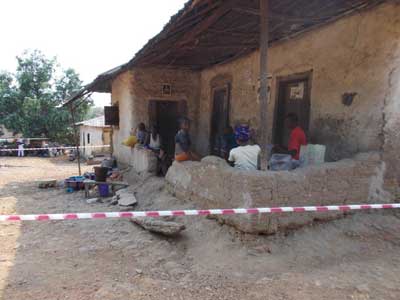 His story is connected to Small Bumbuna, a village in the Diocese of Makeni, 200 miles from Kailahum where the epidemic began. “The illness spread like the fire in dry season, in Sierra Leone. With the first victims we thought of cholera, evil spirits or other superstitions. The response from the medical team was slow: it took weeks to confirm that we were dealing with Ebola. We would have wanted to visit the people from our parish in another village, but the fear was too strong. The district medical team was not able to monitor the situation and send supplies. It was difficult to access roads.” Faced with so many difficulties, Father Peter, followed by his parishioners, made: “a radical decision that brought us face to face with the Ebola,” he recounts. “We found the city deserted when we arrived. The village chief described the terrible situation. The loss of hope was clear on his face, along with impossibility of doing anything.” From there we stepped into non-stop action that involved the highest levels of authority. Father Peter was invited as “guide” to deal with the population, explaining how to stem the spreading and allow themselves to receive medical treatment. “I took on these risks,” Father Peter concluded, “because these people are my community. How could I desert them in such a moment of painful suffering? This question helped me to identify with them, to bring the problem before the authorities, and to offer myself as a guide. I learned that nothing is too small to be offered, nor too heavy to be taken up. Let us continue to pray that the epidemic may be totally eradicated and we can return to normal life.” In the course of two weeks, the danger came under control and people were able to return to their farming activities.
His story is connected to Small Bumbuna, a village in the Diocese of Makeni, 200 miles from Kailahum where the epidemic began. “The illness spread like the fire in dry season, in Sierra Leone. With the first victims we thought of cholera, evil spirits or other superstitions. The response from the medical team was slow: it took weeks to confirm that we were dealing with Ebola. We would have wanted to visit the people from our parish in another village, but the fear was too strong. The district medical team was not able to monitor the situation and send supplies. It was difficult to access roads.” Faced with so many difficulties, Father Peter, followed by his parishioners, made: “a radical decision that brought us face to face with the Ebola,” he recounts. “We found the city deserted when we arrived. The village chief described the terrible situation. The loss of hope was clear on his face, along with impossibility of doing anything.” From there we stepped into non-stop action that involved the highest levels of authority. Father Peter was invited as “guide” to deal with the population, explaining how to stem the spreading and allow themselves to receive medical treatment. “I took on these risks,” Father Peter concluded, “because these people are my community. How could I desert them in such a moment of painful suffering? This question helped me to identify with them, to bring the problem before the authorities, and to offer myself as a guide. I learned that nothing is too small to be offered, nor too heavy to be taken up. Let us continue to pray that the epidemic may be totally eradicated and we can return to normal life.” In the course of two weeks, the danger came under control and people were able to return to their farming activities.

 «Many have tried to explain the roots and reasons behind the start of monastic life, but the sayings and experiences of the Fathers show that the monks are “living martyrs,” and that they “abandoned the world to embrace the sole reality worth living for – God.” It is as if they wanted to respond to God’s love, which is fully described in a verse of the Coptic Mass we call the Divine Liturgy, which addresses God saying: “Of all the words said, there is nothing that can describe Your love for mankind.” St. Jerome says that their asceticism and life as hermits proclaim, “we have been struck by the darts of Divine love,” and each one repeats: “I have found what my soul longs for; I will hold on to it tightly and never leave it.” These monks, therefore, only wishing to give themselves completely to this love and to consecrate themselves to Him, had no choice but to leave the cities.
«Many have tried to explain the roots and reasons behind the start of monastic life, but the sayings and experiences of the Fathers show that the monks are “living martyrs,” and that they “abandoned the world to embrace the sole reality worth living for – God.” It is as if they wanted to respond to God’s love, which is fully described in a verse of the Coptic Mass we call the Divine Liturgy, which addresses God saying: “Of all the words said, there is nothing that can describe Your love for mankind.” St. Jerome says that their asceticism and life as hermits proclaim, “we have been struck by the darts of Divine love,” and each one repeats: “I have found what my soul longs for; I will hold on to it tightly and never leave it.” These monks, therefore, only wishing to give themselves completely to this love and to consecrate themselves to Him, had no choice but to leave the cities.
St. Basil clearly announced: “Whoever loves God leaves all and goes towards Him.” And it is said that St. Tawadros, disciple of St. Pachomius, “had only one interest in the world – to love God with all his heart by following the command of Jesus Christ.” We can sense that the root of ascetic life is to resemble Christ: completely stripping oneself of all things, and following the Father’s will which is virginity, in continual contact with God the Father through prayer. Fr. Matta El Meskin explained it thoroughly: “The warranty of our consecration (as monks) lies in our holding on to Christ personally, and following the Bible’s teachings. In this way, with Christ and the Bible, we will be able to pursue our path in continuous growth, to the very end.”
The choice of the consecrated person is to follow Jesus, the “Way, the Truth and the Life.” This means living for Christ and for him alone and following him in his lifestyle. He chose poverty, virginity and obedience. The monk, therefore, does not choose poverty, but Christ the poor one. The choice is the person of Jesus himself, and so, of what Christ lived, and the how and why he lived in this way. As for the communitarian aspect in the ascetic life of the desert monks, let us recall how – for example in the monasteries that followed after St. Pachomius – the life of communion became the extension of the primitive Church during the time of the apostles. Looking at the life of the Fathers, we can trace some communitarian characteristics: mutual love (St. Pachomius always exhorted his disciples to love one another, and that it was due to the charity among the monks that this life spread and continued up to today), and life together (the dominant feature of these first Christian communities was the “sharing of all they had” in all the aspects of the monks community life).
The teachings of the Desert Fathers remind me about the meditation of Chiara Lubich, “The great attraction of modern times,” which fully expresses what I feel: “To penetrate to the highest contemplation, while mingling with everyone.” It is a contemplation that actualises the life of the Fathers in this century, but in the midst of the world.
T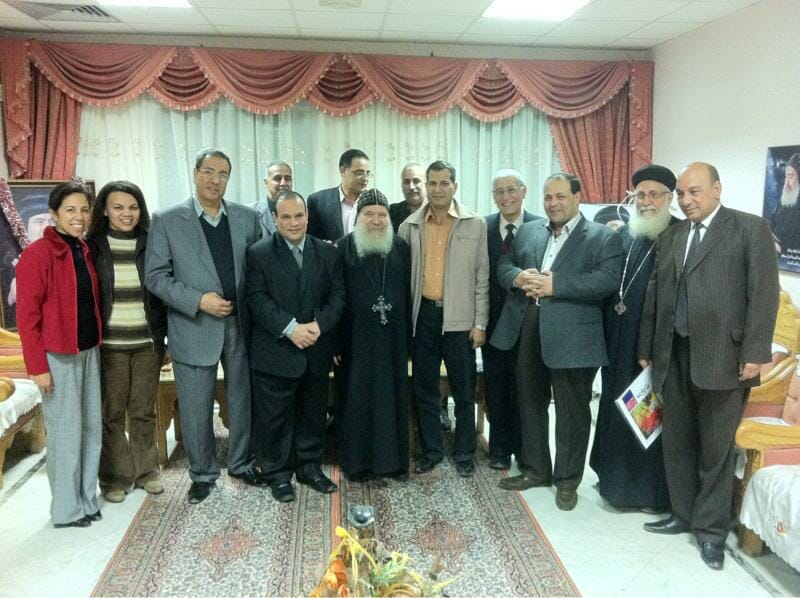 he spiritual presence of Jesus in our midst with the Catholic focolarine with whom I live in the Focolare Centre in Sohag, and the commitment to love each other, have made us like real sisters and caused us to experiment the joy of the Risen Lord, beyond all our differences. In our daily life we share everything we have: we pray, work, rejoice and share the moments of suffering of the people around us. We try to bear witness through our lives, that God is love.
he spiritual presence of Jesus in our midst with the Catholic focolarine with whom I live in the Focolare Centre in Sohag, and the commitment to love each other, have made us like real sisters and caused us to experiment the joy of the Risen Lord, beyond all our differences. In our daily life we share everything we have: we pray, work, rejoice and share the moments of suffering of the people around us. We try to bear witness through our lives, that God is love.
Living for the fullness of unity in Christ’s Church “that all may be one,” fascinates me more and more. I rejoice about the beauty and variety of the gifts of God I find in the various Churches, and the aspiration and emotion of seeing that we are united in Christ in our midst and in the future of the Church in God’s design.
My country also testifies to this with the big and small steps taken along the ecumenical journey. For example, there is now an ecumenical commission which was formed some years ago, with people of every Christian confession existing in Sohag. We meet in a different Church every time: this year it will be in the Coptic Orthodox Church. On 5 March almost all the local heads of the churches were present. The main theme was “the victory over evil,” starting from the persecution of Christians in Libya, which traces the steps of the people of Israel on their departure from Egypt. «The flag that flies above us is that of God’s love,» affirmed the Coptic Orthodox Bishop Bakhoum, who wished that all those present «will always meet in Love.»
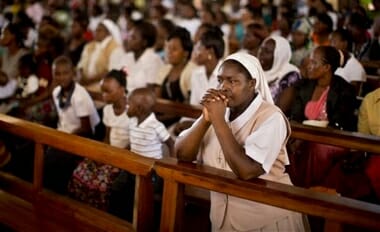
”The slaughter in Garissa took place on Good Friday. 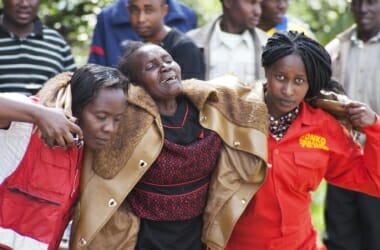 I went to the morgue where they were taking the bodies of the students for identification, not far from my home in Nairobi. I took my camera along. It was impossible not to hear the sirens. I found the parents of the murdered students fainting on one side. . . and on ther other my colleagues with news cameras. I could certainly have shot a few interviews, but I just couldn’t do it; I found myself weeping with the families. There was strong pressure from all sides, opinions from the public who were anxious for news. But I needed time to digest the painful situation in order to be able to say something that would be constructive. I felt my task was to remain quiet with this pain and resist the pressure.”
I went to the morgue where they were taking the bodies of the students for identification, not far from my home in Nairobi. I took my camera along. It was impossible not to hear the sirens. I found the parents of the murdered students fainting on one side. . . and on ther other my colleagues with news cameras. I could certainly have shot a few interviews, but I just couldn’t do it; I found myself weeping with the families. There was strong pressure from all sides, opinions from the public who were anxious for news. But I needed time to digest the painful situation in order to be able to say something that would be constructive. I felt my task was to remain quiet with this pain and resist the pressure.” 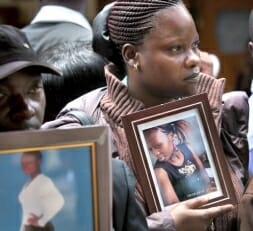 There were over 150 victims of the attack by Somali extremists at the Garissa University College in North East Kenya. The terrorists began their attack on April 3rd, targeting the Christian students. It was only a day-long front attack by government forces that prevented an even worse slaughter. But the general fear of new attacks remains so high that any incident is enough to unleash panic with very serious consequences as happened on April 12th in another university college at Uthiru, near Nairobi. An electrical transfomer caught fire on the fourth and fifth floor, causing an explosion that was similar to that of the bomb. The number of the dead reached 150 with several others seriously wounded. “From the first days of the attack, many of us from our community were in the morgue where 148 bodies of murdered students were taken, in order to console the people who had lost children,” Charles Besigye from the local Focolare community recounts. “Today, on April 11th, we and some of our young people spent the afternoon at the morgue. It was so heartbreaking! People in total suspense who, a week later have not yet found their children. Some bodies have already been identified and they are carrying them back to their villages for burial. The suffering is huge. . . the relatives a desperate sight.We stayed with them to share their suffering, and to help them carry this heavy cross. To weep with those who are still able to, because there are some who have no more tears to shed. One of us offered to help prepare the bodies of the deceased students before their relatives saw them. It was a powerful experience! There’s much solidarity on the part of several associations and the Kenyan people. They bring bread, milk, beverages, and so on. . . The sacred atmosphere that we breathe is overwhelming. There are people who offer comfort, others who pray to God.”
There were over 150 victims of the attack by Somali extremists at the Garissa University College in North East Kenya. The terrorists began their attack on April 3rd, targeting the Christian students. It was only a day-long front attack by government forces that prevented an even worse slaughter. But the general fear of new attacks remains so high that any incident is enough to unleash panic with very serious consequences as happened on April 12th in another university college at Uthiru, near Nairobi. An electrical transfomer caught fire on the fourth and fifth floor, causing an explosion that was similar to that of the bomb. The number of the dead reached 150 with several others seriously wounded. “From the first days of the attack, many of us from our community were in the morgue where 148 bodies of murdered students were taken, in order to console the people who had lost children,” Charles Besigye from the local Focolare community recounts. “Today, on April 11th, we and some of our young people spent the afternoon at the morgue. It was so heartbreaking! People in total suspense who, a week later have not yet found their children. Some bodies have already been identified and they are carrying them back to their villages for burial. The suffering is huge. . . the relatives a desperate sight.We stayed with them to share their suffering, and to help them carry this heavy cross. To weep with those who are still able to, because there are some who have no more tears to shed. One of us offered to help prepare the bodies of the deceased students before their relatives saw them. It was a powerful experience! There’s much solidarity on the part of several associations and the Kenyan people. They bring bread, milk, beverages, and so on. . . The sacred atmosphere that we breathe is overwhelming. There are people who offer comfort, others who pray to God.” During the Way of the Cross at the Roman Colosseum on the evening of Good Friday, the Pope used harsh words: “The thirst of Your Merciful Father,” said Pope Francis, “which in You wished to embrace, forgive and save humanity, makes us think of the thirst of our persecuted brothers and sisters, beheaded and crucified for their faith in You, right beneath our eyes, or often with our complicit silence.” It is a strong warning that urges us not to remain silent.
During the Way of the Cross at the Roman Colosseum on the evening of Good Friday, the Pope used harsh words: “The thirst of Your Merciful Father,” said Pope Francis, “which in You wished to embrace, forgive and save humanity, makes us think of the thirst of our persecuted brothers and sisters, beheaded and crucified for their faith in You, right beneath our eyes, or often with our complicit silence.” It is a strong warning that urges us not to remain silent.
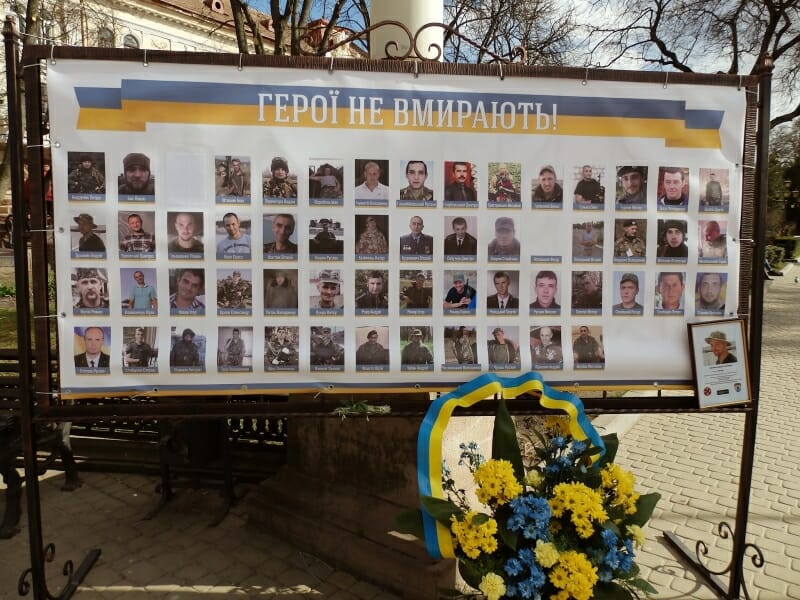
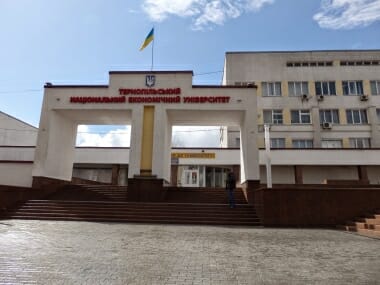 In his heartfelt plea for our many brothers and sisters in the world who “unjustly suffer the consequences of present violence and war,” the Pope also prayed for “the beloved Ukraine” that “it might find peace and hope thanks to the commitment of all interested parties.” Yes, because the war in Ukraine even now continues in its absurdity and violence. We are talking with Roberto Catalano who has been invited to hold conferences on the topic of dialogue, at the Universties of Leopoli, Ivanova Franziksva and Ternopil. It is significant that in the midst of the ‘crisis,’ the young people (and their tutor), rather than becoming entrenched in their private worlds, are out working for deeper dialogue as the only resource that directs their every effort. Roberto, what was the general feeling among the people you met?
In his heartfelt plea for our many brothers and sisters in the world who “unjustly suffer the consequences of present violence and war,” the Pope also prayed for “the beloved Ukraine” that “it might find peace and hope thanks to the commitment of all interested parties.” Yes, because the war in Ukraine even now continues in its absurdity and violence. We are talking with Roberto Catalano who has been invited to hold conferences on the topic of dialogue, at the Universties of Leopoli, Ivanova Franziksva and Ternopil. It is significant that in the midst of the ‘crisis,’ the young people (and their tutor), rather than becoming entrenched in their private worlds, are out working for deeper dialogue as the only resource that directs their every effort. Roberto, what was the general feeling among the people you met? 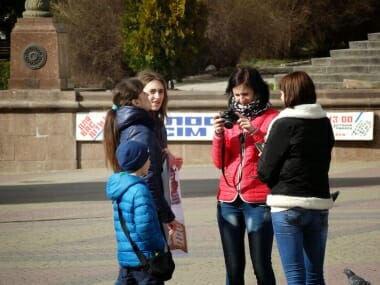 “At the end of one conference, one of my scholastic colleagues showed me three photos of some ex-students of the University who had been killed in the conflict in the south of the country. With eyes filled with tears, he told me that every evening after lessons, a group of students gathers in the cafeteria of the university to cook Ukrainian dishes, which are then frozen and delivered to soldiers. Annother woman told me about her six year-old son who draws cartoons and sends them to soldiers, as a sign of thanks for defending his country. Unfortunately, unlike last year, the news is no longer reporting on what is taking place in Ukraine. Yet, there is actually a war underway in East Ukraine.” There seems to be no way out of the situation that is generating suffering and suspense in the hearts of the people. . . “I had living proof of this deep suffering during every moment of my stay in Ukraine. Students and professors asked me what I thought about the situation in the country and, above all, what the rest of Europe was saying. I didn’t have the nerve to express judgements. Faced with their fear and suffering I preferred to listen and stay silent. I was impressed by the strength and dignity of that people, but it also frightened me that the rest of Europe and of the world have abandoned them to their fate, aggravated also by the growing nationalism, another phenomenon that could be hiding large dangers for the future.”
“At the end of one conference, one of my scholastic colleagues showed me three photos of some ex-students of the University who had been killed in the conflict in the south of the country. With eyes filled with tears, he told me that every evening after lessons, a group of students gathers in the cafeteria of the university to cook Ukrainian dishes, which are then frozen and delivered to soldiers. Annother woman told me about her six year-old son who draws cartoons and sends them to soldiers, as a sign of thanks for defending his country. Unfortunately, unlike last year, the news is no longer reporting on what is taking place in Ukraine. Yet, there is actually a war underway in East Ukraine.” There seems to be no way out of the situation that is generating suffering and suspense in the hearts of the people. . . “I had living proof of this deep suffering during every moment of my stay in Ukraine. Students and professors asked me what I thought about the situation in the country and, above all, what the rest of Europe was saying. I didn’t have the nerve to express judgements. Faced with their fear and suffering I preferred to listen and stay silent. I was impressed by the strength and dignity of that people, but it also frightened me that the rest of Europe and of the world have abandoned them to their fate, aggravated also by the growing nationalism, another phenomenon that could be hiding large dangers for the future.”  Exactly as the Pope said when he talked about the slaughter of the students in Kenya. In the face of these atrocities, it seems like the international community turns its eyes the other way. And yet, the Ukrainian people are also our brothers and sisters, because of our common humanity and our common Christian faith that inspires them. “I visited a large church where the liturgy was being celebrated according to the Eastern Rite. The beautiful and very modern iconostasis was quite striking, but more surprising was the religiosity of the people who were so attentive and wrapt in prayer. I was struck by the long queue of people waiting for Confession. Seventy years of Marxism didn’t wipe out the faith of the people.” In your opinion, is there any hope there will be peace? “I only visited one half of Ukraine and wasn’t able to hear the other side, but they also have their suffering that is perhaps more difficult to understand. And it’s another story over here with its own twists and turns, but also with its present problems that are dictated by international interests in gas and oil. There is the risk of silence that covers up the suffering of millions of people. As the Pope suggested, there is a need for commitment from all the interersted parties. This is the only way an enduring peace will be able to be reached.
Exactly as the Pope said when he talked about the slaughter of the students in Kenya. In the face of these atrocities, it seems like the international community turns its eyes the other way. And yet, the Ukrainian people are also our brothers and sisters, because of our common humanity and our common Christian faith that inspires them. “I visited a large church where the liturgy was being celebrated according to the Eastern Rite. The beautiful and very modern iconostasis was quite striking, but more surprising was the religiosity of the people who were so attentive and wrapt in prayer. I was struck by the long queue of people waiting for Confession. Seventy years of Marxism didn’t wipe out the faith of the people.” In your opinion, is there any hope there will be peace? “I only visited one half of Ukraine and wasn’t able to hear the other side, but they also have their suffering that is perhaps more difficult to understand. And it’s another story over here with its own twists and turns, but also with its present problems that are dictated by international interests in gas and oil. There is the risk of silence that covers up the suffering of millions of people. As the Pope suggested, there is a need for commitment from all the interersted parties. This is the only way an enduring peace will be able to be reached.
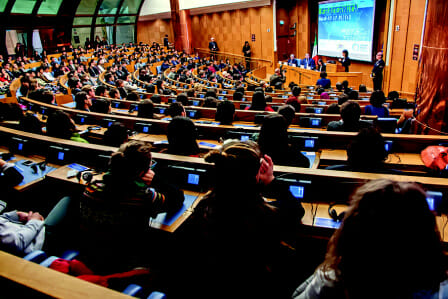
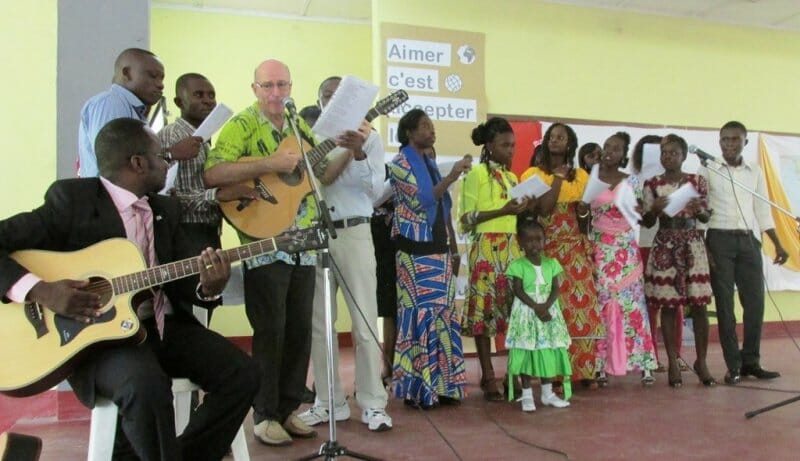 Within crisis situations – An answer to the political crisis going on in Congo appeared as the theme of two meetings held in that land. In Lubumbashi 370 people came forward, both Christian and Muslim. Young people from the Focolare presented an artistic rendition of Chiara’s love for the poor; her encounter with Igino Giordani; and her ‘dream’ for the unity of the human family. The Mass was animated by over fifty seminarians. Four hundred people attended the event in Goma, including a large group of politicians from the province of North-Kivu and representatives from civil society. Following the event, RTNC broadcasted the event in four local languages. Some events were held in a few of the world’s hotspots. In Nigeria, for example, there were several events: in Yola to where many refugees have fled. The bishop celebrated Mass for Chiara, praying for peace. In Abuja and Lagos young people held a two-day preperation event for other young people. In Onitsha there was a meeting with more than 300 adults, young people and children. In Jos, where it was not possible to hold a large gathering because of an explosion a few days earlier, the Focolare groups paid a visit to a Penal Institute for Minors. Peace was also the main topic at a day-long event organised in Bujumbura, Burundi, with over a thousand people. The programme included many testimonies that highlighted the possibility of living in harmony with others and building peace in places where that is not easily done. The Archbishop Evariste Ngoyagoye attended the morning portion of the programme. In Central America, politics is a hot topic. From Honduras they write: “tired of corrupt politics and bombarded by violent news that generates discouragement in the popultiaon, we organised this event in order to share what the charism of unity has to offer both in testimony and in thought.” In Salvador that awaits the Beatification of Oscar Romero, we asked how unity could be lived in the midst of violence. Amongst the testimonies was that of Francesco, who was assaulted by a pair of armed youngsters. He was able to dialogue with them and speak to them about God. The boys were completely blown away; putting down their weapons they walked away. In Pakistan, in Karachi, Lahore, Rawalpindi, Dalwal, over a thousand people held four celebrations, with hopeful expectancy following the tragic events of March 15 in Yohannabad.
Within crisis situations – An answer to the political crisis going on in Congo appeared as the theme of two meetings held in that land. In Lubumbashi 370 people came forward, both Christian and Muslim. Young people from the Focolare presented an artistic rendition of Chiara’s love for the poor; her encounter with Igino Giordani; and her ‘dream’ for the unity of the human family. The Mass was animated by over fifty seminarians. Four hundred people attended the event in Goma, including a large group of politicians from the province of North-Kivu and representatives from civil society. Following the event, RTNC broadcasted the event in four local languages. Some events were held in a few of the world’s hotspots. In Nigeria, for example, there were several events: in Yola to where many refugees have fled. The bishop celebrated Mass for Chiara, praying for peace. In Abuja and Lagos young people held a two-day preperation event for other young people. In Onitsha there was a meeting with more than 300 adults, young people and children. In Jos, where it was not possible to hold a large gathering because of an explosion a few days earlier, the Focolare groups paid a visit to a Penal Institute for Minors. Peace was also the main topic at a day-long event organised in Bujumbura, Burundi, with over a thousand people. The programme included many testimonies that highlighted the possibility of living in harmony with others and building peace in places where that is not easily done. The Archbishop Evariste Ngoyagoye attended the morning portion of the programme. In Central America, politics is a hot topic. From Honduras they write: “tired of corrupt politics and bombarded by violent news that generates discouragement in the popultiaon, we organised this event in order to share what the charism of unity has to offer both in testimony and in thought.” In Salvador that awaits the Beatification of Oscar Romero, we asked how unity could be lived in the midst of violence. Amongst the testimonies was that of Francesco, who was assaulted by a pair of armed youngsters. He was able to dialogue with them and speak to them about God. The boys were completely blown away; putting down their weapons they walked away. In Pakistan, in Karachi, Lahore, Rawalpindi, Dalwal, over a thousand people held four celebrations, with hopeful expectancy following the tragic events of March 15 in Yohannabad.  In institutional fora – In Seoul numerous deputies and people working in public adminstration met at the Parliament to take stock of the journey begun ten years ago towards a politics of brotherhood. In Madrid it was the Seat of the European Parliament to host a seminar on “One world, many peoples embracing diversity;” whereas, in Strasbourg, France, Seats of European Institutes hosted three-day events on the theme of fraternity as a political category. In Rome, a meeting titled “Chiara Lubich: Unity and Politics” was held at the Hall of the Palace of Parliamentary Groups of the Chamber of Deputies. Several politicians gave presentations at the roundtable organised in Toronto, Canada, which focused on Chiara’s vision of politics. In Solingen, Germany, the central theme of the event was the culture of fraternity in three specific areas: refugees, peace, and dialogue with other cultures. Over a hudred people attended from various confessions, religions and nationalities. “The political thought and action of Chiara Lubich” was the main theme of another project that was dedicated to Chiara at an event dedicated to her: the conference of Curitiba, Brazil, where commemorative postal stamps was also printed in her honour. The Parliament of the Province of Córdoba, Argentina, remembered Chiara by approving the decree of posthumous recognition of her work. Other political events were held in Italy, Hungary, Czech Republic, Portugal, Sweden, USA, Honduras, Mexico, Colombia, Tanzania, and Kenya. In other environments – Politics is not the only thing that was discussed on Chiara’s anniversary. Culture and the arts were at the centre of many quite original events. In Durban, South African Republic, the third edition of the “Chiara Lubich Memorial Lecture” was held with the participation of the niece of Mahatma Gandhi, Ela Gandhi. In Maracaibo, Venezuela, the Catholic University Cecilio Acosta (UNICA) held the Fourth Biannual Chiara Lubich Art Contest. It provided professional artists, art students and art lovers with the opportunity of displaying their work at the nations Republicj Square. In other countries March 14th events were opportunities to come together. One such event took place in Cuba at L’Avana with more than 200 people, and in Santiago de Cuba with 150 people. The local Focolare communities prepared the events and presented the Focolare Movement with their own testimonies and the impact of the spirituality of unity in many areas of their personal life and in society.In Cochabamba, Bolivia, there were 120 people. In Mexico City and in the territoryof Nezahualcoyotl Chiara was remembered during the Mariapolis. In Vietnam, both in Ho Chi Minh City to the south, and in the tiny village of Ngo Khe, Ha Noi in the north, people gathered around the altar to renew “before God and before Chiara, our commitment to be forever faithful to her legacy.” In Myanmar, at Yangon, where the majority of Focolare members never knew Chiara personally, they feel very drawn by her charism. Also in Thailand, both in Bangkok and in Chiang Mai, the Focolare Family gathered to celebrate. Six hundred people in the Slovack Republic, from Kosice and Bratislava. They write: “The testimonies from people of other Churches and from people with no religous reference, made us see how Chiara belongs to everyone. The Rector of the University of Trnava, Dr Peter Blaho, who in 2003 had conferred upon Chiara the honorary doctorate in Theology, shared his memory of meeting her. In Fontem, Cameroon, 500 people from all the surrounding villages joined with Fontem to remember “Mafua Ndem,” Chiara Lubich. The theme was “The impact of the ideal of Unity in areas of social life.” The young people from the college presented their experiences with the “cube of peace:” “From when we introduced the cube in our classes, theft and truancy have decreased; academic performance has improved, each student cares for the other student’s property; there’s more tolerance and we forgive one another more easily; and the sharing has grown amongst students. . .” Moments of prayer – Many civil and religious leaders attended Euchariastic celebrations that were held around the world. From the many interventions of Bishops and Cardinals at these celebrations, we present that of Cardinal Angelo Scola from Milan, Italy, who said among other things: “Our task today is to grasp with renewed awareness the dream that had animated the life and thought of Chiara, creating environments of brotherhood everywhere, wherever we find ourselves, and giving priority to the needs of the neighbour that is beside us, as well as the one that is far and living in lands where there is violence and war. This is how we want to become authentic witnesses of the charism that God gave to Chiara, being at the service of the Church and of humanity.”
In institutional fora – In Seoul numerous deputies and people working in public adminstration met at the Parliament to take stock of the journey begun ten years ago towards a politics of brotherhood. In Madrid it was the Seat of the European Parliament to host a seminar on “One world, many peoples embracing diversity;” whereas, in Strasbourg, France, Seats of European Institutes hosted three-day events on the theme of fraternity as a political category. In Rome, a meeting titled “Chiara Lubich: Unity and Politics” was held at the Hall of the Palace of Parliamentary Groups of the Chamber of Deputies. Several politicians gave presentations at the roundtable organised in Toronto, Canada, which focused on Chiara’s vision of politics. In Solingen, Germany, the central theme of the event was the culture of fraternity in three specific areas: refugees, peace, and dialogue with other cultures. Over a hudred people attended from various confessions, religions and nationalities. “The political thought and action of Chiara Lubich” was the main theme of another project that was dedicated to Chiara at an event dedicated to her: the conference of Curitiba, Brazil, where commemorative postal stamps was also printed in her honour. The Parliament of the Province of Córdoba, Argentina, remembered Chiara by approving the decree of posthumous recognition of her work. Other political events were held in Italy, Hungary, Czech Republic, Portugal, Sweden, USA, Honduras, Mexico, Colombia, Tanzania, and Kenya. In other environments – Politics is not the only thing that was discussed on Chiara’s anniversary. Culture and the arts were at the centre of many quite original events. In Durban, South African Republic, the third edition of the “Chiara Lubich Memorial Lecture” was held with the participation of the niece of Mahatma Gandhi, Ela Gandhi. In Maracaibo, Venezuela, the Catholic University Cecilio Acosta (UNICA) held the Fourth Biannual Chiara Lubich Art Contest. It provided professional artists, art students and art lovers with the opportunity of displaying their work at the nations Republicj Square. In other countries March 14th events were opportunities to come together. One such event took place in Cuba at L’Avana with more than 200 people, and in Santiago de Cuba with 150 people. The local Focolare communities prepared the events and presented the Focolare Movement with their own testimonies and the impact of the spirituality of unity in many areas of their personal life and in society.In Cochabamba, Bolivia, there were 120 people. In Mexico City and in the territoryof Nezahualcoyotl Chiara was remembered during the Mariapolis. In Vietnam, both in Ho Chi Minh City to the south, and in the tiny village of Ngo Khe, Ha Noi in the north, people gathered around the altar to renew “before God and before Chiara, our commitment to be forever faithful to her legacy.” In Myanmar, at Yangon, where the majority of Focolare members never knew Chiara personally, they feel very drawn by her charism. Also in Thailand, both in Bangkok and in Chiang Mai, the Focolare Family gathered to celebrate. Six hundred people in the Slovack Republic, from Kosice and Bratislava. They write: “The testimonies from people of other Churches and from people with no religous reference, made us see how Chiara belongs to everyone. The Rector of the University of Trnava, Dr Peter Blaho, who in 2003 had conferred upon Chiara the honorary doctorate in Theology, shared his memory of meeting her. In Fontem, Cameroon, 500 people from all the surrounding villages joined with Fontem to remember “Mafua Ndem,” Chiara Lubich. The theme was “The impact of the ideal of Unity in areas of social life.” The young people from the college presented their experiences with the “cube of peace:” “From when we introduced the cube in our classes, theft and truancy have decreased; academic performance has improved, each student cares for the other student’s property; there’s more tolerance and we forgive one another more easily; and the sharing has grown amongst students. . .” Moments of prayer – Many civil and religious leaders attended Euchariastic celebrations that were held around the world. From the many interventions of Bishops and Cardinals at these celebrations, we present that of Cardinal Angelo Scola from Milan, Italy, who said among other things: “Our task today is to grasp with renewed awareness the dream that had animated the life and thought of Chiara, creating environments of brotherhood everywhere, wherever we find ourselves, and giving priority to the needs of the neighbour that is beside us, as well as the one that is far and living in lands where there is violence and war. This is how we want to become authentic witnesses of the charism that God gave to Chiara, being at the service of the Church and of humanity.”
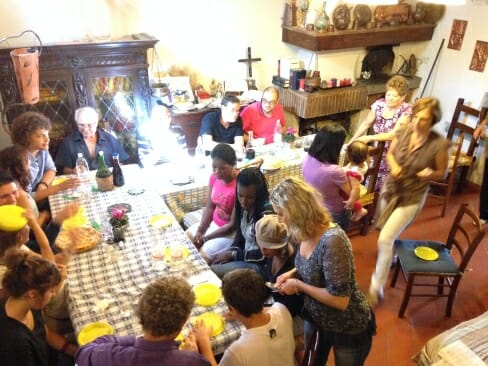
https://vimeo.com/131567545 Cesar, an 18-year old from Ghana, was saved just when he was about to drown, after he had drunk water and fuel. On that journey, 72 people were saved while 32 died. Maria, a Nigerian and seven months pregnant, had received a phone call from her father while she was out with her husband and little son. He told them not to return home because the church had been burnt and her mother killed. They escaped with the little they had, and arrived in Libya. They had money for the journey to Italy of just one person, and so only she left. Her husband and little son remained on the other side of the Mediterranean, waiting for another embarkment. «These are heartbreaking glimpses of life. They remind us of Jesus’s words: “I was a stranger and you shared your home.” We would like to be the arms and heart for each of these refugees.» This is the story of Carla and David of Florence (Italy), who as a family opened their hearts to the welcoming of migrants. «In summer 2013, we participated with our three kids in the World Youth Day in Brazil. We took the opportunity then to spend some time to do missionary work in Salvador Bahia. It was a strong experience that opened our hearts to the spirit of sharing with those in need. Once we returned home, we decided to dedicate a part of the B&B we run to migrants. In that moment the mission had come to us! Since then, 756 people have passed through, coming from Syria, Pakistan, Nepal, Bangladesh and some countries of Africa. Some stayed only to take refreshments and depart for other European destinations while others remained longer. And in these cases, our relationships became close and very fraternal. 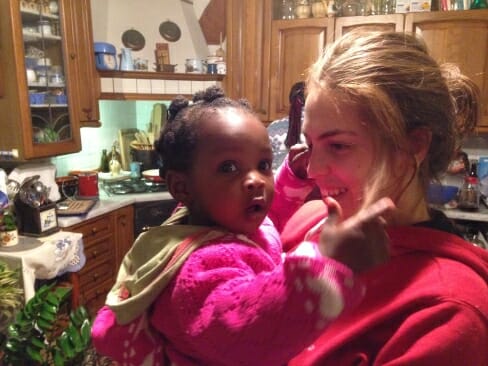 An Eritrean family now on its way to Norway, stayed for two months: he is Muslim while she is Christian, with six children who were left free by their father to choose their religion. When their mother arrived with the youngest son, they were hospitalized for dehydration, after which so also was the father, due to an infection. We remember their joy when we handed them a cell phone so that they could call their relatives to say they were all alive and well. On Sunday we all went to mass together in that tiny Church at the outskirts of Florence where Cardinal Betori was holding a pastoral visit. His whole homily centred on welcoming the homeless. In the end he embraced them and blessed everyone.
An Eritrean family now on its way to Norway, stayed for two months: he is Muslim while she is Christian, with six children who were left free by their father to choose their religion. When their mother arrived with the youngest son, they were hospitalized for dehydration, after which so also was the father, due to an infection. We remember their joy when we handed them a cell phone so that they could call their relatives to say they were all alive and well. On Sunday we all went to mass together in that tiny Church at the outskirts of Florence where Cardinal Betori was holding a pastoral visit. His whole homily centred on welcoming the homeless. In the end he embraced them and blessed everyone.  Three girls, one from Mali and another from Libya, both Muslims, came together with a young girl who escaped from Nigeria after witnessing the massacre of their parents because they were Christians. A sisterly relationship was created between them and with us, as if between parents and daughters. One Sunday while we were taking a walk, Mersi was very sad because that day on TV there was the news of another massacre in Nigeria. Finally, they received a phone call: their younger sister was able to escape to Libya with her father’s friend. The Libyan girl immediately contacted her family and the child – a Christian – was taken in by them who were Muslims. Here’s another picture: of Joy and Lorenz, who had seen their father killed because he was a Christian. I, David, as a social worker can get on the bus when refugees arrive. I do this at the risk of contracting diseases, but I know that the first approach is fundamental since it is then that we are able to identify the groups that, in the meantime, have been created among them. I saw that Joy was pregnant, and so I invited them to our centre. Also when the Prefecture moved them to another place, we continued to visit them, and when the baby was born, we brought them a pram and clothes which the New Families of the Focolare had gathered for them. Joy and Lorenz asked us to be little John’s godparents. This family was then sent to Puglia. The parting was strong but the relationship continues. The call us Mom and Dad. When they obtain their stay permit, they want to come to live close to us.»
Three girls, one from Mali and another from Libya, both Muslims, came together with a young girl who escaped from Nigeria after witnessing the massacre of their parents because they were Christians. A sisterly relationship was created between them and with us, as if between parents and daughters. One Sunday while we were taking a walk, Mersi was very sad because that day on TV there was the news of another massacre in Nigeria. Finally, they received a phone call: their younger sister was able to escape to Libya with her father’s friend. The Libyan girl immediately contacted her family and the child – a Christian – was taken in by them who were Muslims. Here’s another picture: of Joy and Lorenz, who had seen their father killed because he was a Christian. I, David, as a social worker can get on the bus when refugees arrive. I do this at the risk of contracting diseases, but I know that the first approach is fundamental since it is then that we are able to identify the groups that, in the meantime, have been created among them. I saw that Joy was pregnant, and so I invited them to our centre. Also when the Prefecture moved them to another place, we continued to visit them, and when the baby was born, we brought them a pram and clothes which the New Families of the Focolare had gathered for them. Joy and Lorenz asked us to be little John’s godparents. This family was then sent to Puglia. The parting was strong but the relationship continues. The call us Mom and Dad. When they obtain their stay permit, they want to come to live close to us.»
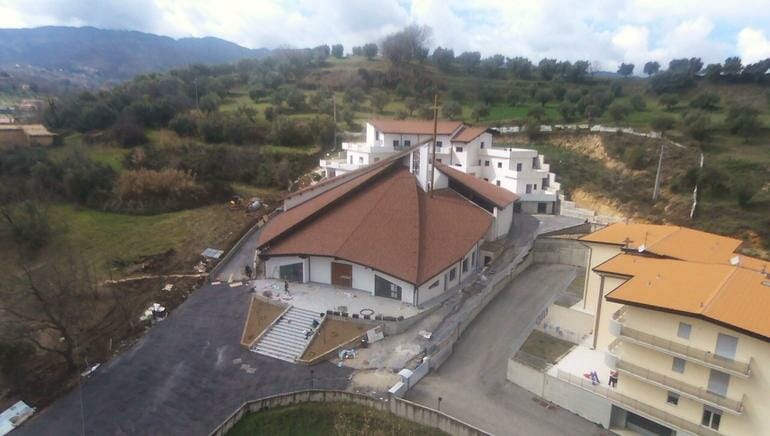
 On 20 March the new parish church, dedicated to Christ the Saviour, was inaugurated in Mendicino, in Cosenza, Italy. The event was celebrated on the anniversary of Msgr. Nunnari and it fulfilled the dream of the entire parish community, composed of 10,000 inhabitants, which now enjoys a place of worship of an extremely unique structure. It comprises about 15 rooms for catechism lessons, a meeting hall and presbytery. The project, carried out by means of technical support by local experts, was designed by The Ave Arts Centre in Loppiano, which designs are inspired by research done through the years by a team of architects who work in the little town of the Focolare.
On 20 March the new parish church, dedicated to Christ the Saviour, was inaugurated in Mendicino, in Cosenza, Italy. The event was celebrated on the anniversary of Msgr. Nunnari and it fulfilled the dream of the entire parish community, composed of 10,000 inhabitants, which now enjoys a place of worship of an extremely unique structure. It comprises about 15 rooms for catechism lessons, a meeting hall and presbytery. The project, carried out by means of technical support by local experts, was designed by The Ave Arts Centre in Loppiano, which designs are inspired by research done through the years by a team of architects who work in the little town of the Focolare.
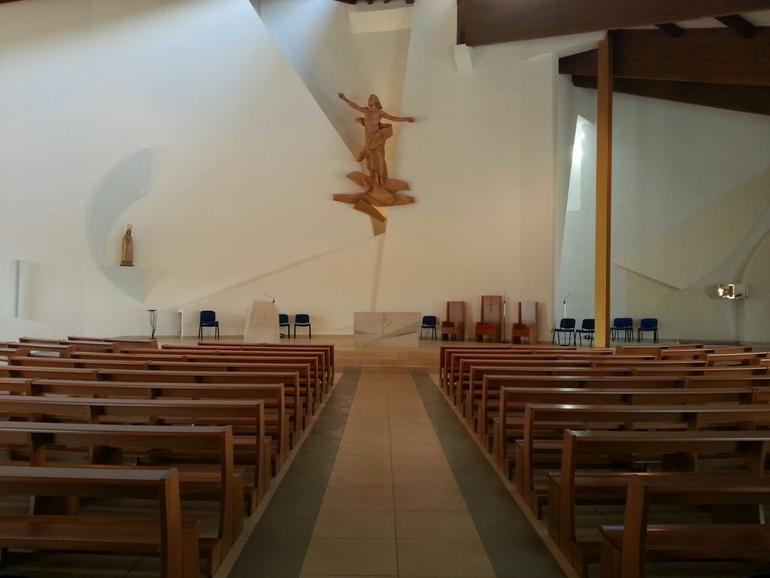 Apart from its constant internal reflection, this group aims at building a relationship of synergy also with architects in other parts of the world. Last December, for example, they participated at an international conference organised in Barcelona, Spain, by the Association of Catalonian Architects, on the theme of sacred patrimony. The team of architects took part not only as representatives of the Arts Centre in Loppiano, but also as part of the “Dialogue in Architecture” inundation of the Focolare Movement, which is composed of scholars and professionals whose main focus and interest revolves around the theme of architecture.
Apart from its constant internal reflection, this group aims at building a relationship of synergy also with architects in other parts of the world. Last December, for example, they participated at an international conference organised in Barcelona, Spain, by the Association of Catalonian Architects, on the theme of sacred patrimony. The team of architects took part not only as representatives of the Arts Centre in Loppiano, but also as part of the “Dialogue in Architecture” inundation of the Focolare Movement, which is composed of scholars and professionals whose main focus and interest revolves around the theme of architecture.
During this conference in Spain, three of the architects, Mario Mario Tancredi and Iole Parisi from Italy, and Tobias Klodwig from Germany, were asked to do a presentation entitled: “Flexible Christianity – Community Life and Sacred Spaces”. The approach that was presented greatly interested the 150 architects from Spain and other European countries who attended the conference.
The three speakers started off by explaining how forms and spaces in the field of architecture change according to the experience of different Christian communities. This generated a discussion and a reflection on the fact that architecture is always enriched by elements that are “intangible”, by what the very concept of “sacred” can assume in various cultural contexts: the strong social values perceived in Latin America; the prophetic ancestral signs found in Africa; the value of symbolic expressions contained in European cathedrals and churches in globalized metropolises. They pointed out a few concrete examples to illustrate this: the Church in Loppiano called Maria Théotokos, which is an expression of a contemporary charism, the Church of St Claire in Fontem, Africa, which communicates the values of the local culture, and some projects where disused churches in Germany had undergone a transformation.
With regards to the cultural research that “Dialogue in Architecture” aims to develop, it’s in continual evolution, driven by the need to bring together – precisely because it has to do with the Absolute One – continuity and innovation,and this is achieved by means of a dialogue which is evermore constructive both with the clientele and the academic world.
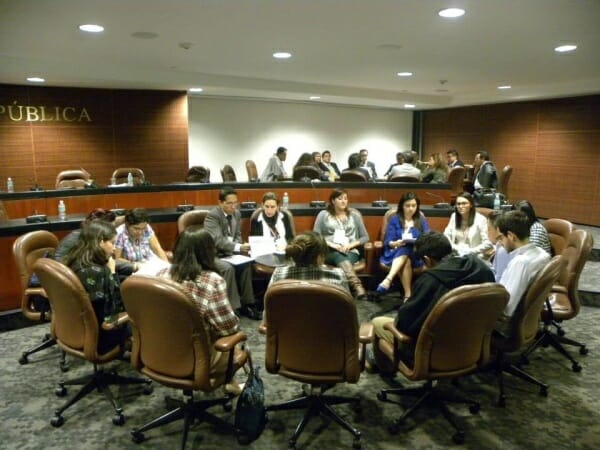
 “Hi, my name’s Abraham, and I come from Mexico: a population of noble and deeply religious people, with their arms spread out to the world.” These were his opening words to an audience of 300 young people in a hall of the Italian Parliament, who gathered to pay homage to Chiara Lubich and her prophetic vision of politics. Abraham has brought along his background in a country torn apart by narcotrafficking and the lords of death. He himself had lived the experience of having a gun pointed at his head by the police who mistook him for a drug pusher while the real one was standing beside him, forced by poverty to take that path. “In 2006,” he continued, “the battle against narcotraffic was a war that in eight years had left on the field more war victims than in Vietnam, among which were many innocent people who struggle every day to maintain their civil commitment: journalists, activists, etc. Often the people protested against the Government which has been losing its credibility amid a strong social and economic crisis”
“Hi, my name’s Abraham, and I come from Mexico: a population of noble and deeply religious people, with their arms spread out to the world.” These were his opening words to an audience of 300 young people in a hall of the Italian Parliament, who gathered to pay homage to Chiara Lubich and her prophetic vision of politics. Abraham has brought along his background in a country torn apart by narcotrafficking and the lords of death. He himself had lived the experience of having a gun pointed at his head by the police who mistook him for a drug pusher while the real one was standing beside him, forced by poverty to take that path. “In 2006,” he continued, “the battle against narcotraffic was a war that in eight years had left on the field more war victims than in Vietnam, among which were many innocent people who struggle every day to maintain their civil commitment: journalists, activists, etc. Often the people protested against the Government which has been losing its credibility amid a strong social and economic crisis”
“I live in Mexico City where every day, we are faced with a new challenge; despite this I believe in a united world and in the ideal of a united world and universal brotherhood. But I know that change has to start from myself, without expecting it from the others and not even from the authorities.”
“If I were you, who are so concerned for the common good in Mexico,” affirmed Luigino Bruni addressing the youth – I would try to look at the causes of this disease, among which is financial capitalism that increases the inequalities. These are types of wealth that are no longer inclusive.» «The first step to take when one wishes to change a country is to love it,» the economist underlined again, spurred by the testimonial of Abraham. «Every country has its vocation to beauty, its own genius, and identity, though ambivalent.» And then an advice: study more, learn a profession! «Are you a minority? It does not matter. Just a handful would suffice, few but really very motivated. It is the prophetic minority that changes the world. And do not stop believing that a different world is possible. The first battle to fight when we are young is to not lose faith in the ideal. We have to believe in the impossible in order to have a good possibility.“
“Some offered me drugs many times, others robbed me,” continued Abraham, “Some time ago while going home after school, a boy approached me asking for a cigarette. At the same time the police arrived to arrest us. He had drugs in his pocket while I only had books in my backpack. They started to beat him up while the other policeman held a gun at my head, asking me where the drugs were. When the police left, I helped this boy to his feet and gave him the little money I had. He embraced me and said: “You know, I feed my family with these few coins?” I realised how a small act of love really releases great strength and we never know how far it will go. Despite my feeling so helpless, I want to try and see my neighbours and the people I meet on the street with new eyes, and with other friends I want to give a concrete contribution.
“In my desire to a greater commitment for the good of my country, despite the many difficulties and discouragement of many, on 20 March the youth of diverse organisations met in the Mexican Senate for a day’s event with politicians on dialogue, which is very important in a world that is awaiting the answers to bigger challenges.”
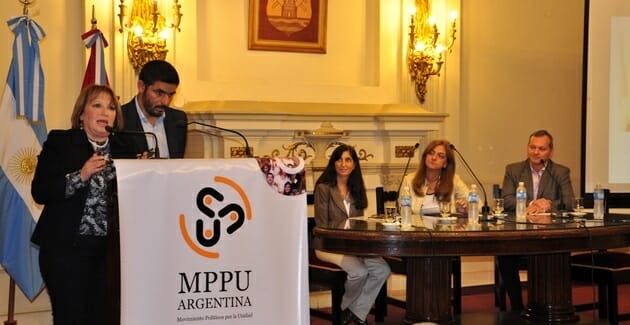
 “Chiara Lubich has brought understanding and gentleness, but basically what she has given to us, through her simplicity, is a great current of love towards the other person. To live in community, to know how to share, to work for the common good and to succeed in building fraternity also through diverse political viewpoints, this in summary is her message.” So stated Alicia Monic Pregno, Vice-Governor for the Province of Cordoba (Argentina), in the context of this international acknowledgement of the inheritance transmitted through the thought and life of Chiara Lubich. During its session on 25 March 2015, the House of Representatives in the Province, approved the posthumous decree in recognition of the Work of Focolare Movement founder.
“Chiara Lubich has brought understanding and gentleness, but basically what she has given to us, through her simplicity, is a great current of love towards the other person. To live in community, to know how to share, to work for the common good and to succeed in building fraternity also through diverse political viewpoints, this in summary is her message.” So stated Alicia Monic Pregno, Vice-Governor for the Province of Cordoba (Argentina), in the context of this international acknowledgement of the inheritance transmitted through the thought and life of Chiara Lubich. During its session on 25 March 2015, the House of Representatives in the Province, approved the posthumous decree in recognition of the Work of Focolare Movement founder.
The ceremony was held in the same parliamentary hall in the presence of a huge crowd which included members of parliament of different political parties, representatives of Comipaz (Interreligious Committee for Peace), young political students of the Movement of Politics & Policies for Unity, university professors, members of social organisation, and others.
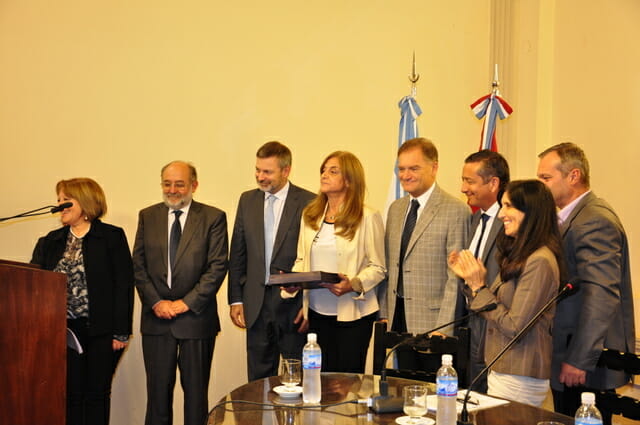 The delegates of the Focolare Movement in Cordoba presented the figure of Chiara Lubich and immediately afterwards the Vice-Governor invited politicians from different political parties to carry out the symbolic gesture of consigning to them, all together, the decree and the commemorative plaque.
The delegates of the Focolare Movement in Cordoba presented the figure of Chiara Lubich and immediately afterwards the Vice-Governor invited politicians from different political parties to carry out the symbolic gesture of consigning to them, all together, the decree and the commemorative plaque.
Alicia Monica Pregno then went on to explain the motivations for the award: the contribution towards the building up of a community which promotes the “spirituality of unity”, adding that “Lubich’s message raises many questions which lead us to reflect on the reason behind all the conflicts, on why we are not always able to think things out together.” She said, “I believe that the world is called to journey towards a better destiny, and this is achievable in the measure that we lay aside our personal interests and are open to resolve issues through a shared outlook. This is a great challenge in these times characterised by much individualism.”
Pastor Raffa, representing Comipaz, then spoke. He emphasised the contribution of the charism of Chiara Lubich to the “birth of this commission right from the beginning”; and Soher El Sucaría, political activist, shared how through an experience lived within the Interreligious Committee for Peace, the value of this service became more and more evident.
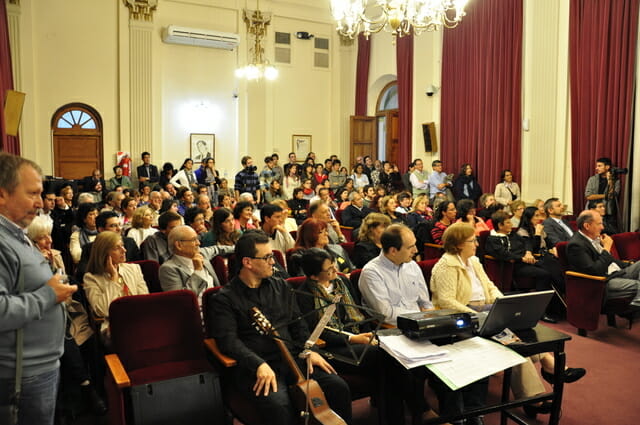 Several testimonies by individual citizens then followed. They told stories of personal transformation and their commitment to local politics: from joining forces with neighbours in order to resolve the problems of their neighbourhoods, to assuming political commitment on a regional and national level. This part of the program was conducted through two round tables. The first, entitled “Fraternity, Seed of Social Transformation”, included the participation of Estela Daima (Director of a Caritas Department in Rio III which conducts a break-making activity involving 40 women), Paola Chávez, Secretary of Fazenda de la Esperanza association (who presented the testimony of Agustina, a reformed juvenile criminal), and Ricardo Galli, economist and entrepreneur of an Economy of Communion project.
Several testimonies by individual citizens then followed. They told stories of personal transformation and their commitment to local politics: from joining forces with neighbours in order to resolve the problems of their neighbourhoods, to assuming political commitment on a regional and national level. This part of the program was conducted through two round tables. The first, entitled “Fraternity, Seed of Social Transformation”, included the participation of Estela Daima (Director of a Caritas Department in Rio III which conducts a break-making activity involving 40 women), Paola Chávez, Secretary of Fazenda de la Esperanza association (who presented the testimony of Agustina, a reformed juvenile criminal), and Ricardo Galli, economist and entrepreneur of an Economy of Communion project.
In the round table entitled “The Contribution of Fraternity to Politics: Experiences and Challenges”, Laura Blanco, a socialist, presented the Schools of Politics organised in Parliament House, as well as her commitment to live fraternity in the political arena. Other speakers included Julio Bañuelos, Mayor of Mina Clavero, and Guillermo Castillo, member of the Christian Democratic Party and public administrator.
In all those present there was the certainty that when fraternity is lived as a political goal, it provides answers to the challenges of today which call for a society that is more just and all-embracing.
In conclusion, the Vice-Governor expressed her appreciation that the Parliament of Cordoba is the centre for the Schools of Politics for young people and underlined the efforts which are being made in living the concept of fraternity within Parliament itself.

“Our eldest 17 year-old son didn’t come back home one night. What were we to think? He had never caused us worry before. All we could do was pray. The next morning, through the parents of two of his friends, we found out that the three of them had gone to Florence. Somebody wanted to call the police, another insisted he would have nothing more to do with his son. My wife and I, instead, tried to remain calm; we had put everything in God’s hands. Every so often, we would receive some news of them.
While it was a big suffering, we felt very united as a family. There was one thing we all agreed on: we would have welcomed him back with joy, just like in the parable of the prodigal son, without laying on the guilt for his childish behaviour. A week later, the three of them came back home. Our son, having felt our love, was truly sorry for what he had done and assured us he would never do anything like that again. When he found out that his mates had been treated somewhat differently, he was all the more grateful for having a family where everyone tries to live the Gospel.” F.A. – Rome
A Shared Suffering
“The father and sister of my daughter’s friend died in an accident. I had lost my father in similar circumstances. Even though I only knew her mother by sight, when I heard what had happened, I felt compelled to visit her. But I didn’t want it to be just a simple visit. Knowing that she was in financial difficulties, I took her various food items and I tried to console her. I visited her quite often. I even gave her some money I had set aside for us. As time went by, she felt much stronger, more reassured and grateful for the friendship which had blossomed among us, thanks to the suffering that we shared.” B.G. – Bolivia
The beanie
“It was winter time and my friends and I were playing in the school yard. It was very cold. At one stage, a little girl started crying. Her woollen hat didn’t quite cover her ears and they were so cold they hurt her. I wanted to love Jesus in her so I gave her my own beanie which kept her warm.” J. – Belgium
Morning tea
“I was having a snack in the playground. I saw a friend of mine pull another girl’s hair. I left my snack on the wall and I went up to her to say not to do that because Jesus said that we had to love all the time. But then, since both of them started crying, I went to get my snack and I shared it with both of them. It’s true that I was quite hungry, but I was happy because I was able to love.” Valentina – Italia.
Source: “The Daily Gospel” April 2015, Città Nuova publishing house
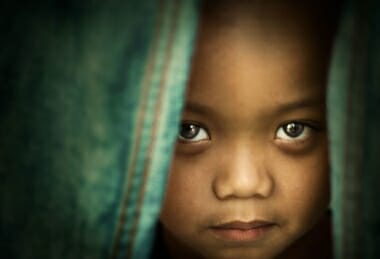
“I wish that we could all have Easter eyes
Capable of looking
into death, until we see life
into the hurts, until we see forgiveness,
into separation, until we see unity,
into the wounds, until we see glory,
into the human person, until we see God,
into God, until we see the human person,
into Myself until I see You.
And in addition to this, to see the power of Easter!”
(Easter 1993)
Klaus Hemmerle, “La luce dentro le cose”, Città Nuova, Rome 1998, p. 110.

 “Oh, there’s a light with nails on it!
“Oh, there’s a light with nails on it!
So exclaims a child in front of the Paschal candle.
We can feel the nails.
But can we see the Light?
And what about us … do we give out light?
We are nailed
to ourselves and to others;
to our time and our responsibilities.
The Holy One has allowed himself to be nailed to our cross.
And it was from there that he come down.
He was nailed right up until he died.
In this way he became light for everyone;
that light which penetrates closed doors.
He is risen
and shows the signs of the nails.
Light which was nailed.
We feel the nails.
But can we see the Light? And what about us … do we give light?
(From a pastoral letter on the occasion of Easter 1984)
Klaus Hemmerle, “La luce dentro le cose”, Città Nuova, Rome 1998, p. 109.